
















FOCUS ON
Eltham College

DELIVERING AN EDUCATION FOR LIVING LIFE





































WHY A BROAD HUMANITIES AND ARTS EDUCATION DELIVERS TOMORROW’S SKILLS
PLUS






NATURE BOOST How learning outdoors brings health, happiness and academic results
CATHEDRAL SCHOOLS’ GUIDE Where inspiration and exceptional teaching combine





Every Heathfield girl has an irrepressible spirit. Uniquely hers, it drives her passion, voice and character. As well as providing an excellent academic education and top-class pastoral care, Heathfield identifies your daughter’s distinctive strengths and encourages her to live her ambitions, embrace her spirit and talent so that she develops as the best possible version of herself. Live life like a Heathfield girl.
Saturday


Every child’s story begins with
SCAN
SCAN
Visit Habs Boys and Habs Girls for the space to make a difference.
MAKE A PROFOUND IMPACT
FOR HABS BOYS’ SCHOOL FOR HABS GIRLS’ SCHOOLa blank page.

Known as Grange Academy, Kilmarnock's resident 'maths geek', Chris Smith MBE studied for a Maths PhD and taught at undergraduate level before joining Grange Academy in 2010. In this issue he talks about his book That's Mathematics and his work to inspire children to recognise this universal language's creative potential.

Melanie Horn spent her secondary years at RMS and, a er studying at University of Wales and teaching across both state and independent sectors, she re-joined her alma mater as Head of Prep. In this issue she talks about the rich sensory experiences outdoor learning delivers that simply can't be replicated in classrooms.

A er studying philosophy, Alex Foreman "fell into teaching", beginning his career at Uppingham in Rutland and then moving on to a large inner-city comprehensive in Leicester. Before taking up his role as DOYRMs, he led an MOD school in Germany. In this issue, he highlights the ways in which great pastoral care supports fulfilling boarding experiences.
…that she left it too late to apply for Hurtwood House, because it’s simply the best for acting, dancing, singing, film-making – “A utopia for creative minds” –as the Good Schools Guide says.
And crucially, this exciting school is equally successful academically. In fact, it’s statistically one of the top co-ed boarding schools in the UK.
So, if you’re looking for a really exciting and rewarding change of school at 16 – don’t leave it too late.
Contact Cosmo Jackson or visit our website for more information.

T: 01483 279000 E: info@hurtwood.net
hurtwoodhouse.com

•

Global Director, MPW Group
James Barton studied Archaeology and Ancient History at Warwick, followed by an MA in Performance Philosophy. Working in education for over 15 years, he has authored Trotman Getting Into... guides, as well as giving talks to, among others, TEDx and How To Academy. In this issue, he talks about the benefits for young people of joining a sixth form college.

Head, Streatham & Clapham High School GDST
Cathy Ellott joined Streatham & Clapham High School as Head last September. Her previous roles include Pastoral Director of Sixth Form at Headington School for Girls, Oxford and, most recently, Senior Deputy Head at St Mary's Ascot. In this issue, she discusses her 'Action Plan' for helping students make the leap into university life with success.

Author, poet and musician
Julian Gough was singer and lyricist for the Galway band Toasted Heretic. His first novel was published in 1991 and he has written poetry, stories and opinion articles ever since. He is known to children for his touching Rabbit and Bear series. In this issue he talks frankly about good and bad school days in London and Ireland.

BOARDING AND DAY CO-EDUCATION FOR PUPILS AGED FROM 7-18.
INSPIRING ACADEMICS SUPPORTED BY A FULL PROGRAMME OF CREATIVE AND PERFORMING ARTS, SPORTS AND ACTIVITIES.


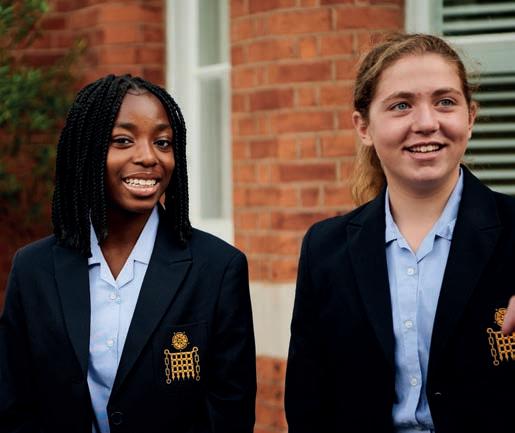

At this point in the year, life traditionally moves outdoors and – regardless of the tensions around exams, changing schools, and the rest – there’s a feeling of freedom to stretch our wings. Our cover and Focus feature is about the co-curricular and pastoral approach at Eltham College (page 26), which believes in an ‘education for living life’. And that seems to sum up the theme of this whole issue.
Schools are critical to developing ‘have a go’ spirit, and in Nature Boost (from page 44) we talk to three schools that like to nurture that spirit outdoors. This is not just a fair-weather thing, as children explore through the seasons and in all conditions. In Humanities in Focus (page
spotting circles) theatre productions. Anyone who foolishly imagines putting on a show here means a dab of greasepaint and a few costume changes needs to read on (from 38). Apart from the scale and the sheer professionalism, there’s the extraordinary commitment. As Head of Performing Arts Doug Quinn reminds us, the collaboration and teamworking skills acquired are a preparation for successful adult life, not just creative careers. Similarly, in Passion for Fashion (page 114) we go behind the scenes at Heathfield to find out about the impressive investment it makes in delivering superb fashion, art and design education – and its wonderful runway shows. These shows, just like Hurtwood theatre productions, are talent-spotting heaven, so if you’re ever o ered a ticket, snap it up.
We head to Glenalmond (page 90) to find out more about its redesigned outdoor learning
“SURELY, THE ULTIMATE VALUE OF BOTH NATURE EXPOSURE AND CREATIVE PURSUITS, IS THE OPPORTUNITY TO EXPLORE NEW TERRITORY AND HAVE FUN ON THAT JOURNEY”
68) we consider why an arts- and humanitiesrich education is so important. School leaders already know the value these subjects bring in broadening minds and giving children a sense of their place in the bigger picture. Also, and never to be underestimated, they are building precisely the skills needed for an AI-enabled and technology-driven future. As John Doy, Head of Sixth Form at Mayfield, puts it: “Arts and humanities are an expression of a set of skills that can be adapted to a career that might not even have been invented yet”.
It was a delight to talk to Hurtwood House about its famous (in Dorking and London talent
programme. Students here are given a glorious set of opportunities to build skills they can carry way beyond school – from Munro bagging to conservation. Head of Outdoor Learning Tom Mason says they never want the children to feel this is about being challenged – they simply want them to have fun. I love that idea for its purity. For surely, the ultimate value of both nature exposure and creative pursuits is that young people have the opportunity to explore new territory and have fun on that journey.
Libby Norman EDITORupfront
16 SCHOOL NEWS
What’s going on in the world of education
23 WRITERS' ROOM
Two competitions for literary talents
FOCUS
26 EDUCATION FOR LIFE
Eltham College is focused on delivering an all-round education for modern life
38 IT'S SHOW TIME!
We go behind the scenes at Hurtwood to discover more about its spectacular theatre productions
PREP
44 NATURE BOOST
Three schools describe how they take learning outdoors for academic and wellbeing benefits
54 SPANISH CLASS
The Roche School's innovative bilingual stream
62 PARENTS' GUIDE TO CATHEDRAL SCHOOLS
Inspiration and academic excellence combine in these unique independents
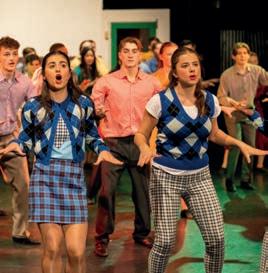
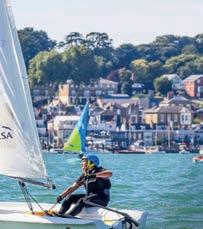

senior
68 HUMANITIES IN FOCUS
Why an arts- and humanities-rich education delivers essential skills for tomorrow's world
75 GIRLS FIRST
Marymount International on the advantages of a girls-only education
77 BOARDING EXPERIENCE
TASIS England on why great live-in experiences last a lifetime
80 WHY STUDY CLASSICS?
Tonbridge and MVS share their elevator pitches
98 ASK THE EXPERTS
Guidance on school fees, starting nursery right and good revision techniques
Sixth form
104 ART OPENING
Creative foundations at Kings School of Art + Design
114 PASSION FOR FASHION
Heathfield School's amazing investment in fashion, textiles and art training pays o
122 OCEAN PASSPORT
UKSA training can take you all the way round the world

















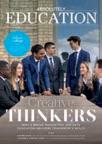







AN INDEPENDENT BOARDING AND DAY SCHOOL FOR GIRLS
AGED 11 TO 18, SET IN THE BEAUTIFUL SUSSEX COUNTRYSIDE JUST AN HOUR FROM LONDON

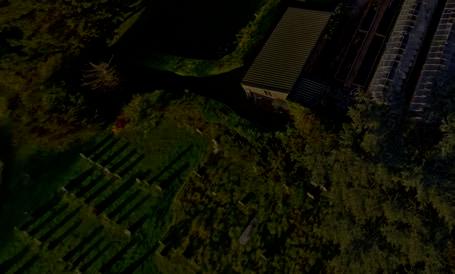
OUTSTANDING ACADEMIC RESULTS • SCHOLARSHIPS AVAILABLE EXTENSIVE CO-CURRICULAR PROGRAMME
EXEMPLARY PASTORAL CARE & NURTURING ENVIRONMENT
STATE OF THE ART EQUESTRIAN CENTRE FLEXI, WEEKLY AND FULL BOARDING OPTIONS
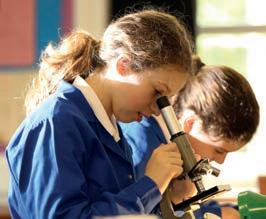



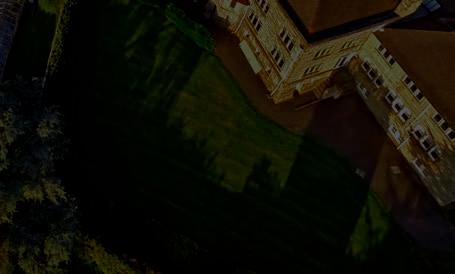


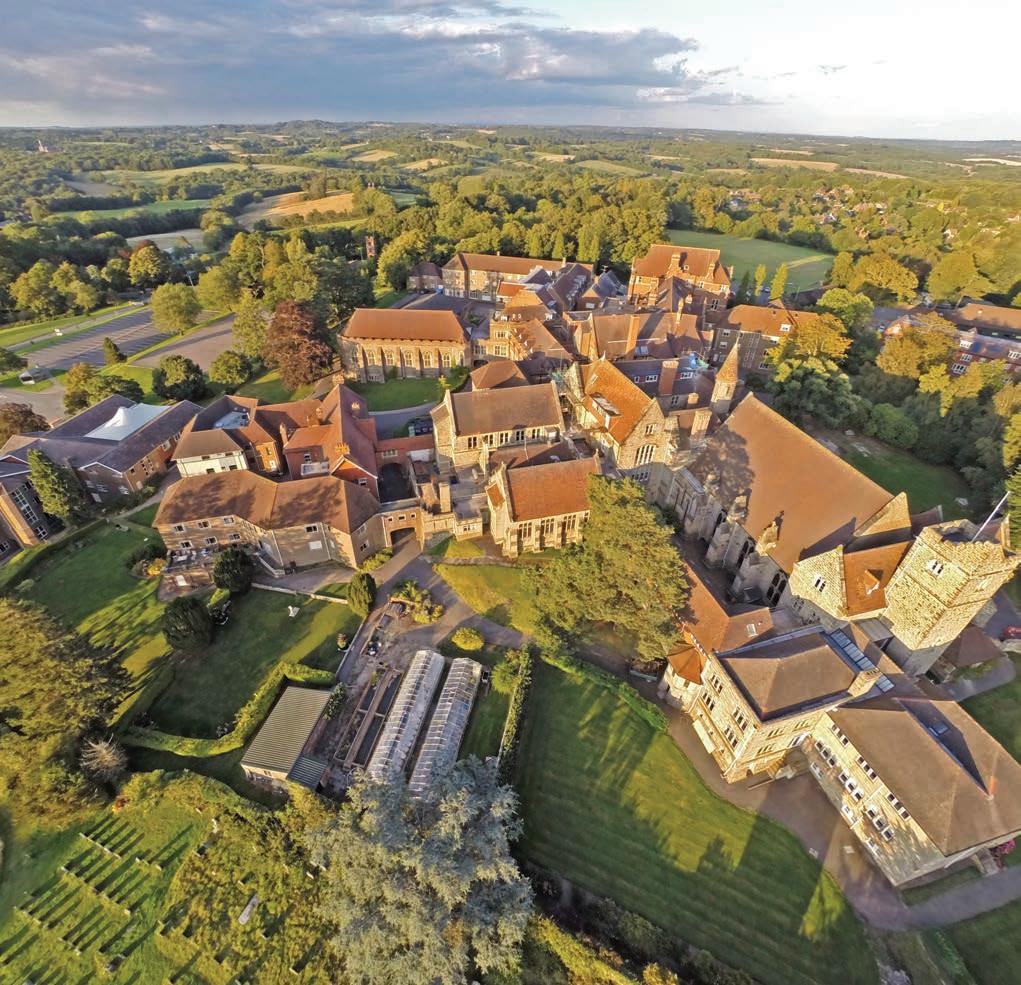

DAY 2 A 202
DAY 202
TO ARRANGE A VISIT PLEASE CON TACT MRS SHIRLEY COPPARD, REGISTRAR@M AYFIELDGIRLS.ORG

Two IB Diploma students at St Clare’s, Oxford hosted a TEDx evening of talks on ‘internationalism’. Sheeta Ho and Anissa Ziane selected eight speakers from the student and staff body to talk about topics ranging from humanitarian aid to how to study in a second language. The videos are on the ‘TEDx Talks’ YouTube channel.

“St Clare’s, Oxford students chose the broad theme of ‘internationalism’ for an evening of TEDx talks”
Feltonfl eet’s youngest pupils are developing their problem-solving abilities in the Woodwork Hut. The Cobham, Surrey prep is promoting handson experiential learning by offering space, tools and time to explore and cra wooden designs. The team add that this activity builds hand-eye coordination, alongside critical thinking and creativity.


Tonbridge proved its popularity in the latest Sunday Times Parent Power schools guide, being ranked as the sixth best independent school nationally, and the highest placed boarding school in the country. In the south-east rankings, Tonbridge was placed second overall and named as the highest ranked boys’ school.
Bedford Greenacre Independent School is taking shape on a new 40-acre site in the county town’s Manton Heights area. Created a er a merger of Rushmoor and St Andrew’s, it is set to welcome 690 pupils, from reception to sixth form, in the autumn term. “The project is developing at pace,” says Headteacher Ian Daniel.















Suffolk prep Old Buckenham Hall has been named LTA School of the Year for Suffolk. Based near Lavenham, OBH’s tennis programme is led by Matthew Perry and a team of coaches. Sport has undergone signifi cant development recently, overseen by new Director of Sport Kingsley Went. Recent OBH county awards include hockey and IAPS swimming.
“Whether you’re a writer, or a painter, or a designer, you should be pushing yourself to achieve more than you think is possible”
SANDY POWELL


Department for Education fi gures show some 97,000 children were educated at home in summer term 2023, an 11,000 rise on the previous term and close to double the number pre-Covid. A report from The Guardian in late January suggests ‘lifestyle’ or ‘philosophical’ reasons have infl uenced almost a quarter of parents making this choice.


Deborah Bligh becomes Headmistress of Mayfi eld from April. She joined as Senior Deputy Head a er lead roles at St Richard’s Catholic College. “I would like to pay tribute to the incredible legacy of Antonia Beary,” she says. “Since joining in September, I have felt very much at home.”

Cheltenham College International will have a partner school in Kuala Lumpur, Malaysia. The College’s third international sister, the co-ed day school for pupils aged 4-18 opens in September and will deliver qualifications based on IGCSE and A level.
The school is owned by the Malaysian company Edumaax –founded by an Old Cheltonian.





St Dunstan’s College and Chelsea FC Foundation have forged a partnership to increase sports access across south-east London. A full-time Foundation officer based at the school will work with the St Dunstan’s team. There will be weekly coaching for pupils and opportunities to visit Chelsea FC’s Cobham training ground.









Ben McCarey will be Head of Frensham Heights from September 2024. He joins from Holyport College, which he’s led for seven years. “It is an absolute honour to be given the opportunity to lead Frensham into its centenary year,” he says. Former Head Andrew Fisher returned this academic year to lead this planned transition.
“Seeing is not believing. Sometimes... you have to feel, touch, experience... and use your intelligence” school Dunstan’s feel,



BENJAMIN ZEPHANIAH
“THOSE WHO CONTEMPLATE THE BEAUTY OF THE EARTH FIND RESERVES OF STRENGTH THAT WILL ENDURE AS LONG AS LIFE LASTS”
RACHEL CARSON



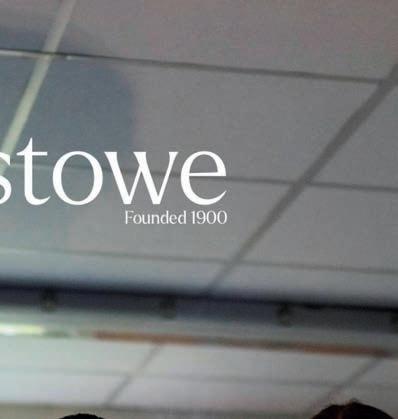




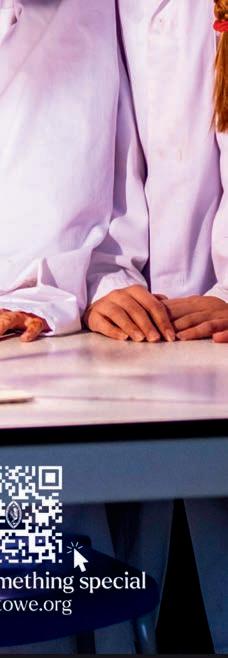
Heathfield School in Ascot has welcomed Lou Scott as Deputy Head Pastoral and Boarding. Beginning her career at Royal School of Haslemere, she has worked as a teacher, sports coach and deputy principal. She plans to build upon the success of initiatives such as Heathfield’s Flourishing and Positive Psychology programmes.
Actor Martin Clunes will be the inaugural Chancellor of Hartpury University and Hartpury College. The Gloucestershire centre offers specialist sixth form and HE qualifications in agriculture, equine and veterinary fields. Clunes and his family run a 130-acre mixed farm and he has a longstanding association with the land and related charities and organisations.

Sixty years of tradition were upended at Kent school Cobham Hall when, by secret ballot, the student body voted its first boy onto the six-strong Student Leadership Team. Launched in 1962 as a school for girls, Cobham Hall moved to a co-ed Sixth Form in 2023 and now has a vibrant cohort of day boys and boarders.


Alexandra Haydon took up the post of Head of Francis Holland School, Sloane Square in January 2024. Formerly Deputy Head, Academic at Millfield, her career includes time at St Mary’s Calne, Wiltshire, as Head of Science and latterly Senior Teacher. In 2019, she won the i25 award for innovation and influence in the independent sector.
Hanford pupils approached their half-term ‘Extreme Reading Challenge’ with gusto. They were encouraged to have a photo taken of them reading in an unusual place for World Book Day. Photos included girls reading up trees and lampposts, on a donkey, upside down on a dentist’s chair and curled up in a haystack.
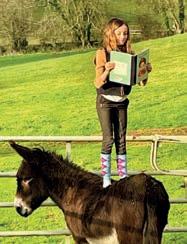

The Leys, Cambridge pupil Cameron M earned a place on the Royal Navy-sponsored Cadet Naval Wings Programme. He completed the Ground School course at RNAS Culdrose to get his Bronze Wings – Silver and Gold courses follow. He says: “I am so excited to gain knowledge from Royal Navy instructors and can’t wait to fly a plane!”
“Hanford’s fun photos included children reading up trees and on the back of a donkey”
Cheam School in Berkshire celebrated La Journée Française with an assembly where pupils learnt about French culture. This was followed by themed activities and a workshop from the Big Wheel Theatre Company, with opportunities to practise French and build Eiffel Towers. The day
ended with boules and a game of







“There’s something about getting under the skin of a character – allowing you an abandon or a sense of courage that you would never have in your own life”
CILLIAN MURPHY
Highgate School alumnus John Rutter returned to judge Young Musician of the Year competition, also presenting its Young Singer of the Year Award, named in his honour. At Highgate, Rutter immersed himself in school choral life, which included participating in the original 1963 recording of Britten’s War Requiem. Sir John Tavener was among his school contemporaries.
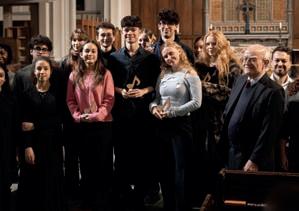
Queen Ethelburga’s Collegiate has announced Haydn Payne, 18, as its new driver for the CityCar Cup Student Motorsport Challenge 2024. Helen Snuggs, QE Motorsport Team Leader says: “He proved his dedication and success on track last year and we feel that the students will learn a great deal from his feedback and thirst to succeed.”
Hollywood’s Jack Black fronts the new TOTS (Turn On The Subtitles) campaign to get parents to turn on subtitles and improve children’s literacy. TOTS was founded by UK parents Nina Hale, Henry Warren and Oli Barrett and is now a worldwide movement, supported by Access Education, Sky Q’s Literacy Zone and Moonbug.


Rachel Bailey will be the next Head of Benenden, taking up the role in September 2024. She is currently Head of Senior School at RMS for Girls, having previously been its Senior Deputy Academic. Prior to that she was Assistant Head Teacher Academic and Head of Sixth Form at John Hampden Grammar School, High Wycombe.
Stephen Perse student
Sophie R, 16, became national junior champion at the Archery GB National Indoor Championships at Stoneleigh Park. She was top-seeded and flew through knock out matches in the junior women’s event, winning not just the U18 age group, but the overall junior title, which included all U21 archers.

As part of the preparation for the name change from Eaton Square Senior to London Park School Mayfair in September, students modelled their new uniforms in Green Park. London Park Schools is a new group of co-ed secondary schools led by Principal Suzie Longstaff and Heads Adrian Rainbow (LPS Mayfair) and Susan Brooks (LPS Clapham).

UK and Ireland schools are invited to apply to Westland Horticulture’s New Horizon Fund for community garden projects. Settings such as care homes, hospices and allotments can also apply. Each prize comprises kit to the value of £1,000.
Draws take place in June and September – nominate your garden project at gardenhealth. com/new-horizon-fund

“SEEING OURSELVES AS THE KINGS OF INFAMY IS STILL A WAY OF STAYING ON THE CREST OF HISTORY”
PASCAL BRUCKNER
























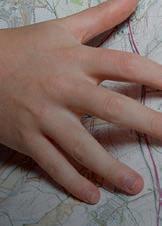
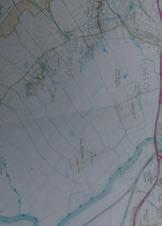





Two competitions taking place this spring give budding young writers, poets and lyricists an opportunity to make their literary mark
Young creatives are being o ered the opportunity to have their talents celebrated in two writing competitions taking place this spring. This is a good opportunity for individuals or class groups to have some creative fun while writing to a tight brief. Both competitions are open now, with closing dates in May. Do read the competition terms and conditions carefully, especially the rules about who can submit entries.
The Henrietta Branford Writing Competition is aimed at all young people who enjoy writing and is run in conjunction with the Branford Boase Award. Anyone under the age of 19 can enter – and this year the challenge is to write a story, poem or song lyrics.
The starting point is Christine Pillainayagam’s book, Ellie Pillai is Brown,
and this line in particular: ‘I think you have presence, something special about you. Something di erent’. Entrants are asked to write about a character who has ‘presence’ or something that makes them stand out.
The tip to entrants from this year’s Award Chair Prue Goodwin is to: “remember that this writing is not a piece of schoolwork, it won’t be marked by the judges, just read to be enjoyed... Try to make the final version as original as possible”.
Six winners will receive signed copies of each of the books shortlisted for the 2023 Branford Boase Award and – best of all – winning stories, poems or song lyrics will be published on the Award website. Now in its 25th year, this competition is supported by independent children’s publisher Walker Books and delivered by the Authors’ Licensing and Collecting Society.
* The closing date is Friday 31st May. See more about the competition at branfordboaseaward.org.uk
Agatha Christie’s great-grandson James Prichard and author Kate Mosse are among the judges of a competition celebrating the 2,000th performance of Witness for the Prosecution at London County Hall. Now in its seventh year, this classic courtroom drama centres on the trial of Leonard Vole, accused of a dastardly crime for financial gain.
Budding crime writers and whodunnit lovers in Years 7-9 are being invited to write a short thriller of up to 2,000 words – a testing literary challenge requiring fast-paced plot and character development. Entries must be original work, with new characters and plot (so not based on any existing drama/novel or characters by Agatha Christie or any other author).
The winner of the prize receives tickets for their class (up to 35 people) to watch a performance of Witness for the Prosecution at County Hall to find out ‘whodunnit’ for themeselves.
* The closing date is Friday 3rd May. To see full entry criteria, visit witnesscountyhall.com/terms-andconditions-2000th-performance



Wolfthorn Knight Tuition offers the core subjects Maths, Science and English for all iGCSE, GCSE, AS and A-level.
GCSE and A-Level Further Mathematics, Ad Mathematics and Statistics

UPLIFTING EXPERIENCES
Life and learning at Eltham College Page 26
In a world of many challenges, Eltham College focuses on educating young people for life today and tomorrow, says Deputy Head Pastoral Ann Massey
Eltham College has delivered excellent education since its foundation over 180 years ago, but today our thriving co-ed school for students aged 7 to 18 focuses on delivering teaching and learning to prepare young people for a fast-changing world.
Academically selective and delivering results that make us a leading academic school nationally, we are known for breadth of opportunities in sport, music, drama and art. Student and parent perspectives are vital, so we are delighted to be named a Top 20 London day school in the Sunday Times Parent Power Good Schools Survey, and also Independent Secondary School of the Year 2024 London.
Our aim is to foster a relaxed and unpretentious atmosphere to make this a welcoming place where people can develop their interests, skills and passions. Our beautiful campus, set in some 70 acres in south-east London, is embedded within the broad and diverse community it serves.
This means an inclusive educational experience, multiple partnerships to enrich school and community, and an environment balancing stimulating academic and co-curricular provision with strong pastoral support. We call our approach ‘Education for Living Life’.
We were established just over 180 years ago in 1842, and the College has retained a distinct

character borne out of its Christian roots. Pastoral and wellbeing programmes are multifaceted, with student wellbeing at the heart of our ethos. Our Wellbeing curriculum is taught through the ‘5Rs Framework’: Respect, Relationships, Responsibility, Resilience and Readiness. Delivered weekly, it is tailored to each age group from Years 7 to 13 and overseen by our Head of Wellbeing. Our multi-award-winning initiative, the ‘Every Name Matters’ project, centres on the importance of respecting individual identities and cultural backgrounds by ensuring accurate pronunciation of students’ names. A dedicated group of teachers and support sta has compiled a comprehensive database of names and phonetic spellings, integrating it into the College’s management information
system. Students also have the opportunity to record their names, giving teachers a resource to familiarise themselves with accurate pronunciations. The initiative has had a profound impact on sta -student relationships, helping to build stronger connections. This simple but vital act of calling people by the right name creates an environment where every student feels seen, respected and valued.
Other significant pastoral initiatives have included ‘Life Story’, designed to address concerns raised by the ‘Everyone’s Invited’ campaign. Our programme takes a holistic approach in specific classes, equipping students with the skills they need to develop healthy relationships and to navigate life. Extensive research and student input contributed to the development of ageappropriate educational ‘games’ that help to embed respect, empathy, and resilience.
There are multiple student-led a nity groups plus school-wide activities for events such as Black History Month. As part of our commitment to the wider community, we are working to diversify teaching with a Teaching Insight Programme that provides opportunities for aspiring teachers from under-represented backgrounds. Many students are involved in local volunteering and the school has rich and mutually rewarding partnerships with schools and community groups in a network that spans an area stretching from Docklands, across south-east London and down into Kent.
While Eltham College remains true to its roots – and was proud to celebrate the 180th


ABOVE
The College is co-ed, and with a strong academic reputation
BELOW There are superb sports opportunities at every level
anniversary of its foundation by Christian missionaries – today we welcome students of all faiths and none. This year, with the Olympic Games taking place in Paris, we are taking the opportunity to remember the example set by one of our most famous alumni, Eric Liddell. Part of his life story was told in the Oscar-winning film Chariots of Fire, which centred on his sporting prowess. A devoutly
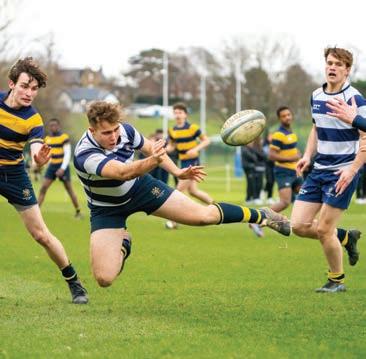
“Students are involved in local volunteering and the school has rich and mutually rewarding partnerships with schools and community groups”
religious man, he honed his sporting skills on the playing fields of Eltham. At the 1924 Olympic Games in Paris, he won a gold medal in the 400 metres but refused to compete in the 100 metres finals because it took place on a Sunday. He also competed for Scotland in rugby and is recognised in the Scottish RFU’s ‘Hall of Fame’. He had incredible sporting prowess, but Liddell had a deeper calling to serve. He travelled to China as a missionary in the 1920s and died, tragically young, in a Japanese civilian internment camp in 1945. We are honouring his life this year with a series of events, including a concert at the
Royal Albert Hall and another at the school, a sports tour to Edinburgh and St Andrew’s schools, and a charity run of nearly 700 miles from Paris to Edinburgh – via Eltham College. Eric Liddell’s memory lives on here at the College. We remember him daily in the name of our well-used sports centre, but we also believe he is an embodiment of our Eltham College Aims, most notably as a school that ‘enables students to consider Christian beliefs and values, whilst warmly including those of other faiths and none, so that all might live a life for the benefit of others’.
eltham-college.org.uk










Moving from the state to independent sector is not just a change in educational institutions, it’s a transformative journey that reshapes perspectives. As someone who recently navigated this transition, and now contributes to the academic leadership of Kew House School, it is something I’ve experienced for myself. This has led me to reflect on the profound opportunities presented, not just for me but for all the students who embark on their educational journey here at Kew House.
Many of us recognise and have experienced, a siloed approach in education settings –where the focus on examinations becomes relentless. We also know that making space for a more interconnected and less prescriptive approach pays dividends. Here at Kew House, the recently introduced Gardener Award is already doing just that. It is more than a framework, encapsulating a commitment to wider and deeper learning. Here, subjects are not isolated entities, but threads woven
into a rich tapestry of knowledge, skills and experiences. Our students encounter themes such as enterprise, perspectives, wellbeing, community, and creativity across disciplines. It is a philosophy that emerged within the Gardener Schools Group from the recognition that true education needs to provide students with a preparation for the complexities – and opportunities – of life.
In many educational settings creative subjects get sidelined. Again, a di erent perspective exists, and here I have seen firsthand the transformative power of embracing arts, music, drama and design as integral components of the curriculum. This is not at the expense of STEM subjects (and I speak as a maths teacher by training). Our students experience a balanced education that values the sciences and humanities in equal measure and seeks to furnish them with a diverse skillset. Education is not just about exam results –even though we know their importance – but is a complex process of guiding students through growing up and navigating some of their most challenging years. This
“Our students experience a balanced education that values the sciences and humanities in equal measure”
recognition is embedded in our ethos, with individualised attention delivered pastorally as well as academically. Building confidence and self-esteem is critical – and this also supports better academic achievement.
As I reflect on my own educational journey and my new role helping to shape the academic landscape at Kew House School, one takeaway is clear. Education is ultimately about guiding and supporting young people in becoming individuals able to see the interconnectedness of the subjects they study, find their own academic strengths, and achieve in whatever pathways they choose.
The move from state to independent education was not just a change in scenery for me; it was a catalyst for a profound shift in perspective. I am privileged to contribute to an educational setting that reflects my personal ethos – one that goes beyond textbooks and exams to focus on developing confident and creative individuals ready to shape their future.
 LOUISA HOPKINSON Deputy Head (Academic) Kew House School
LOUISA HOPKINSON Deputy Head (Academic) Kew House School
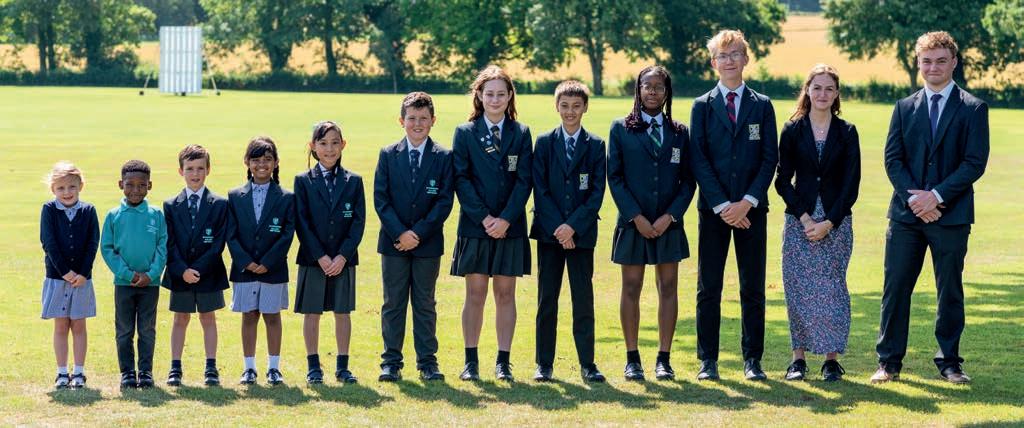


The Head of Malvern College on why schools need to broaden their outlook and think beyond Oxbridge to help students fi nd the right match for their aspirations
As Head of a boarding school with a long history, and a number of international schools within the group, it’s maybe not surprising that wherever I go in the world I meet alumni – more often than not, entirely by chance. Recently, returning from an international trip, I commented that I love the fact that Malvernians seem to be people who believe they can ‘go anywhere, do anything’. A recent alumnus just qualified as a BA pilot, making six pilots in total that we know of (not including those in the Armed Forces). He’s a great example of somebody who aimed high – literally – and determinedly followed his own path, rather than the more traditional route of an elite university followed by a highly paid job in professional services.
“What sets apart a great school is its ability to support and encourage a wide variety of routes to success”
Reading the histories of my school, its perception of success appears far too closely linked to just two universities. Even in the days when Oxbridge seemed the preserve of public school pupils, it was always a small minority who went on to these institutions. The vast majority did not and, of those I have met, they seem to have unfailingly led successful and fulfilling lives.
The UK, indeed the world, has many brilliant further and higher education options, and it’s time we began to value them. I increasingly see teenagers much more inclined to look beyond the traditional
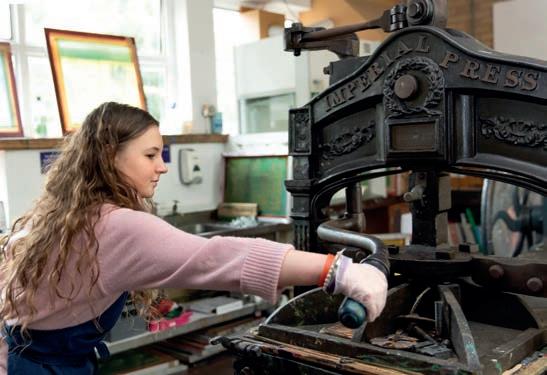
view of the epitome of academic excellence, and who are willing and able to go after the things that matter to them. This generation is extremely discerning about picking the right option for them: the right subject, a specific style of teaching, somewhere that provides relevant work experience or can open the right doors.
To secure a place at an elite UK university is a huge achievement and remains highly competitive. For some this is exactly the right path but for others, including many who are perfectly capable of securing a place, it is not where they would choose to be or, quite honestly, where they would thrive. It’s why I believe what sets apart a truly great school is its ability to do all that it can to support and encourage a wide variety of routes to success. Great schools also know their pupils well, so the support is there to make the most of their hard work and give them options.


Within the UK, there are 22 world-leading, research-led universities in the Russell Group alone. And why stop there? We’ve seen an increase in US applications and now have a member of sta dedicated to supporting pupils through the American application process (and also one for Europe). While Oxbridge may focus on academic rigour, Ivy League institutions like Yale, Harvard and Princeton combine this with sporting excellence and enhanced support through scholarships.

 KEITH METCALFE Headmaster Malvern College
KEITH METCALFE Headmaster Malvern College
I will soon attend my 30 years since matriculation at a Cambridge college and am greatly looking forward to re-engaging with old friends. Many are eminent in their fields. However, I’m not sure how many of us have really ‘gone anywhere, done anything’ in the way that I see from our young people today. When we tell young people the sky's the limit, we really need to mean it. As schools we do that by broadening our own measures of success.
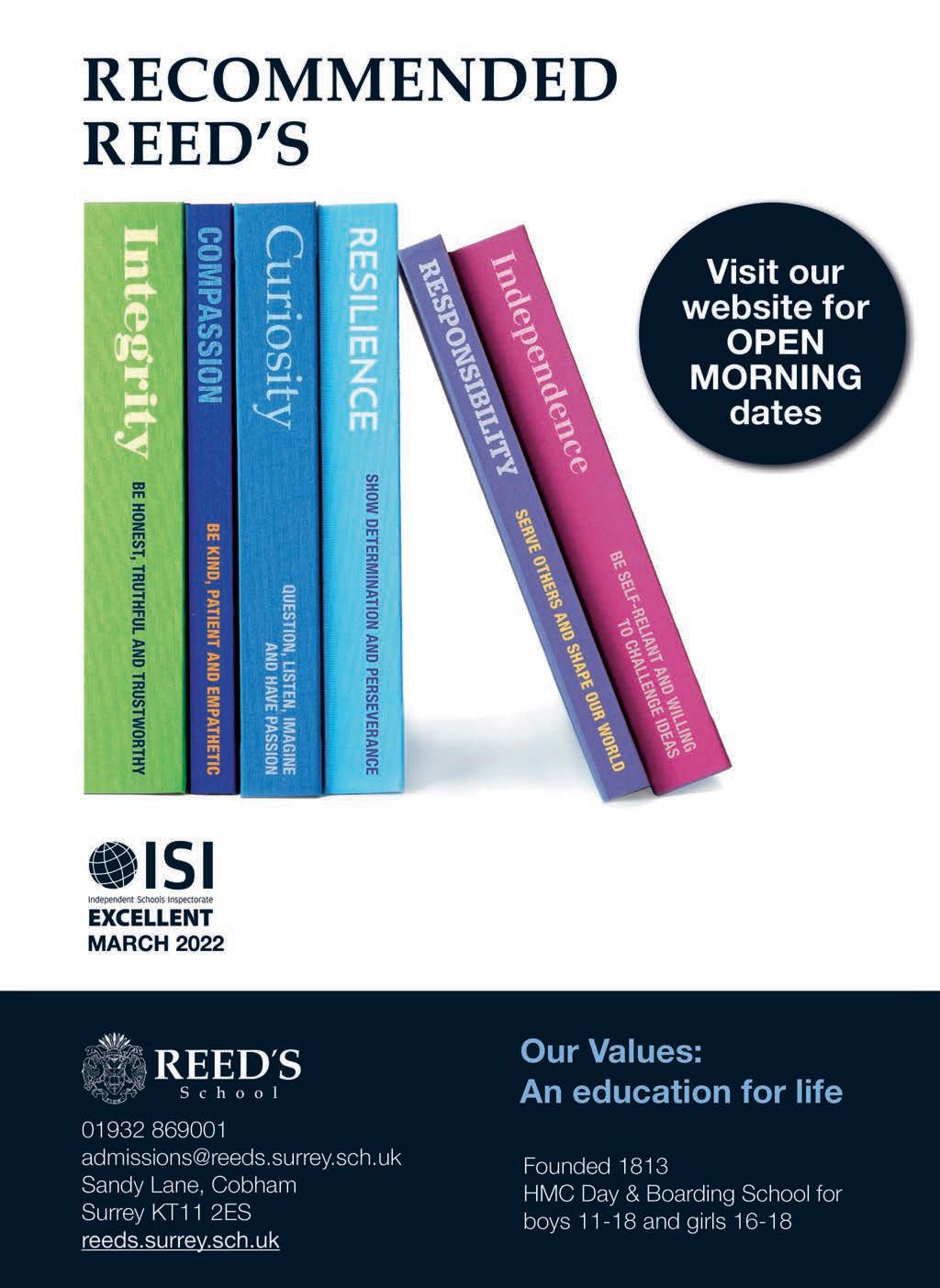
The Director of Partnership & Outreach at King’s College School Wimbledon on the value of working together with the local community
At King’s, we are proud of the dedicated community partnerships we have developed over the past 30 years. Working closely with colleagues at 33 local maintained secondary, primary, special and sixth forms schools, we were able to support over 2,370 young people in the last year alone. In addition, through our work with local charities and community groups, we run inter-generational initiatives to benefit both young and old.
Spearheaded by the late Heather McKissack, a much-loved teacher here who was awarded an MBE in 2016 for services to education, our school partnerships aim not just to educate but to empower. To enable this, we have built our partnerships programme into the very core of our curriculum, with Friday afternoons dedicated to these activities. The 50+ projects we run involve over 400 of our pupils each week.
For example, our pupils commit their time to leading science and Latin sessions for primary school children and to sharing biscuits and tea with elderly residents during ‘Friendship Hour’. They also help to maintain local parks and churchyards, give GCSE revision classes, run a blues orchestra and teach children how to swim.
For schools like ours, sharing resources and facilities is both a responsibility and a privilege. I regularly host reflection afternoons at which pupils share their experiences and advice with each other. Recently, I asked what our pupils had learnt
“When pupils participate in community projects, they learn, build relationships and broaden their perspective”

from their involvement in partnerships projects and responses included: ‘fostering a sense of unity and empowerment within the community’ and ‘helping young children gain knowledge and confidence’. It’s great to get this type of feedback from the pupils themselves. When pupils participate in community projects, they learn, build relationships and broaden their perspective. These kinds of partnership links also forge genuine and meaningful connections between partner schools.
Recently, our relationship with Harris Academy (HAWI) extended to include its new sixth form. Our pupils work together, benefiting from joint academic extension, university preparation and community projects. HAWI sixth formers even join King’s lessons in specialist subjects, enriching their learning journey and our classrooms.
Last June we launched a new initiative, King’s Arts, a five-day celebration of culture and the arts. We opened our doors to our local community so we could celebrate the uplifting and transformative power of the arts together. Our partnership schools were at the heart of this celebration,
and the concert featuring the choirs of pupils from our partner schools alongside alumni and King’s pupils was, for me and many others, the highlight of the week. Our second King’s Arts event this June will include lots more involvement from our partners – watch this space! Community engagement empowers our young people to go out into the world ready to make a purposeful contribution. We look to go beyond academic excellence to o er a true education of ‘Mind, Spirit and Heart’ – one that encourages positive values, humanity and regard for others.






The team at North Bridge House (NBH), a family of six London schools, believe that technology’s rise means human skills and strengths are even more critical
With a technology focused future, both science and the arts are more important than ever in developing the workforce of tomorrow. While technical skills will facilitate the continued development of our digital landscape, soft skills such as communication, creativity, and problem-solving are becoming increasingly hard for employers to find. Indeed, companies and universities are now using software to detect whether applications and assessments have been written by AI systems such as ChatGPT.
“Young adults need to understand technology – using it to complement human skill rather than replace it – and continue to develop the leadership, adaptability and artistic qualities that we focus on here at North Bridge House,” says Headteacher of NBH Senior School in Hampstead, Christopher Jones. Over half of employers find that graduates lack communication skills and 64% of students finish university with below-par critical thinking skills, according to a Cengage / Morning Consult 2018 survey. “AI may be a force to be reckoned with, but the real robot takeover that we, as educators, need to fear, is the takeover of generation alpha if they are not being adequately equipped
with the soft skills needed for our future economy to thrive,” adds Christopher Jones.
NBH’s six schools are focused on preparing pupils for the world into which they will graduate and believes the integration of technology needs to be carefully balanced with their personal development. Every pupil is encouraged to find what the school refers to as their ‘True North’ – a direction in life determined by character traits, interests and talent. “There are certain skills which our students need to develop in order to navigate their futures in this digital age,” says Christopher Jones.
This philosophy is central to the NBH approach. Advancements in tech are at


their best when those responsible have the empathy and understanding to appreciate the e ect they’ll have. This means combining technical knowledge with a philosophical approach – which is introduced with the Pre-Prep School’s Philosophy for Children programme. “The algorithms reflect the biases of those that create them, so awareness of inclusion and diversity is more important than ever in STEM subjects,” says Michelle Blaber, NBH Pre-Prep Head of School.
Pupils are given their own device from Year 3, and use of technology is then integrated into lessons in the same way that it facilitates many careers. A love of learning is maximised, with information seeking beyond the curriculum facilitated in the moment, as multimedia study tools create a dynamic learning environment.

“The real robot takeover we need to fear, is the takeover of generation alpha if they are not equipped with the soft skills needed for our future economy”
“Anyone can use a device and a search engine to develop their knowledge of a subject. We are here to deliver that content in a far more engaging way than any app or website ever could, and to therefore inspire not just the academically gifted, self-starter minority, but the teenage student majority. We are here to show them how to be human,” says Headteacher at NBH Senior School in Canonbury, Islington, Charlotte Tassell-Dent.
Though coding and computer science are subjects that open doors to the industries of tomorrow (and indeed today), NBH Prep School focuses on developing the soft skills that will see their pupils gain a job o er. Good manners, for example, not only make an excellent first impression, but a lasting one. “Pupils are confident when meeting new people because of the positive relationships that we foster within the North Bridge House community,” says Prep School Head Tom Le Tissier. “Our children are confident when speaking about their weekends with teachers or asking
for help in solving a problem, both of which model core communication skills.”
There is no replacement for human-to-human connection, which is why languages are an important skill of the next generation, too. The ability to build relationships across cultures and continents might be aided by apps and translation tools, but personal understanding cannot be replaced. At NBH, specialist teaching in languages begins at Nursery, with lessons in French and Italian founding the broader range of modern foreign languages delivered at prep and senior level.
A real-world focus involves pupils taking ownership over the part they have to play in the future of the planet, a sentiment that’s central to NBH Senior Canonbury’s ‘Plants, People and the Planet’ enrichment club and to the Prep’s Environmental Council. Fostering appreciation for the natural world develops responsible, global thinkers, with mindsets rooted in the bigger picture. Extra-curricular opportunities further develop the leadership, adaptability and soft skills needed to produce change-makers of the future. “AI is only as powerful as the input it receives,” says Tom Le Tissier.
“We cannot underestimate the power of being human when preparing our students for tomorrow’s job market,” says Brendan Pavey, Executive Headteacher at North Bridge House Schools. “We integrate technology into an increasingly wide-ranging, dynamic and creative learning experience. This promotes the soft skills that will prove just as central to students’ happiness and success as fulfilling their academic potential.”






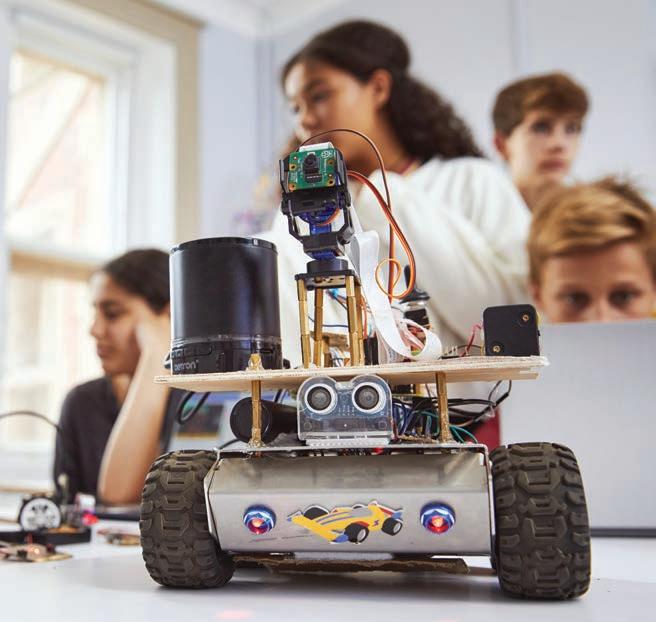
Reddam House describes how its forwardthinking approach to education is preparing children for tomorrow’s world
With rapid technological advances, education has never been more important. This makes choosing a school that goes above and beyond the traditional curriculum crucial. Reddam House in Berkshire balances a high level of attainment with a forward-thinking curriculum that prepares pupils for our fast-changing world.
Academic excellence is more than just grades – encompassing a holistic approach to learning that fosters critical thinking, creativity and adaptability. Being part of the Inspired Group of world-class schools gives children at Reddam House an advantage, as pupils have access to exceptional resources plus the ability to connect across time zones
and around the world through virtual environments. This includes exciting opportunities, such as geography lessons with students from Reddam, Switzerland, Mexico and New Zealand using VR headsets in a private metaverse. The curriculum features Inspired AI, while Computer Science is embedded from Year 1 – and every student has their own device from Year 4. A broad range of extracurricular activities are a vital part of the mix in building confidence, preparing students not only for academic success but also for personal and professional growth. It’s also important to have fun.
Thanks to its glorious grounds, with 125 acres to explore, Reddam House has space for young people to try new things and find their passions – whether that’s via the dedicated outdoor adventure department,
“Pupils can connect across time zones and around the world via virtual environments”

after-school clubs, professional-level theatre, swimming pool or brand-new sports hall.
The challenges of the future require people able to ‘think outside the box’. That’s why nurturing creativity, resilience and flexibility is a huge focus. In the early years and Junior School, the curriculum is structured to provide many openended activities, focusing on risk-taking, reflection, and initiative. It’s all about the development of a ‘growth mindset’ –encouraging the idea that hard work and determination will overcome barriers. Children are also encouraged to become critical thinkers. This starts in Reception classes, where pupils are the protagonists for their project work, inspiring them to develop their own ideas on a daily basis.
There are many other ways in which Reddam House inspires children to see stretch and challenge as positives. There’s a full programme of sports, clubs and performance opportunities, alongside CCF and the Duke of Edinburgh’s Award (DofE). All these opportunities build skills for life – and are highly valued by universities and employers in demonstrating commitment, teamwork and a well-balanced outlook on life.
Forward-thinking schools not only prepare young people to meet the needs of today but also of the future. By prioritising a holistic approach to education, Reddam House ensures its students are well equipped to rise to the challenges and the opportunities of tomorrow’s world.
reddamhouse.org.uk
Plays and concerts at Hurtwood House are spectacular – big casts, professional crew and talent scouts among the full-house audiences.
Absolutely Education goes behind the scenes






Hurtwood House is, serious about putting on a great show. Big budgets and huge casts are involved, and with professional backstage crew. Shows are staged to a full-house audience – typically each show runs for ten nights. Locals lucky enough to get a ticket (there's invariably a waiting list) describe it as like a trip to the West End right on their Dorking doorstep. There's the frisson of knowing you might be among the first to see a future A-lister (or several). That's also why agents head down for shows – they know Hurtwood has form. Harry Lawtey, Vivek Kalra, Celeste Dring, Honor Gillies, Toby Miles and, a little further back, Emily Blunt, Tom Mison and Nikki Amuka-Bird –and that's just a few stars to reckon with.
It has long been known as one of the places for GCSE and A-level students who want to pursue a career in creative fields.
While not all students seek a career in the spotlight, there's way more talent here than you might reasonably expect in a smallish (around 350 students) school. What's also notable is how many of them are on that stage during one of the 'spectaculars' planned and staged throughout the year. For example, Legally Blonde, staged last December, involved a cast of 90, plus a further 15 backstage. "When you've suddenly got over 100 people involved in a major production, it becomes the heartbeat of the school," says Hurtwood House Head of Performing Arts Doug Quinn.
He's been at here for 19 years, 12 of those years as department Head. Before that he worked as a professional director and at major London drama schools, so he's seen talent in his time, but this is something special. "It's that middle ground between youth theatre and professional directing," he says. "You are not trying to inspire them. They're all wonderfully
“One of the first things we say to the students when they arrive here and come for auditions is: 'this isn't a school play – we don't do school plays'”




At Framlingham College we celebrate every individual. Our size, structure and ethos mean that our entire focus is on understanding, guiding and inspiring each child individually – so they can find their self-belief, discover their own talents and challenge themselves to achieve more than they thought possible.

“Not everyone is going to go into the acting world, but it is going to give them that sense of being able to collaborate and work together”
inspired and can't wait to get started. But what they have got is these emerging skills that you are really helping to fine tune. You're also opening their ideas to theatre practice, that acting is only one part of it. There are budding producers and designers, and choreographers and dance captains – and we try and give out some of those responsibilities across the shows."
Hurtwood has a policy of never turning away students who audition. A role is found, even if it's a small one. This means ensemble pieces on a grand scale. For instance, when the school staged Into the Woods, Sondheim's musical reworking of classic fairytales, it grew the cast list from around 20 to 75. "So, then you think, 'well what are we going to do with all these other people?' says Doug Quinn. The answer: physical theatre. For Into the Woods, they became narrators, forest folk, birds and human 'props'. This style has become something of a school USP – audiences love it. "We try and not do blackouts between scenes, for example. Because if you've got a cast of 90 you can do something really theatrical with the change of mood and scene and atmosphere."
Hurtwood spends money on staging – £50,000 plus is not unusual – and brings in professional backstage talent. "It's obviously a huge joy for me as I get to work with another director; I get to work with a full technical team. I have a costume designer, a lighting designer
a stage set designer a production stage manager. We have a professional DSM who comes in and runs the tech side for us."
With these qualities in production, this is a real taste of what life on the West End or Broadway stage might be like. It raises standards across the board – but high standards are expected at Hurtwood. "We aspire to that, and one of the first things we say to the students when they arrive here and come for auditions is: 'this isn't a school play –we don't do school plays'." And, of course, with a ten-night run, this is a huge commitment – giving students a real insight into the demands of a professional theatre role. Since most productions are musicals, there are all
these other elements involved – dance, choreography, singing. Doug Quinn doesn't buy the snobbery sometimes attached to musical theatre. "Yes, you need to be able to sing and act and dance, but your peripheral understanding in a musical – learning choreography, listening to vamp bars, working with beats, singing in close harmony, picking up a prop, multi-rolling – is a huge demand."
Everyone plays their vital part, and this becomes a tight-knit collaborative exercise. "Not everyone is going to go into theatre, and acting is only one part of theatre, but it is going to give them that sense of being able to collaborate and work together. Whatever your background, seeing the world through somebody else's eyes and being able to get on with people is the secret to life."
The fact that students do all this while undertaking the usual pressures of schoolwork in preparation for GCSEs and A levels (and Hurtwood achieves excellent results), makes its shows all the more remarkable. Doug Quinn has a favourite saying that students all know – 'if you're on time, you're late'. This all feeds into the school's culture of high standards of professionalism – of getting students ready for an unforgiving world.
"They're allowed to have egos while they're here. They're allowed to get it wrong, they're allowed to make mistakes, and moan to their parents and turn up late for rehearsals and get told o ," he says. "You can learn those things here, in a safe environment, where everybody will forgive you – but there is an expectation..."
It's an expectation that students more than rise to – and Doug Quinn says the atmosphere across the whole school is magical when show time dawns, not least because so many are invested in opening night success. "It is that energy that is di cult to quantify. If you could bottle it and open it, I think you'd be a millionaire."


Inspiring and equipping children aged 3-13 to


Broomwood provides a unique approach to education. Our children start together at the pre-prep, before moving on either to Broomwood Girls or Broomwood Boys. Beyond the classroom, they come together for a host of enrichment activities and are well prepared for moving on to some of the top senior schools in the country.

Little

Learning outdoors at Cranleigh Prep Page 44
We all need nature, and for children it’s critical – not only boosting mental and physical health but also supporting capacity to learn and build resilience. We speak to schools that love learning outdoors
At QE’s Chapter House and Queen’s Kindergarten, Head Karen Kilkenny is a great believer in the importance of taking learning beyond four walls. “Outdoor learning is a large part of school life for all ages at Chapter House.”
Located on a stunning campus estate near York, the Collegiate is blessed with plenty of green space to provide an immersion in nature. This includes a dedicated woodland area for Forest School and wellbeing activities. “Our Level 3 Forest School Specialist Charlotte Catton runs sessions that engage the younger children in a variety of activities, including creating nature art from found materials, campfire cooking, den building, role play and flora and fauna recognition and research,” adds Karen Kilkenny. Charlotte Catton can testify to the magic this brings to the school day for pupils. “The children love the excitement of leaving the classroom and being able to experience the outdoors. They have the space and freedom to take risks in a controlled environment.”
Weather is always a variable in the UK, but this doesn’t get in the way. “We take the children outside no matter the weather. The younger children have access to all-weather clothing for outdoor play and Forest School sessions,” says Karen Kilkenny. “If it rains, we splash in puddles, if it snows, we play in the snow, and if there is ice, we learn about melting and smashing and do fun experiments.”
Older Chapter House children can also benefit from nature enrichment and learning. There are wellbeing walks, as well as two allweather areas that are well used for specific project work – for instance investigations in science and number trails in numeracy. “Within this setting, we have round bench seating for lessons, a library where we can share books, both inside and outside, and plenty of space to develop motor skills through ball games,” says Karen Kilkenny.
There’s also an area for the early years children to explore outdoors throughout the school day – perfect for inspiring free-flow learning and play. It’s easily accessible and designed to build independence, so that pupils build confidence and take charge of their learning. Fun resources include a


mud kitchen and water play, a stage and a garden for growing their own produce. Chapter House also gets to share the extensive facilities of the wider campus – including QE’s lovely Kitchen Garden. “Our little gardeners help grow produce that is then cooked and served onsite.”
All age groups regularly take advantage of wider community resources locally, such as Piglets Farm and Yorkshire Wildfire Park. “We also have visits from groups such as Nuzzlets who bring a variety of animals onsite for the children to learn about, pet and feed,” adds Karen Kilkenny. “In addition, Year 5 students participate in a residential visit each year to High Adventure, where they undertake team building activities.”
For Karen Kilkenny there’s no doubt that taking pupils outside is a powerful addition to enjoyment and academic outcomes. “It fosters the physical, cognitive, emotional and social development of children by providing them with opportunities to learn through play, exploration and discovery,” she says. “It enables children to express themselves in an infinite number of ways through exploration and to become independent learners who can also work well as part of a team.”





“The children love the excitement of leaving the classroom – they have the space and freedom to take risks in a controlled environment”



ABOVE
At Millfield Prep in Somerset, nature and experiential outdoor learning play a huge part within both the curriculum and in co-curricular opportunities. “Our rural location is an outdoor lover’s paradise,” says Millfield Prep Head Dan Thornburn. “It is a wonderful environment to grow up in, foster a love of learning and create lifelong childhood memories. Our pupils learn by experiencing the environment first-hand.”
Breadth of opportunity is central to Millfield Prep’s philosophy – giving pupils the opportunity to try new things, have a go and find their talents and their passions. With over 80 di erent activities – from climbing and archery to surfing and kayaking –there is an activity here for every pupil. While Somerset weather can be as unpredictable as the rest of the UK’s, the team believe learning in all conditions only aids pupils’ knowledge and understanding of the environment around them. And, of course, the right kit and preparation makes learning even in the cold and wet, an exhilarating and rewarding experience.
Millfield Prep launched a Wellbeing Curriculum in 2021 to develop pupils’ understanding of their own mental health and wellbeing and that of other people around them. The curriculum is also designed to give them the tools to understand and enhance both physical and mental health. Pupils in Years 7 and 8 have a weekly 40-minute lesson, in addition to their PSHEE class, in order to participate in activities such as yoga, outdoor activities and mindful walk and talk.
The 200-acre campus set in lush Somerset countryside close to the iconic Glastonbury Tor provides many other outdoor opportunities. Alongside multiple sports pitches and golf courses, there’s an equestrian centre and onsite Forest School. Millfield Prep also has access to the exceptional facilities of Millfield Senior School – a sevenminute drive away – so Prep pupils benefit from a further 240 acres of state-of-the-art sports and outdoor facilities and spaces.

This area of the West Country is rich in wildlife, and every week, a team of enthusiastic children volunteer to take part in conservation e orts at the local Shapwick Moor Nature Reserve (part of the Avalon Marshes wetlands). The Moor is a haven for wild birds and Millfield Prep pupils take on a variety of tasks to support them and their natural environment. This includes constructing bird hides and clearance of trees to improve biodiversity and attract more beneficial wildlife to the area.
Beyond the local landscape, organised camps for whole year groups take place with school activity trip specialist PGL. Recent treats have included visits to Barton Hall, Adventure Bude and Adventure Wales, where pupils take part in adventures such as high ropes, dragon boating and caving. Closer to home, boarding houses regularly enjoy spending a summer’s evening trekking up Glastonbury Tor to enjoy the panoramic views over the Somerset Levels and beyond.
“IT IS A WONDERFUL WAY TO FOSTER A LOVE OF LEARNING –PUPILS LEARN BY EXPERIENCING THE ENVIRONMENT FIRST-HAND”
One side benefit of the Wellbeing Curriculum has been in pupils’ perception and enjoyment of nature. This, alongside the full outdoor programme, has spilled over into all aspects of school life. “Children are noticeably calmer, more relaxed and settled around campus, something that has been recognised by teachers, houseparents and peers,” says Deputy Head (Pastoral) Ben Hilton.
This, of course, supports resilience and academic focus – as well as giving children a strong foundation to maintain wellbeing all the way through school and into adult life.
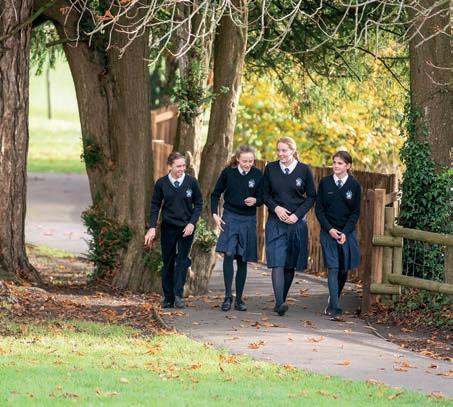

At Cranleigh Prep School, in the heart of the Surrey Hills, the surroundings lend themselves to making the most of nature. With some 40 acres of delightful grounds to roam in, outdoor education is central to pupils’ education.

Headmaster Neil Brooks says there is no single role that outdoor learning plays in school life, but many – from building resilience, teamwork and collaboration to understanding of the natural world. He adds that it also builds skills and enthusiasm in areas such as the natural sciences.
“Fundamentally, outdoor learning helps to eradicate the rather old-fashioned but widely held belief that learning takes place in a classroom, a formal environment in which a teacher facilitates children increasing their knowledge and understanding of specific subject areas. Outside, the environment for learning is completely di erent and can be literally without boundaries,” he says.
“We are all aware of the benefits of being in the fresh air, surrounded by greenery and birdsong, on our wellbeing – and research provides substantial, indisputable evidence to support the need to get out into nature to promote and sustain positive

“SIMPLY BY BEING OUTSIDE, THE CHILDREN ARE SUBCONSCIOUSLY BECOMING MORE FAMILIAR AND AWARE OF THE NATURAL WORLD IN ALL ITS BEAUTY”
mental health,” he adds. At Cranleigh Prep, there is also a focus on helping children to understand that they are part of something bigger and have a responsibility to steward the natural environment.
Neil Brooks sees this as an important by-product of the fun, scientific study and imaginative learning that takes place outdoors. “At the same time as learning survival skills, kick-starting their imagination for a creative story set in a far-o jungle, re-enacting the battle of Bannock Burn or studying the number of species which call an oak tree home, simply by being outside, the children are subconsciously becoming more familiar and aware of the natural world in all its beauty.” And children here venture outdoors whatever the weather. “The huge benefit from children going out in the rain and cold is that it adds enormously to their
sense of resilience. A little discomfort is soon forgotten if their minds are distracted by an interesting and engaging activity.”
At Cranleigh Prep, the philosophy is to ensure that every child’s education includes plenty of variety to ensure fun and inspire learning – and here, that really does come without limits. “It can be working as a team to cross a field of ‘shark-infested custard’ with barrels and planks, looking at mathematical data on a slope profile, painting a landscape, exploring di erent leaf patterns on trees or just running about playing tag,” says Neil Brooks.
Whatever the adventure, he has no doubts it adds something immeasurable. “The benefits can be enormous and varied, and there’s fun to be had – even if it’s coming into a warm classroom for hot chocolate after a cold and wet adventure.”

The best classroom and the richest cupboard is roofed only by the sky.” So said Margaret McMillan, nursery school pioneer, in 1925. Research from The Children’s Society in 2020 revealed that one in six children between the ages of 5 and 16 is likely to have a mental health problem, and that over the previous three years, the likelihood of young people having a mental health issue had increased by 50%.
These numbers have risen since the pandemic, and schools are looking for more ways to support students with mental health concerns, but more importantly, to foster student wellbeing through positive actions. During the pandemic, we all heard about the mood-enhancing benefits of
“Forest School sessions ensure that children grow in self-confidence, as well as developing their physical, emotional, cognitive and social skills”


spending time in nature. The reasons are many and varied – including immersion of our senses in the sounds, sights and scents of nature, and the fascination and calm that comes from observing living creatures in their natural habitat.
Formalised outdoor schooling is relatively new despite its simplicity. Forest School originated in Scandinavia in the 1950s. This was introduced to the UK in 1993 by a group of nursery nurses from Bridgewater College, Somerset. They had visited a Danish Forest School and were so impressed that they developed their own programme.
At ISL we are fortunate to be on the edge of beautiful Gunnersbury Park, from where we have run our Forest School since 2018 for all


Primary students – more recently, extending to Grade 6 (Year 7) students as ‘Natural Pathways’ study. The Forest School ethos supports children to develop self-esteem, independence and confidence through child-led play in nature. It takes a holistic approach to learning and builds problemsolving skills and creativity, as well as developing basic bushcraft. Getting out of the classroom is so important as it fosters a deep connection and love of nature through play and observations across the seasons. In the rich woodland of the park, children are given time and space to discover things for themselves. Sessions are designed to meet individual needs to ensure that children grow in self-confidence, as well as developing their physical, emotional, cognitive and social skills. This hands-on approach is in recognition of the benefits of nature play, especially for the youngest students. Many families are now looking for a more holistic approach to education that emphasises social and emotional skills just as much as academics.


The children particularly love Miley, our Forest School dog, who has an immediate influence on the children’s demeanour. Interacting with dogs improves the students’ sense of responsibility, as well as teaching nurturing skills. Naturebased education can be a fantastic antidote to modern concerns, such as obesity, attention deficit disorders, depression, habitual screen time and the emphasis on stressful and busy schedules.
RICHARD PARKER Head of School ISL LondonAt ISL, we are firm believers in the importance of combining a traditional school curriculum with open-air learning which has a significant positive impact on student wellbeing.
ABOVE ISL London pupils taking learning outside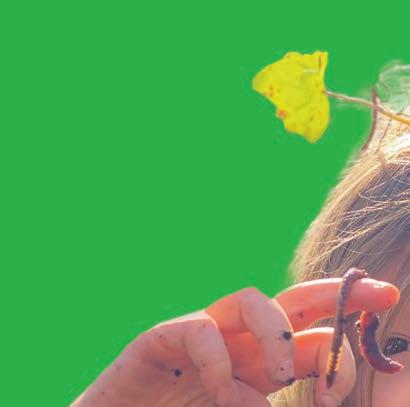




Your child’s primary years are fundamental in shaping not just what they become, but who they become.
King Alfred School has over 120 years of experience of designing joyful learning experiences which give each child the space they need to discover and develop their passions, to embrace challenge and reflect on their achievements.
Our creative curriculum inspires children because they do it
through experience, through play, through genuine interest; we nurture an eagerness to know more and encourage greater depth of understanding.
We have high expectations for our children and give them the freedom to explore and grow - all within a structure which lets them develop at the pace which is right for them.
The results speak for themselves; happy, confident children who love to learn.
Find out more about the school, or book to attend an open event at www.kingalfred.org.uk

Equipping the next generation with the skills and mindset for the future is becoming a hallmark of an excellent education. Fostering a global perspective prepares children to contribute positively to society. It also helps to put them in the best position for the dynamic job market of the future.
Critical thinking skills are also key, as pupils learn to question, analyse, and evaluate information independently. This approach not only enhances academic knowledge but also develops the ability to navigate complex issues rationally and build a problem-solving mindset.
Thomas Lewis, Head of Prep at Fulham School in London says: “At Fulham School we pride ourselves on being a community where individuals think and reflect in
order to make their choices. This starts in our pre-prep, where the young learners often make key choices about their learning day to day. In Year 2 Philosophy the pupils ask reflective questions, and one is chosen as question of the week for further discussion. A recent example was, ‘is it better to live the life you have or the life that you want?’ Safe to say our pupils have all of us thinking!”
In an age of rapid advancements, technological literacy is non-negotiable. Children must be empowered to use technology responsibly from an early age, ensuring they are well-prepared for the demands of the digital age. Fulham School is leading the way with technology integration. “Our metaverse classroom is a prime example,” says Thomas Lewis. “Here, the safe (password-protected) space gives scope for experiences that cannot be enabled in other ways. For example, Year 8 walking through the inside of a
“At Fulham School we pride ourselves on being a community where individuals think and reflect in order to make their choices”
computer to identify the working parts and explain their functions to one another.”
This leads on to communication skills, which are paramount in a world where collaboration knows no borders. Pupils are encouraged to develop e ective skills to collaborate seamlessly – an essential tool for navigating diverse locations and communities.
A world-class education places strong emphasis on environmental and social responsibility. Pupils learn about the interconnectedness of the global community and the impact of individual actions. By instilling this sense of responsibility towards planet and society, schools nurture pupils who are environmentally and socially aware.
“Last year our Fulham Project was based on the UN Sustainable Goal of ‘Clean Water & Sanitation’. This topic pervaded many activities across the school, spearheaded by our senior students,” says Fulham School’s Head of Prep Thomas Lewis. “Examples ranged from Science Projects on water filtering to a multi-year group ‘Water Walk’ for charity along the Thames.”
Developing values such as integrity, and empathy ensures that the next generation will be ready to make positive contributions to their communities and the world at large. Schools play a crucial role in shaping the next generation of citizens, equipped not only with knowledge but also with the understanding necessary to make a positive di erence to an interconnected world.




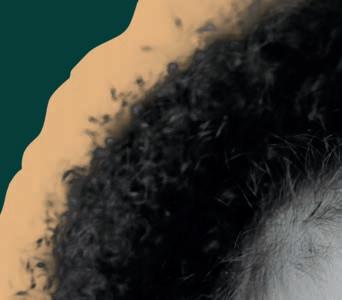
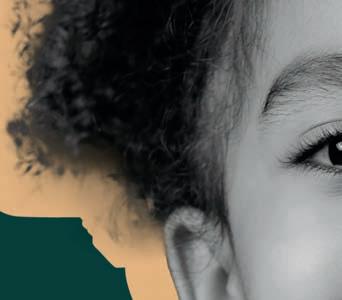
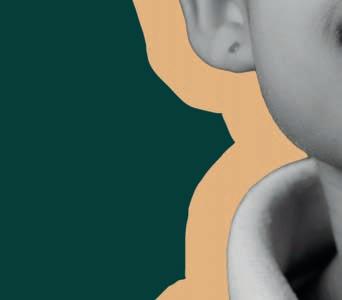








The Head of Broomwood Pre-Prep – part of the Broomwood family of schools – on how its new physical programme delivers benefits across the board
During the holidays, an exciting new piece of play equipment was installed in the garden of our Early Years site. It is a large wooden climbing frame, carved at the top with distinctive green leaves. Watching the little ones scramble up and over it with confidence makes me reflect on how important movement and body control is, and how much progress they have made since joining us in September.
The advantages of good physical health are undeniable, so we wanted our PE lessons to work harder for us by benefiting our pupils in all their lessons. For us, they aren’t just about laying the groundwork for playing sports in the years to come. PE lessons in the Early Years are also
“We use a series of exercises usually employed by occupational and physical therapists to build up core strength, balance and coordination”
about ensuring children have both the gross motor skills (co-ordination, balance, muscle tone, and so on) and the fine motor skills (such as holding a pencil or pulling the zip on a coat) to excel in all areas. Core strength, for instance, is crucial for pupils when sitting on the carpet or at a table in the classroom. We are lucky that we can call upon the expertise of specialist

sports sta across the Pre-Prep and Prep school sites and we sat down together to develop a programme tailored to this age group. We now use a series of exercises, more usually employed by occupational and physical therapists, to build up core strength, improve balance and develop coordination.
A typical activity might involve bouncing a balloon first on the right hand and then on the left to work both sides of the brain. Then we might ask pupils to crawl in the plank position from one side of the room to the other – this builds up both core strength and coordination. While this approach is established in Key Stage 1, this is the first year that we have introduced it to the Pre-School, so we


look forward to monitoring the children as they progress to see its e ects.
What we do know already is that the children have enjoyed doing these exercises and our early conclusion is that it has built up their confidence and improved their overall fitness. In addition to this, we believe it is transforming concentration levels in the classroom.

 CARON MACKAY Head Broomwood Pre-Prep
CARON MACKAY Head Broomwood Pre-Prep
As the children move up Broomwood into higher years, they will be introduced to more formal sporting activities. Great muscle tone, good core strength and physical confidence, developed and supported during these early years, will give them an advantage both in and out of the classroom.

A bilingual stream at The Roche School in Wandsworth is giving early learners immersion in one of the world's most widely spoken languages
There can be no doubt that early immersion in a bilingual setting is a huge boon for children.
Beyond the communication skills acquired, there's the boost it gives to general development – cognitive skills, problem solving, empathy and improved facility in native language are all cited.
The Roche School in Wandsworth is taking early language acquisition seriously, having operated an optional bilingual Spanish stream in Reception since 2022. This sits alongside the traditional English stream, so parents can choose either – and take-up of the Spanish option is high. "In
the first year that we started the Spanish bilingual stream, we had no idea how popular it would be, but we had 18% more children joining the Spanish bilingual stream than the all-English stream, so it has been really popular," says Sophie Roche, Bilingual Stream Lead.
It has drawn in Spanish speaking families, but they are not the main cohort.
"What's actually really interesting is that the majority of parents have no prior links or family who are Spanish speaking. What we've seen is that those parents who do choose the Spanish bilingual stream just recognise the numerous benefits of their child having more access to Spanish than they would
normally get in a primary school setting." While there are a variety of specialist international schools in London (including the Spanish-Embassy operated Instituto Español Vicente Cañada Blanch in Notting Hill) delivering their home nation's curriculum, at The Roche children are following a UK system and teaching approaches, but with the addition of Spanish delivery across multiple classes. So why Spanish? "Spanish is spoken so widely around the world," says Sophie Roche.
"And the founder of The Roche School is a Spanish speaker herself so she's always been very passionate about the language."
Children joining the Spanish stream in Reception spend their mornings


learning Literacy, phonics and Maths in English – this is judged to be the best way for building skills in these core subjects. In the afternoons, they move on to topic lessons, but all taught in Spanish. "It's much more organic," says Sophie Roche. "These are lessons they would be doing anyway but they happen to be in Spanish. What's interesting is that the children don't think about the Spanish – they are doing art, but it just happens to be taught in Spanish." This year, the school even has sport delivered by a Spanish speaker, which adds to the immersion as part of everyday school routine.
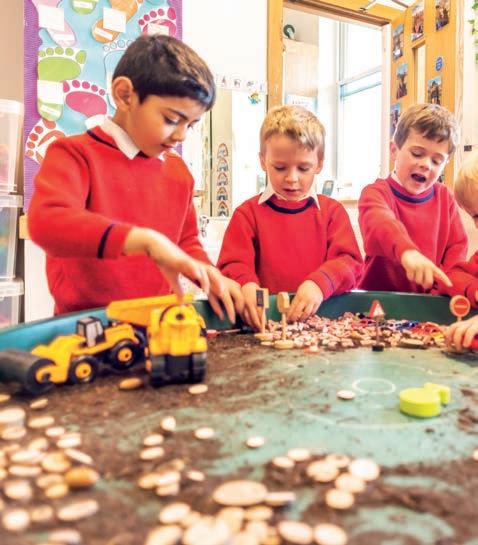
One of the beauties of immersion in Spanish in these early school years, says Sophie Roche, is that it's a phonetic language, making it more accessible than the traditional UK first foreign language French. No one is expecting children to become fluent Spanish speakers, but this early start will help when they move on to more formal language learning. "Spanish is a good gateway language to other Latin languages," adds Sophie Roche.
There are 29 languages in addition to English spoken by The Roche children (many families already use two languages at home), so the openness of parents to a bilingual early years stream is not surprising. Parents are asked to pick their stream and stick with it for at least half a term – so far only one child has switched back to the all-English stream, and that's because her mother wanted her to focus on
“The children don't think about the Spanish – they are doing art, but it just happens to be taught in Spanish”
her French at home. The bilingual teaching continues to around Year 2, all set within an academically well-rounded curriculum with plenty of sport, drama and music.
The Roche is part of the Bilingual Education Alliance, which shares best practice across bilingual schools and is developing assets and approaches to enhance the experience for young linguists. The focus at The Roche is on building oral skills – with lots of fun using song, images and mime.
Parents have been impressed by how much their children have learnt – many share their newfound facility with Spanish numbers, colours and songs at home. Sophie Roche has no doubt this approach is paying dividends in engaging children with the fun of speaking and understanding foreign languages. "I think it's such a gift for anyone at any age," she says. "If we can facilitate more language exposure during day-to-day learning, it seems like a no brainer."

Enable your child to benefit from an exceptional education, Wetherby School Kensington has limited spaces available for September 2024.
www.wetherby-kensington.co.uk
The Head of Heatherton School on its immersive approach to STEAM teaching and learning designed to show girls that all pathways are open to them
Some of my earliest treasured childhood memories involve the joy of learning about the world around me. Lying on a warm patio watching a line of ants carrying breadcrumbs, rubbing wax onto the runner of a sledge to make it go faster or the amazement of observing a water boatman walk on water. I asked myself, if these wonders are part of everyday life, what else could be out there?
It is my aspiration that the girls at Heatherton are free to dream big. Therefore, my interest in girls in STEAM is to support, encourage, and enable them to understand that every pathway is open to their choice and to nurture the traits needed to thrive.
From the moment they arrive at the Heatherton Nursery, pupils are visited by science specialists who teach basic scientific principles through playful discovery – meaning pupils often don't even realise that they're learning. For example, pupils pour water down a pipe into di erently shaped containers or hold an animal skull and talk through the shape of its features to work out its identity.
Having spent a few days in Helsinki to see what we could learn from the incredible kindergartens there, we linked with Finnish Kide Science. We are now rolling out a pedagogical approach to our EYFS teaching which evolved from evidence-based research. The premise
"We believe that using a specialist lab is a game changer in the breadth of understanding that can be achieved"

is that the girls learn through discovery and expertly guided trial and error.
As pupils progress through the school, they enjoy the annual celebration of British Science Week, where they can learn to code a robotic arm, test how far slime can stretch, or build marshmallow catapults. The girls enjoy hands-on trips to the Science Museum's Wonderlab, Natural History Museum and FSC Amersham Field Centre to enhance their immersive learning. We believe that using a specialist lab is a game changer in the breadth of understanding that can be achieved.
Pupils are visited by guest speakers holding esteemed roles in STEAM, from Professor of Space Physics and budding astronaut Suzie Imber (an


old Berkhamstedian) to Professor Matthew Snape (who worked with the Oxford Vaccine Group during COVID-19). These guests help pupils discover the kinds of sciencerelated careers they could aspire to.
We recognise the importance of art and design and food technology in developing the girls' creativity, motor skills, critical thinking, and collaboration. They learn about nutrition, seasonality and sustainability and link this to the dishes they produce. Engaging in artist workshops and entering competitions enables our pupils to recognise the significance of the arts within our society and builds their confidence in self-expression and communication.
We have recently adopted the mastery approach to teaching maths from Years 1 to 4, with elements also being adopted in the early years. In Years 5 and 6, we have a bespoke curriculum that prepares pupils for the rigours of 11+, scholarship papers and senior school. Pupils love the stepped approach to learning, and the opportunity to explore mathematics through online tools.

 NICOLA NICOLL Headteacher Heatherton School
NICOLA NICOLL Headteacher Heatherton School
Heatherton is a pioneer school in showing our girls that studying and enjoying STEAM subjects is as much for them as for their male counterparts. We are confident that Heatherton's work promoting STEAM will inspire even more female pupils to pursue these subjects through GCSE and beyond to be a force for good.
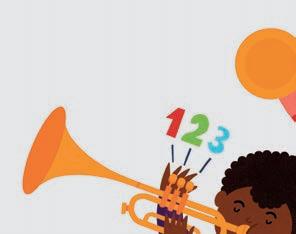




Top teacher and proud ‘maths geek’ Chris Smith MBE is on a one-man campaign to promote the excitement and creativity of this universal subject
You can’t help but be carried along by Chris Smith’s passion for maths. He fizzes with ideas to inspire young and old alike. So much so that he’s garnered fans across the world, an MBE (2023), a Scottish Teacher of the Year Award (2018) and o cial ‘Brainiest Family’ (co-earned with equally brainy family in 2019) on BBC Two’s The Family Brain Games
Then there are those delightfully wacky YouTube celebrations of Pi Day produced with his school, Grange Academy, Kilmarnock. From an epic whole-class reworking of “Y.M.C.A.” (PiMCA) to Pi in the Sky, filmed by drones and featuring 432 pupils and the first 314 digits of the magical number. Basically, whatever he’s up to mathematically, Grange Academy’s Mr Smith makes numbers look pretty cool.
His book That’s Mathematics, published in hardback last year and just out in paperback – timed precisely for Pi Day on 14th March – is based on the song of the same name by Harvard professor, songwriter and entertainer Tom Lehrer. The idea for the book came after Chris Smith and a gang of mathematically minded buddies (including Rachel Riley, Bobby Seagull, Hannah Fry and Eddie Woo) brought the song to YouTube in May 2020 in celebration of Lehrer’s 92nd birthday. It was a Lockdown smash hit – everybody loved it. That included publisher Mama Makes Books, whose MD thought a book inspired by the song would be perfect for early years readers.
Using the song was easy after Tom Lehrer’s generosity in putting his entire songbook into the public domain in autumn 2020 via a website (tomlehrersongs.com). Lehrer is in full retirement now, but he had watched that smash hit YouTube video and sent a brief acknowledgment. “That made our day,” says



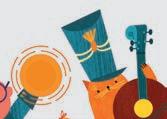





Smith. “Tom Lehrer is happy for people to still be making the most of this lovely song.” In That’s Mathematics, Smith takes the original lyrics and weaves fun puzzles and challenges that show maths in action, all highlighted by Elina Braslina’s lovely illustrations. It is a fun way to engage children in maths’ ubiquity.
Smith is a compelling salesman for maths. Indeed, he’s a one-man advertisement for having fun with numbers – even managing to get a local billboard company to let him take over their property for Pi Day a couple of years ago. The billboard then showed all Kilmarnock the amazing qualities of Pi (adverPising, of course). Grange Academy pupils provided the creative zing, producing everything from stop-motion animation to slick presentations.
in advance. Some want to know why they aren’t yet eligible to go on the annual maths revision camp introduced in 2015. This combines fun with “working their socks o ”.
“Maths is set in that sweetspot. There’s a bit of science in there, it’s got art, it’s got language – it spans those di erent things”
it – not everything is going to work for every person, but they can usually pick out wee bits here and there,” says Smith. “It’s kept me looking for ideas, trying to keep my teaching fresh, and not stagnate.” There seems little danger of that. And when he goes to pick up his MBE for ‘services to mathematics education and to the community in East Ayrshire’, the maths geek is rather hoping he can win over yet another high-profile subscriber. Numbers are there to be celebrated and Chris Smith is showing us how. And for any parent looking to introduce their child to this universal language, counting sheep and folding sheets seems an excellent place to start. This, after all, is mathematics.

He’s more than happy to have maths writ large across the Ayrshire community – it increases student engagement – and he’s delighted that the local newspaper refers to him as ‘resident geek of the Maths department’. Grange Academy children ask him about the school’s Pi Day plans months







Most of all, Chris Smith is passionate about showing young people that maths is creative. “Maths is set in that sweetspot. There’s a bit of science in there, it’s got art, it’s got language,” he says. He demonstrates the language in class from time to time by pulling up a Gaelic maths paper (students here can sit exams in English or Scottish Gaelic). Children go from ‘I can’t read that’ to recognising that they can still answer the questions. “That is one of the things that we try to communicate to kids, this sense in which this is a language. You can use maths to articulate things, to explain things – it’s universal.”

There’s certainly a universal pleasure in talking maths with fellow educators and aficionados, as Smith has discovered. His free weekly maths newsletter, started in 2007 for an internal school audience of 12, has now garnered a giant subscriber base “4,900 and something” in 100 countries. It still contains the milk rota that was part of the original – to the ba ement of new subscribers. “First question is: ‘what is the milk rota?’,” he says. Some subscribers then ask to be added to the rota. This has led on to a guest slot. “We’ve had lovely people from Australia and California and all over the place send us cookies and lovely things.”


Co ee and biscuit supplies aside, there’s inspiration. “There’s a puzzle, there are lesson ideas, there’s weekly trivia. Every week we try to help teachers with a whole bunch of stu in the classroom. We have primary teachers who read it, university lecturers who read


 ABOVE Chris Smith MBE – Grange Academy, Kilmarnock’s resident ‘maths geek’
That’s Mathematics © 2023 Mama Makes Books Ltd. Lyrics written by Tom Lehrer with additional text by Chris Smith.
ABOVE Chris Smith MBE – Grange Academy, Kilmarnock’s resident ‘maths geek’
That’s Mathematics © 2023 Mama Makes Books Ltd. Lyrics written by Tom Lehrer with additional text by Chris Smith.

St. Anthony’s School for Boys is an independent preparatory school for boys aged 4 to 13, and a co-educational nursery for children aged 2.5 to 4. The school delivers an exceptional education, with pupils achieving outstanding senior school outcomes.
www.stanthonysprep.org.uk
The Director of Studies and Head of Pastoral Care at Kew College Prep discuss the school's well-rounded approach to supporting 11+ preparation
In the competitive landscape of education, the 11+ exam looms as a significant milestone for students and parents alike. While the 11+ exam process is often viewed as a stepping stone to academic success, it carries with it a significant influence on the wellbeing of students. The intricate web of expectation, competition and preparation can place a unique strain on young minds, raising concerns about the broader impact on their mental health.
At Kew College Prep, we have created a nurturing and personalised 11+ programme for our Year 5 and 6 pupils. This is designed to support and guide them through exam preparation and interviews, as well as ensuring they are well prepared for life at senior school. It is led by an experienced team who get to know each pupil and understand their strengths, o ering them tailored support and helping them reach their full potential. This not only eases the stress associated with exam preparation but also allows students to develop a genuine love for learning.
Alongside a tailored learning programme, each pupil receives pastoral support and is encouraged to understand that they may receive positive or negative news on the back of exams. Sta reassure children that they can speak to a teacher if they
“We encourage children to continue with activities that they enjoy. These give them a way to take a break from exam and interview preparation”

want to share their feelings around results. They also encourage them to be mindful of friends who may not have positive news. Our knowledgeable team also work alongside families to help with the selection of the right senior school to suit each child’s talents.
The focus on wellbeing and resilience doesn’t just happen in the older years. Conversations around emotions and feelings are encouraged from Nursery and Reception at Kew College Prep, with all classrooms equipped with worry monsters and worry boxes where pupils are encouraged to share their feelings.
Children have lessons in PSHE to support their understanding of emotional regulation and are taught mindfulness and grounding techniques. Each classroom is equipped with a calm-kit and children are encouraged to use the Zones of Regulation to help identify how they feel. There is an open dialogue between pupils
and sta – laying a firm foundation for mutual respect and an environment where all pupils know that they are listened to and feel valued.
By the time the children reach Years 5 and 6, they are well equipped with the skills and vocabulary to discuss their feelings and concerns. During 11+ exam preparation, some children can find that hobbies or activities fall by the wayside. At Kew College Prep, we encourage children to continue with the sports, music, art or drama activities that they enjoy. These not only help to form well-rounded pupils, but also give children a way to release any stress or anxiety and take a break from exam and interview preparation.
The results of our 11+ programme speak for themselves, with our 2022-2023 Year 6 pupils receiving o ers from 28 selective independent and grammar schools and 27 scholarships. Overall, the most important measure of success for us is the happy, accomplished and balanced pupils who leave us well prepared for life at senior school, and we have those in abundance.


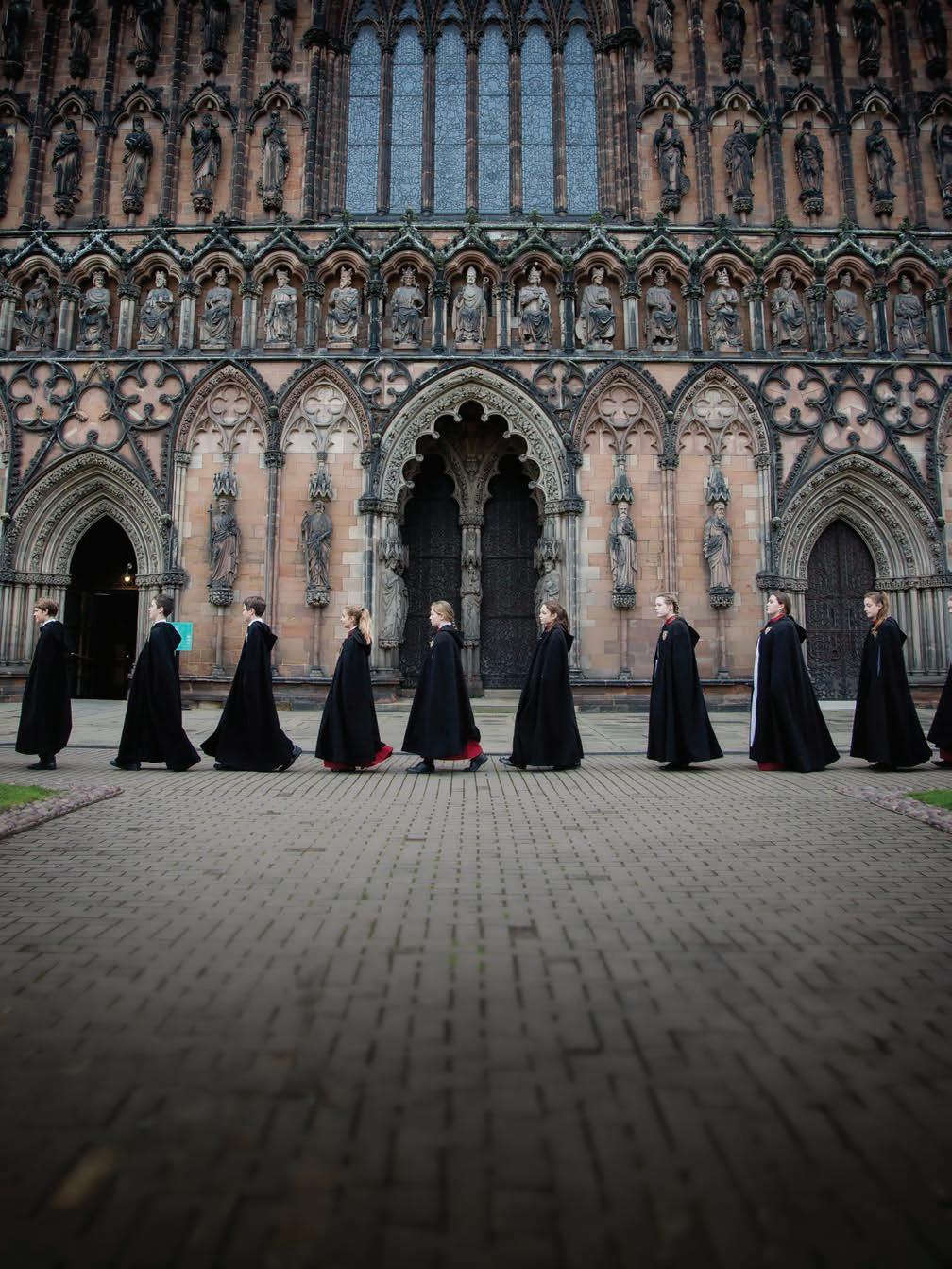
Combining unique traditions and glorious music immersion, cathedral schools also deliver an exceptional education for young people. We speak to four schools to find out more about the way they work and the opportunities they o er
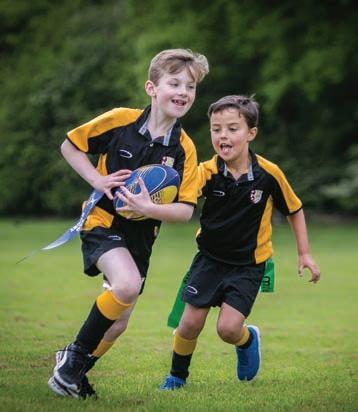
Educating some 570 pupils aged from 21/2 to 18, this ancient school began as a ‘School of Song and Grammar’ for boy choristers. Today it is a thriving co-ed day school (a near 50/50 split) and with some 45 choristers and choral scholars.
For the gifted and potentially gifted, there’s a clear admissions process that begins with an audition with sta – they make this as relaxed and informal as possible. Often children will have already undertaken relevant exams, but those without them are also welcome to audition. There is essentially the same process for choristers and choral scholars, but children applying as choristers require more involvement from parents at audition – being a chorister is a time commitment that involves the whole family.
Most children here are not choristers and choral scholars and the admissions process is more typical – a chat with the Admissions team and a school visit, followed by a taster day (or days). The school is not academically selective, although academic assessment tests are set for Year 5 and above.
Of course, music permeates school life and many talented pupils move on to specialist music schools or go on to study music or music technology at university. Many alumni continue their association with the school – singing as adult members of the choir.
The team at Lichfield say that attending a cathedral school brings a richness and depth – those values of discipline, service and joy in singing and playing permeate school life


and bring positive benefits to everyone. The close association with Lichfield Cathedral also means a focus on wider community and sharing, be that through religious services or involvement in musical enrichment.
It may have a long history, but there is nothing old fashioned about music outreach here. The pioneering MusicShare outreach programme (winner of the TES Independent-State School Partnership Award 2019) encourages participation across local primary, secondary and special schools and has reached some 25,000 pupils in more than 500 schools.
Lichfield also o ers scholarships in a wide variety of other areas, including Academic, Sport and Drama. This year, there are also generous GCSE Scholarships for Year 10 entry. Means-tested bursaries are available – and with specific bursary awards for Armed Forces, MOD, clergy and children of alumni. For parents, there’s the bonus of an almost equal boy/girl split in the school and some wonderful musical perks – including free musical instruments for Years 1-4 and free weekly music tuition in small groups.
“Music permeates school life and many talented pupils move on to specialist music schools or go on to study music”
London’s City cathedral has been educating children since 1123. At one time St Paul’s Cathedral School was more famous for acting – often performing for Elizabeth I in competition with Shakespeare’s players.
Alongside 30 St Paul’s Cathedral Choristers, this co-ed prep educates 270 pupils from Reception to Year 8. Visitors are often surprised that the three towers contain a well-equipped school, including three-storey inside-and-out playground, AstroTurf sports area and pirate ship. In a notable change, this academic year, the first girls joined the Cathedral Choir and will start boarding in September 2025 after a refurbishment to provide 60 boarding spaces. This, say the team, will make St Paul’s the largest, busiest choral foundation for children in the world.
For children who wish to be choristers, the process starts with a Zoom session






“Choristers visit hospitals, homes, and churches across the Diocese, adding to the sense of being part of something bigger”
with Cathedral Director of Music, Andrew Carwood MBE. Individual voice trials happen from Year 2 onwards and children join in Year 3 and Year 5. Trials are to assess potential, so no formal training is needed or expected. Music scholarships for day pupils are available from 11+. For remaining pupils, there is a typical process with open days and assessments.
SPCS graduates head o to a wide variety of senior schools, and with an exceptionally high number of scholarships – not just in music, but across the board. While this is good news for parents, for children there are other bonuses – not least a ‘back door key’ to the Cathedral. There are lively weekly assemblies from some of the world’s great theologians. Parents, meanwhile, enjoy the very special annual nativity play in the Crypt of St Paul’s.
Children of all faiths and none are welcome here and the team say the exposure to such great beauty in music, art and architecture sits alongside an awareness of spirituality and being part of something bigger. Most of all, the children are encouraged to see this as not just a monument, but their Cathedral. Music underpins school life and exposes them to world-class musicians. This exposure, say the team, translates into achievement in all areas.
There’s a full outreach scheme working with schools and organisations across London. Pupils also participate in notable events, including the investiture of the Lord Mayor of London. Scholarships (100%) are given to all choristers, with a means-tested bursary for boarding fees provided by The Chorister Trust. There are a limited number of scholarships for day pupils in key areas and also some bursaries.
Located beneath the famous lofty spire, Salisbury Cathedral School was founded in 1091 by St Osmund, nephew of William the Conqueror and Bishop of Salisbury. Its purpose was to educate the choristers of his Cathedral at Old Sarum, a mile away from the current site. The school has been located here in beautiful 13th-century buildings in the grounds of the Bishop’s Palace since 1947.
It is fully co-ed, with some 220 pupils ranging from 3 to 13 years. One notable piece of history was made when Salisbury Cathedral became the first CofE cathedral to admit girls on parity with boys back in 1991. More recently, it merged with Leaden Hall School, also based in the Cathedral Close, and this brought the benefit of even more space and full use of wonderful and extensive grounds.
This is a firmly non-selective school and –like most other cathedral schools – chorister places are the exception. A small number are o ered from Year 3 on. Those who would like to become choristers attend a voice trial with the Cathedral’s Director of Music. For non-choristers, admissions are based on

a typical tour and familiarisation process. Places are initially allocated to children who have joined at Nursery. Older prospective pupils undergo a taster day and assessment to ensure a good fit.
An added benefit is the access to cultural and community events, say the team at Salisbury Cathedral School. This is a place that sits of the heart of the wider community and pupils attend Cathedral at least once a week for assembly, as well as participating in civic events.
There is an active outreach programme and children get involved with other local schools. SCS choristers visit hospitals, homes, and churches across the Salisbury Diocese to perform for elderly and vulnerable members of the community, adding to the sense of contributing to the life of the wider area and being part of something bigger.
Many pupils here head on to leading West Country Schools, including Wells Cathedral School. For all pupils, there is the benefit of a small-scale setting in superb surroundings, and with a focus on academic development, alongside character development and cultural awareness. Salisbury Cathedral School o ers means tested bursaries, as well as discounts to serving members of the Armed Forces. Sibling discounts are also available.
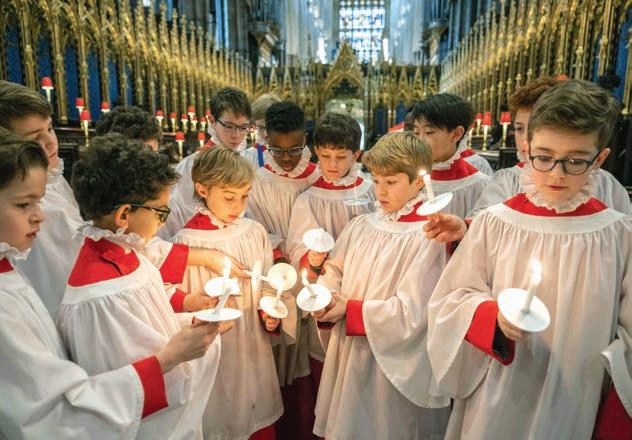
This is a unique prep boarding school – the only remaining UK school that exclusively educates choristers. It welcomes entrants aged 8 to 13 from the UK and further afield. Children go home at weekends in the first year, after which they are full boarders.
As you’d expect of a school attached to the ‘Nation’s Church’, there is a distinctive history and place in national life. While its foundation dates back to around 1560, the current building (early 20th century) is located in Dean’s Yard. Education is highly subsidised – up to 100% bursaries – and classes are very small, with a maximum of 30 choristers at any one time.

Given the requirement for exceptional musical talent, entry is a multi-stage process. It begins with an informal voice trial with Andrew Nethsingha, Master of the Choristers. If a child shows potential, they will be invited to attend a formal voice trial and a taster day. At the taster day, pupils meet the Headteacher, Dr Emma Margrett and also take part in assessments to gauge academic potential. The aim, she says, is to make sure that they will be able to juggle the demands of chorister life with the challenges of school.
The school is a foundation that sets pupils in good stead. The education provided, maturity and discipline acquired as choristers – and the musical grounding – set pupils apart. As active members of the Abbey community, pupils also benefit from wide-ranging pastoral support.
Boys here also take with them the knowledge that they have been part of historic events at the ‘Nation’s Church’ –from state funerals to the Commonwealth Service. The generous bursary scheme means this education is open to all boys, provided they have the potential and are passionate about singing.
“The education provided in such small classes, maturity and discipline acquired as choristers, and the musical grounding, set pupils apart”



Humanities may have lost out to STEM and vocational subjects in recent years, yet they develop the very human skills tomorrow’s tech-enabled world will need. We speak to three schools that champion a mind-broadening and arts-rich education

Arts and humanities subjects form an integral part of Oakham School’s Connected Curriculum, with all pupils from Years 6 to 9 studying the full suite of subjects, and with motivation to continue beyond that. “We strongly encourage our students to incorporate at least one arts and humanities subject within their GCSE subject choices, to maintain a broad diet of learning,” says Deputy Head Academic Dr Leo Dudin. The school’s curriculum is also designed to enhance students’ understanding of both the interconnectedness and transferable skills of subjects studied. “Rather than simply prescribing what a learner must know, the Connected Curriculum equips Oakhamians with skills and values, as well as knowledge, relevant to real-world situations,” he adds.
ABOVE Oakham School pupils
BELOW Art and design are celebrated here
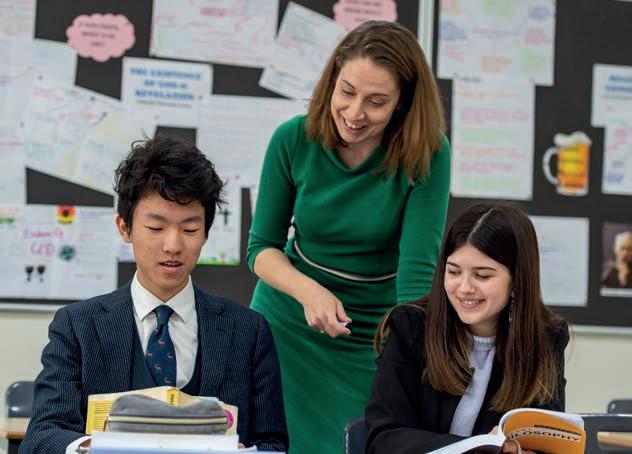
“Eight in ten of the fastest growing sectors of the UK economy employ more arts and humanities graduates than any other discipline”

Cross-curricular school days and ocampus trips are used to enhance learning and inspire connections. “The Battlefields trip to northern France that all Year 9 pupils participate in is the centrepiece around which their learning in History, Religion & Philosophy, Design & Technology and Biology is built,” says Leo Dudin. This trip then feeds back into class – for instance discussion of the ethical principles of Just War theory in Religion & Philosophy and devising designs for key medical devices (splints, evacuation products) used on battlegrounds in DT and Biology.
Torch lectures (named for Oakham School’s motto of ‘passing on the torch’) o er a series of academic enrichment lectures for Sixth Form pupils in all academic subjects by leading lights, from top university lecturers to explorer Sir Ranulph Fiennes. There are combined field trips for geographers and DT students – for instance, a visit to Italy to see both the rich farming and culinary traditions of Emilia-Romagna (balsamic vinegar, Parmesan) and its stellar contribution to high-performance transport via factory visits (Ferrari, Ducati, et al).
When it comes to supporting students in their subject choices and onward careers, Oakham focuses on strengths and wider interests. It encourages them to think about SHAPE (social sciences, humanities and arts for people and the economy) alongside STEM. “We emphasise to our students that SHAPE and STEM graduates are equally employable in the UK workforce,” says Leo Dudin. Students are reminded that eight in ten of the fastest growing sectors of the UK economy employ more arts and humanities graduates than any other discipline.
Oakham has strong A-level cohorts across the full range of school subjects, and some of its student opt to keep choices open through the broader based IB Diploma. Like all young people, Oakham students keep a watchful eye on future careers.
“Students tend to be worried about earning power,” says Oakham Head of Careers and Progression Dr Rachael Pearson. “I always stress that 70%+ of graduate jobs don’t require a particular degree type. We also talk about transferable skills – art and music make you dextrous and that’s what you need to be a surgeon!”
Students just have to take one look at the news every single day to see why it’s increasingly important to study the Humanities,” says Hurst College’s Head of Humanities Rebecca Bownas. “Sta celebrate the career pathways that these creative subjects lead to, as well as the key perspectives and many transferrable skills gained from studying them.”
Humanities are a compulsory part of the pupil timetable up to Year 8, while at GCSE subject blocks are structured to allow students to freely pursue their own interests and select multiple arts and humanities options. At A level, the humanities are “sold” as bringing the world to life. Students are encouraged to see the value in having the opportunity to debate and reflect on our pasts, presents, and futures at a much deeper level.
Creative and performing arts also get top billing at Hurst College. Annual dance and drama productions, musicals, and multiple choirs, year group bands, and dance ensembles are available to every single pupil, whether they favour STEM or humanities and arts subjects – adding to young people’s options, depth of experience and knowledge, and opportunities to maintain interests and talents. “We are strong advocates of the countless benefits of pursuing the arts at A level and beyond,” adds Cyrus Dean, Head of Creative and Performing Arts Faculty.
Cross-curricular opportunities are fully exploited through the College’s busy annual calendar of local and international trips. Recent destinations have included Krakow and Auschwitz-Birkenau (History and Politics), Naples (Geography and Classics), New York (Dance), and Wales (Choir Tour). Hurst believes field trips play a vital role in developing pupils’ curiosity, understanding and analytical skills when navigating the world beyond their school.
The Creative and Performing Arts Faculty is structured to allow for cross-disciplinary exploration between linked subjects, such as
ABOVE Mayfield
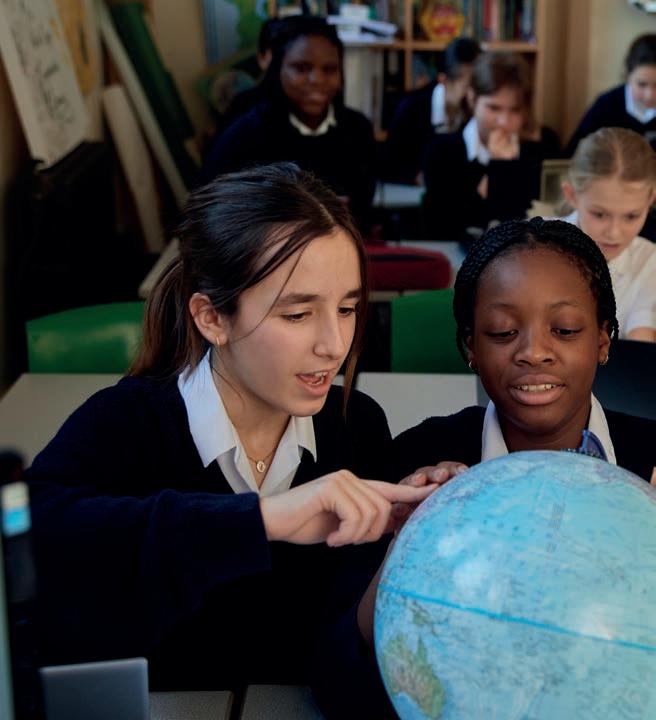
Music and Music Technology, Art and Photography, and Dance and Physical Theatre. The team add that pupils’ understanding and enjoyment increases greatly, as they learn to appreciate the enriching and collaborative nature of related subjects.
Many students at Hurst choose to take humanities subjects on to further and higher education. Two leavers have recently received unconditional o ers from London Contemporary Dance School and Trinity Laban Music Conservatoire, while the majority of this year’s Cambridge o ers have been for humanities courses.
Head of Humanities Rebecca Bownas has no doubt a broad grounding in these subjects is invaluable, whether or not children choose them for university or further study. “The skills gained from the arts and humanities – critical thinking, social awareness, ethical and moral considerations – make for adaptable, employable individuals in the professional world.”
“The skills gained – critical thinking, social awareness, ethical and moral considerations – make for adaptable, employable individuals”
Mayfield founder Cornelia Connelly believed all subjects were equally important, a philosophy that continues to underpin the curriculum design to this day. Creative teaching is a strong suit, and Music and Drama lessons are joined by a unit of dance through the extensive PE curriculum. Pupils develop their skills in Ceramics and Textiles alongside Art. “The school corridors,


classrooms, o ces and other communal areas are filled with displays of the girls’ creative work, showcasing their value throughout the school,” says Mayfield Deputy Head Academic Annabel Bunce.


Dr Joanna Weddell, Head of History of Art, is a big fan of the new Edexcel A level for its range and scope. “It o ers traditional historical study of periods such as the Renaissance, and also gives us the freedom to cover diverse artists – we find students are very enthusiastic about this aspect of the course.” One important element of the learning is that it is related back to broader themes and debates. “We design their studies to connect to the world they live in now, for example, giving them historical perspective on the long history of women artists,” says Joanna Weddell. “In the broad ‘Themes: Identities’ topic we can engage with controversial contemporary debates, such as those critical of empire and public sculpture.”
Mayfield sees the first two years of senior school as the ideal time to broaden horizons and spark interests. “If you can instil a ‘give everything a go’ attitude and encourage pupils to step outside of their comfort zone, as well as discover new talents, positive behaviours are formed that will stand them in good stead throughout their lives,” says Head of Lower School Claire Baker. There’s a big focus, too, on building soft skills – teamworking, resilience and
“Arts and humanities are an expression of a set of skills that can be adapted to a career that might not even have been invented yet”
problem solving – through challenges and projects. “Each term we run a themed cross-curricular day, with recent examples including Earth Day, Moon Camp, Code Breaking, and the Cookie Project, when girls are taken o timetable to explore topics in greater depth and bring to life the links between subjects,” adds Claire Baker.
The Cornelian lecture programme features a diverse range of speakers –from polar explorers and journalists to sustainability experts. Students are also encouraged to enter external competitions. Students recently received prizes in the Royal Geographical Society’s Young Geographer of the Year and ART UK Write on Art competitions. Joanna Weddell says competitions are a good way to encourage young people to pursue specific interests.
Head of Sixth Form John Doy says that continuing the broad enrichment
and extracurricular programme at 16+ encourages students to keep up engagement with subjects they are not studying at A level. Weekly classes enable students to cover everything from modern foreign languages to social sciences/sciences and analysis of authors’ works. There are activity slots for the lively range of clubs,. Everyone in Sixth Form engages in weekly Critical Religion classes to discuss the really big issues.
When it comes to looking at onward study and careers pathways, there’s a supportive and open approach. “As an Arts graduate myself, I am very encouraging to students interested in arts and humanities,” says John Doy. “Very few people end up doing work related to the specific subject matter of their degree – these qualifications are best seen as an expression of a set of skills that can be adapted to a career that might not even have been invented yet,” he adds.

An innovative and nurturing environment where every child is encouraged to find and fulfil their potential.

Since two thirds of current school pupils are likely to work in jobs that do not yet exist, it is vital for schools to prioritise opportunities to build resilience, independence, and motivation among young people. At Berkhamsted – the group of independent schools in Hertfordshire – we promote independent learning and metacognition throughout a pupil’s educational journey.
At the start of this journey, pupils at Berkhamsted Pre-Prep develop a basic understanding of how their brains work through core neuroscientific texts that shape this learning. Once they progress to Prep, further development of metacognitive strategies and the science of how we learn is taught, providing a greater understanding of their agency over their own learning and how they can develop core skills. Evidence shows that pupils who have strong metacognitive skills can make an additional seven months+ progress over an academic year.
While metacognitive concepts are woven through the curriculum throughout the school years, it’s in their final years of senior school that our pupils enjoy lessons dedicated to the subject. Years 10 and 11 complete a two-year Learning Pathways programme comprised of Guided Discovery and Coached Study. Learning Pathways prepares pupils for the self-governed approaches of Sixth Form and university, and the world of work.
During Guided Discovery, pupils steer their learning as they pursue a topic (choosing from
“Allowing pupils autonomy means they turn up to class eager to discover more and develop a passion for learning”

Applied Science, Digital and Creative Media, Global Perspectives, and Human, Social, and Political Sciences). They complete their own TED-Ed-style talk, a university-accredited FutureLearn course, and can complete the Higher Project Qualification (a dissertation-style project) on the topic they choose.
The Coached Study pathway builds on this independent learning style as teachers introduce neuroscientific texts such as James Clear’s Atomic Habits and Robert Bjork’s Desirable Di culties, each steering pupils to become self-regulated, adaptable people who know how and why they learn. Teachers also introduce revision methods –from Cornell note-taking to flashcards – to help pupils discover how they best retain information. Beyond helping pupils succeed in exams, this trial-and-error approach to learning equips pupils with soft skills, such as resilience and self-management. Why would a school of qualified teachers encourage pupils to conduct and discover their own learning? Based on research
by motivation expert, Daniel Pink, human motivation is not derived from external rewards like good grades. Instead, it stems from the opportunity to pursue our interests. Allowing pupils this autonomy means they turn up to class eager to discover more and develop a passion for learning beyond their school years.
In a dynamic world, young people’s ability to be flexible, self-directed, and motivated will be the key to their success. By handing pupils the reins when it comes to their education, schools can ensure they become intrinsically motivated to work, learn and adapt, wherever the future takes them.
 GODMAN
GODMAN
Joint Assistant Head Berkhamsted Sixth & Head of Learning Pathways


Throughout my 15 years as a pastoral lead in an all-girls’ senior school, I have witnessed first-hand the transformative power of all-girls’ education. The environment fosters a unique culture of empowerment, selfdiscovery and academic excellence, enabling young women to reach their full potential.
Recent data provided by the Girls’ Schools Association (GSA) has shown that students in girls’ schools consistently outperform their peers in co-educational institutions when it comes to academic achievement. This is attributed to the single-sex setting, which allows for a dedicated focus on girls’ learning styles and interests without the distractions and gender dynamics that can sometimes hinder them in co-ed settings. All-girls’ schools provide a nurturing environment where students feel confident to take academic risks and challenge themselves. They also pursue more STEM subjects, in general, than in co-ed settings.
At Marymount International School London, students are encouraged to celebrate each other’s triumphs, own their individuality and pursue their aspirations without fear of comparison. This supportive atmosphere cultivates a strong sense of selfbelief and confidence, empowering them to believe in their abilities and express their ideas with enthusiasm.
Our students show a fearlessness when tackling problems, whether in the
“By empowering girls to take charge, we provide a platform for them to hone their leadership skills and be role models for each other”

classroom or when considering global issues through Model United Nations or service programmes. They are praised for the sportsmanship that they show towards each other, which gives me great hope for what their futures hold.
By nurturing leadership qualities and empowering girls to take charge, we provide a platform for them to develop and hone their leadership skills, to be role models for each other and inspire those who come after them to be aspirational and inspirational. The emphasis on female role models and mentorship encourages girls to step up and take initiative, a mindset that prepares them for future success in their careers. As they build resilience and emotional intelligence, navigating life’s challenges is more achievable.
As to the question of whether girls are limited in a setting without boys, the answer is that we can be creative in our approach – finding ways for girls to collaborate with boys and yet maintain the academic excellence of their all-female environment. Marymount is part of a global network,
RSHM, which includes both all-girl and co-ed settings. This gives us opportunities to socialise and collaborate with boys outside of the school classroom through sporting, arts and MUN Festivals held in various schools around the world.
The challenges that young women face as they enter employment are still present in 2024. This requires a holistic approach to their education, where they are supported to be whatever they aspire to be. This enables them to hold their place in a world that will benefit from the skills expertly nurtured by an all-girls’ environment.
 ANNAH LANGAN
Deputy Head Pastoral
ANNAH LANGAN
Deputy Head Pastoral



– which recently won ISA Boarding School of the Year –reflects on what makes a great live-in experience
Every now and again I have the pleasure of meeting with boarding alumni, some of whom were boarding at the school before I was born. I very much enjoy listening to the stories of their time at the school and how things used to be in the good old days. Perhaps unsurprisingly, they never seem to mention the quality education that they received here over a number of years, but they do take great delight in reminiscing about the homely chaos of twenty students sharing a dorm, battling cold showers in the depths of winter, also recounting various tales of clandestine midnight mischief.
Times have changed. Legislative standards are constantly being raised under the umbrella of safeguarding and schools are increasingly on the lookout for an edge within a competitive market. This has led to increasingly fanciful facilities and promises of blankets of smothering support whenever a child displays a hint of emotion. I feel sorry for those students opting into some new build boarding facilities, which appear to have all the ambience of a Travelodge. They are missing out on the essence of a great boarding experience –communal living and shared experiences.
Yes, a dorm needs to be clean, safe and comfortable, but an espresso machine isn’t going to one day be the best man at your wedding. Yes, a boarding programme needs to be well organised and administered, but spreadsheets don’t make you laugh until you
“The best boarding schools fi nd a balance between risk and experience in order for young people to flourish both within school and on into their adult lives”

cry (unless you’re a bursar). Yes, we need to make sure that safeguarding of students is a priority, but keeping them under constant lock and key is akin to keeping a lion cub in a cage before releasing her and expecting her to have accumulated the necessary skills to survive in the wild. The best boarding schools find a balance between risk and experience in order for young people to flourish both within school and on into their adult lives.
Communal living creates memories. Investing time and resources in social events, trips and fun activities is vital and young people will deposit those memories into a bank that they can draw upon for a whole lifetime. Communal living also creates problems for young people to work through – this is as important as what they learn within the classroom.
Ensuring that our boarding students are able to develop independence and resilience within a highly legislated environment is complicated. We want students to learn how to manage their own wellbeing and problemsolve for themselves. This sometimes requires a lighter touch than metaphorically wiping their noses for them at the first sign of a sni e. Ultimately, we want our boarding students to be happy, successful and to leave
us with a sense of belonging, so that one day they will be the ones returning to campus and reminiscing for all the right reasons.
My favourite day of the TASIS England school year is senior graduation, and that’s not just because it’s the final hurdle before an epic summer holiday. It’s special because so many of the students cry their eyes out – that’s because they are sad to be ending a significant chapter in their young lives. Communal living ensures that this chapter is not a grey monologue, but a creative collage of shared experiences. We, as boarding schools, must never lose that sense of shared belonging – it lies at the heart of what we are and what we provide for our young people.

 MATT KIELY Director of Boarding TASIS England
MATT KIELY Director of Boarding TASIS England









Pastoral excellence and rich education opportunities create happy boarding experiences, says Duke of York's Royal Military School
At Duke of York's Royal Military School (DOYRMS), we always recommend parents considering boarding look for schools which o er comprehensive education while also showcasing excellence in their pastoral support.
This necessitates a significant focus on pastoral care, incorporating initiatives tailored to establish a secure and nurturing environment while providing comprehensive and compassionate care for the wellbeing and personal development of students. Such an approach enables students to concentrate on their academic pursuits while feeling supported, valued, and appreciated – and with a sense of belonging in a caring community.
“Pastoral excellence enables students to navigate challenges, build strong interpersonal relationships, and develop essential life skills”
Integrating academic, social, and personal support into a comprehensive care system administered by a committed and experienced team – including houseparents, academic tutors, and matrons – allows students to make remarkable progress in all aspects of school life. Pastoral excellence also involves creating a supportive environment where students are encouraged to thrive, not only academically but also socially, and personally.
The boarding house system should be structured to enable students to

discover a feeling of connection and camaraderie. Regular communication between the boarding house and home is vital. Parents and houseparents need to have a solid and strong relationship to ensure seamless support for the child in their care. This approach is evident at DOYRMS, where you will find students having a co ee with a houseparent, playing ping-pong with a matron or laughing over lunch with their teachers and peers. Here, our teachers take on dual roles as houseparents and academic tutors within the boarding house, further emphasising the school's commitment to both educational excellence and the wellbeing of students.
DOYRMS is characterised by small class sizes and the promotion of an active lifestyle. Our emphasis on instilling leadership qualities and life skills prepares students for the challenges of the world beyond education. Rooted in military



heritage and ethos, the school was originally founded to support the education of military orphans, a tradition that continues to shape our values today.
When considering boarding schools, parents would also do well to consider the boarding basis and student numbers participating in each of the boarding options. Here, all students board, eliminating the mass departure of day students during weekends and evenings. Parents should also explore how they can keep in touch with their child – Wi-Fi availability and exeats are important elements.
 FOREMAN Principal Duke of York's Royal Military School
FOREMAN Principal Duke of York's Royal Military School
Fundamentally, parents should search for a boarding school that provides pastoral care with a focus beyond academics. This is integral to creating an atmosphere that enables students to navigate challenges, build strong interpersonal relationships, and develop essential life skills.

Tonbridge School, Head of Classics, he studied Classics at Oxford, where he later worked as a lecturer in Latin and Greek before becoming a teacher. His favourite things in Classics are the epic poems of Homer and Virgil.
Studying the ancient world delivers rich insights into our distant past, alongside thoroughly modern and transferable skills. Two experts in the field give their elevator pitch on why Classics is worth studying, and where it can take you

Maida Vale School, He studied for a BA in Classics and an MA in Linguistics at University College London. He specialises in Latin and Greek and is particularly interested in their historical development and their modern teaching methods
What makes Classics so brilliant?
JB: It takes you into other worlds where the values and mindset were completely di erent from nowadays. Imagining and exploring those strange worlds is fun; it also gives you a perspective on the modern world.
JH: Classics puts students in touch with something larger than themselves. Parts of the subject have been taught in an unbroken tradition for over two thousand years. Classics develops your understanding of humanity: the great span of our civilisation, the universals and particulars of our thought, and your own small but important role to play in our continuing history.
What made you choose it?
JB: I enjoyed the languages, but what really made me want to study Classics at university was the fabulous literature of Rome and Greece.
JH: Many people never get the chance to study it, others find it boring or di cult. I wanted to stand out.

FAMOUS CLASSICS STUDENTS
Chris Martin, J.K. Rowling, C.S. Lewis, Boris Johnson, Tom Hiddleston
5 TOP SPOTS FOR DEGREES
Oxford, Durham, Cambridge, University of St Andrews, UCL
WHERE CLASSICS
BRAINS HANG OUT
The British Museum, Vindolanda in Northumberland, all corners of the Mediterranean
Transferable skills and knowledge acquired?
JB: The subject encourages students to develop a close attention to detail, the ability to analyse di cult material, and the imagination to reconstruct lost worlds. Studying the Classics is nothing less than examining the roots of western civilisation.
JH: Classics is the king of interdisciplinarity. You learn how to solve problems methodically, how to memorise and deploy information, and how to critically analyse content. You also get a crash course in European languages and the history of ideas.
"Classics is the king of interdisciplinarity –you learn how to solve problems methodically, how to memorise and deploy information"
What pathways does it open?
JB: Classics has traditionally been a favoured route into the legal profession, the civil service, the City and academia. But, in fact, classicists have a very broad and rigorous training, so they can (and do) go on to do almost anything.
JH: All of them and none of them. Outside of education, there are no careers that require a classical education. Instead, it represents a broad base of skills and knowledge, providing an edge in a competitive world – on any path.
Two things students may not realise Classics covers...
JB: Visual art (painting, sculpture, architecture) often features. Archaeology helps us learn new things about that world all the time.
JH: The structure of communication – a reflection of the structure of the mind. North Africa and the Near East.


If you had a month with a bright group of pupils, and could teach them anything, what would you choose?’ When interviewing teachers, this question tells me more than any other about a candidate’s suitability for the job. Some teachers’ eyes light up when considering the question and others look panicked. Some teachers make me want to have been taught by them, and I’m pleased for the pupils that will have that chance in the near future.
My question always refers to the individual’s subject; but what if you could
teach literally anything? What are the things you believe pupils should be exposed to, but are unlikely in the general course of things to come across? What books, authors, works of art, ideas, concepts, figures of history, music, culture, and ways of living would you wish to choose when presented with a blank canvas?
That is the challenge presented to around ten Wellington teachers each year, who design a bespoke Fragments course for a seminar-sized group of interested pupils. Taking inspiration from a single line in T. S. Eliot’s The Waste Land – ‘These fragments I
“Not all learning must be assessed, and the freedom associated with a non-examined course should be celebrated”
have shored against my ruins’ – the teachers design a 30-week course around a single loose theme. The learning experience is woven with this theme at its centre and the teacher needs to allow the course to be tight in some places and to bulge out in others. It is not so much about delivery of content as exploration of ideas. We also seek to maintain the assertion that not all learning must be assessed, and the freedom associated with a non-examined course should be celebrated.
There is power in knowing that each class studies a unique course. It is a clear rejection of the assumption that curriculum is laid down by examination boards or the DfE, and that teachers have little choice in what is taught.
Themes for this academic year include Images, Colour, Edges, Rebellion, Connections, Letters, Lives, Roots, and Counting to 10. My course is Nine Songs, with music ranging from Dimitri Shostakovich to MF Doom. The songs act as gateways into topics, and we have turned Edward Hopper’s paintings into cinema stills and built storyboards around them. We have learnt to dissect classical music, created updated versions of Irish band A House’s “Endless Art”, and explored the concept of heroism through the exploits of Ross Smith. We will embrace ideas of modern identity before heading back to the 18th century to explore political satire in painting.
Some expected ‘winner’ topics will fall flat and other more risky choices will be embraced, but we understand that seeds are being sown for the future. Some of these seeds will not germinate until conditions are right – perhaps a few years hence. But if the experience of school is supposed to be inspirational, I can think of few more obvious ways to demonstrate a commitment to that aim.
 BENJAMIN EVANS Deputy Head (Academic) Wellington College
BENJAMIN EVANS Deputy Head (Academic) Wellington College

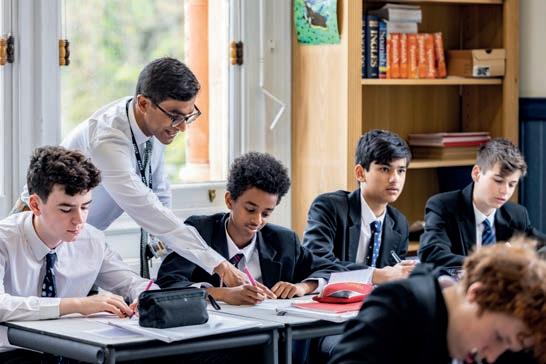
With Artificial Intelligence now commonplace and accessible to anyone with a smartphone, Large Language Models such as ChatGTP can quickly scrape data from the internet and process text in order to provide suggestions for everyone – from head teachers seeking inspiration for assemblies to teenagers looking for shortcuts to more traditional research when writing essays.
It may be tempting, given the direction and magnitude of these radical technological developments, to regard mathematics, physics and computer science as the subjects which best prepare today’s students for further study and the world of work, since they train students in analytical and practical thinking grounded in STEM.
However, it can also be argued that modern and classical languages provide just as important and stimulating a challenge to the intellectually curious, requiring logical thinking, the identification of patterns and anomalies, an appreciation of context and nuance, and no little creativity and imagination.
Learning languages also provides the benefit of unlocking a sense of culture, history
and identity, informing disciplines as diverse as psychology, politics and economics.
Understanding ‘other’ languages is also hugely beneficial, of course, to understanding our own language, aiding communication and helping build a linguistic framework against which to weigh the power of words – whether used well, or misused – and in today’s world nothing could be more important than finding clarity, truth and meaning in our own thoughts, and in our relationships with others.
At Dulwich College we are committed to the importance of language learning, with one fifth of the curriculum in Year 7 split across French or Spanish, Chinese and Latin. This gives our pupils a rigorous grounding in three very di erent languages in order to set them up for the study of at least one foreign language to GCSE and, for many, success in languages at A level and beyond.
Typically, 10 of our Year 13 leavers go on to study a degree in linguistics, languages, or with a language component or study abroad, with 2023 university destinations including Philosophy and Spanish, and Italian and Linguistics (both at Oxford), History and Spanish at Bristol, and French and Spanish at St Andrews.
Language learning, of course, requires excellent teachers. Dulwich College is committed to training the Modern Foreign
“MFL are beneficial to understanding our own language – helping build a linguistic framework against which to weigh the power of words”
Languages (MFL) teachers of tomorrow and is the South East London hub for the National Modern Languages SCITT programme. In our six years as a hub, we have trained over 60 new teachers and helped to tackle the national shortage of MFL teachers.
This programme is fully supported by Dulwich College’s MFL Department who share their wealth of experience and passion for languages with the SCITT trainees. Through this programme, we have developed strong partnerships with around 50 state and independent schools in the local area where our trainees carry out their teaching placements. Many of our trainees are employed by their host schools, which value their strong language skills and the high calibre training that they receive.
In a globalised and increasing fragile geopolitical environment, young people who can forge genuine, human connections with others – without the barriers created by technology – will thrive to their own benefit. This same group will be well placed to find new solutions to the social and economic problems we will continue to face in the years ahead.

ANDY THREADGOULD Deputy Master Academic Dulwich College


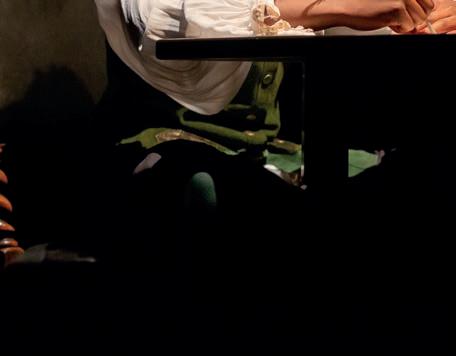


 Role Model
Runner
Role Model
Runner
The Principal of Concord College, on the need to support students’ complex problem-solving skills while also ensuring success in traditional exams
As an educator I feel fortunate to work with the bright and highly motivated children who come to Concord. I regularly consider whether the assessment systems we have, and particularly the exam systems we must work within, are doing their jobs properly. Are they assessing the skills that really matter in our digitally and globally connected world?
The World Economic Forum publishes a report called the Future of Jobs, which outlines the core skills identified by modern employers as of fundamental importance. In the 2023 report, we find in the top three places: analytical thinking, creative thinking and resilience, flexibility and agility. All these skills boil down to a common theme: complex problem solving.
Employers want solutions to real-life problems, and real-life problems are unpredictable, multi-faceted and dynamically changing things. Our pupils – the employees, entrepreneurs, doctors, economists and leaders of the future – will need to think on their feet. They must adapt to changing parameters, think creatively and be equipped with analytical strategies that break down a large problem into smaller, simpler units that can build towards to a full solution.
This is music to the ears of Maths and Physics teachers, who will argue, reasonably, that the realm of complex problem solving is exactly what their subjects involve. Beyond


“The employees, entrepreneurs, doctors, economists and leaders of the future will need to think on their feet”
STEM, however, I can find important elements of complex problem solving taught across the school curriculum. From devising the staging of a play in Drama (and conveying abstract concepts or feelings) to learning lessons from history or considering how big data can influence geopolitical policy, our students are challenged to address hugely complex ideas.
To some, success at school might appear to require only success in a system of public examinations that test and reward recall of knowledge first and foremost, at a time when knowledge of facts is of

DR MICHAEL TRUSS Principal Concord College
declining value. I disagree, since I believe that the two are not mutually exclusive. Leaving aside the very important idea that a doctor, for example, still needs to understand and remember a huge body of knowledge and make life-or-death decisions – hopefully without the need to consult their mobile phone – exam-based curriculums are being developed to test and reward analytical thinking and unseen problem-solving. And guess what? These are the parts that even the most capable students can find di cult. At Concord we encourage participation in a wide range of super-curricular activities as well as concentrating on the more di cult aspects of the school qualifications. “How do I get an A*?’ is something we hear all the time. Our answer: practise the bits you find the hardest and value the other things you do. Subject-based Olympiads, performing in the College musical, debating in our Model United Nations competition, organising charity fundraising – they all matter. And, as they all involve complex problem solving, they will all contribute to that A*.

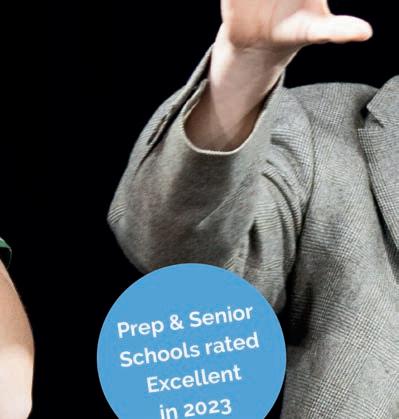






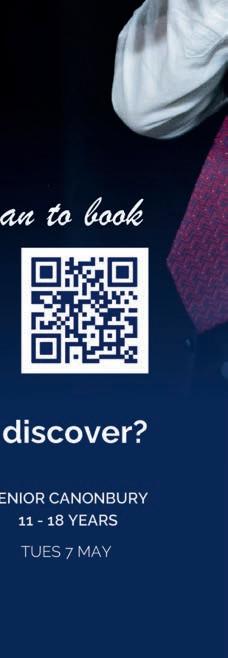

State boarding is one of the country’s best kept secrets, until now, as more parents are recognising the education and opportunities state boarding o ers. Wymondham College is the largest state boarding school in the country and is an example of what these schools can o er.
Being a state school means the education is free and only boarding fees are payable, without compromising on the quality and opportunity. State boarding schools also adhere to national standards and are rigorously inspected every three years by Ofsted.
Wymondham College was recently graded ‘Outstanding’ by Ofsted in all nine categories across its education and boarding provision – believed to be a first in the country under the new Ofsted inspection frameworks. It reflects the College’s high academic standards
and achievements, with students going on to study at Oxford and Cambridge.
The Boarding element is enhanced by a programme of enriching activities – and it doesn’t stop at the weekend. Wymondham College has over 70 activities a week. Children enjoy paddle boarding, kayaking, horse riding, water polo, debating, coding and much more. Despite being a state school, it also competes in the independent schools’ sporting fixtures and tournaments in boys’ and girls’ rugby, football, cricket, hockey, netball, athletics, swimming and tennis, with many victories and an impressive trophy cabinet.
In addition to the weekly activities, this year students have enjoyed trips to New York, Disneyland, Iceland, plus skiing in Austria and safaris in Kenya. They have also learnt to scuba dive in the College's onsite pool before going on to achieve their open water qualification in Malta. Boarding is a home from home, with younger children
“Children enjoy paddle boarding, kayaking, horse riding, water polo, debating, coding and so much more”
often sharing rooms, and moving up to the independence of ensuite single dorms in the Sixth Form. Wymondham College has seven boarding houses, each with a team of specialist residential sta . There is one Prep boarding house, plus five Senior boarding houses. The bespoke Sixth Form Boarding house is akin to a small university campus, with its own dining room, reading room computer suite, atrium for study and recreation, and a piazza and wellbeing garden. All Wymondham College houses are within its 83-acre site surrounded by stunning Norfolk countryside. The mix of children and residential sta creates a family environment where older children help the younger children with prep and read bedtime stories.
The rhythms of a boarder’s life support a well-rounded and healthy lifestyle, enabling children to grow and learn in a safe environment. From sitting down to do their homework every evening and activities before and after supper to learning to making friends from all around the world – there are benefits to boarding that cannot be gained elsewhere.
wymondhamcollege.org


Perthshire school Glenalmond makes full use
of
its natural advantages with its recently redesigned outdoor education programme
Many independent schools are located in spectacular settings, but few have quite as many natural assets around them as Glenalmond College. Located in the Perthshire countryside on a 300-acre campus, in an area often referred to as gateway to the Highlands, it has mountains, rivers and wild habitats galore around it – so heaven for adventures and exploration.
Learning outdoors has always been embedded in life at the school, but Glenalmond recently relaunched its Outdoor Education programme. The aim is to help children go way beyond the typical outdoor taster or experience. “They actually
have the chance to be good at it – so the pastimes can develop expertise,” says Head of Outdoor Learning Tom Mason.
This is particularly valuable for young people keen to aim high with climbing – there are nine crags close by that o er brilliant experience in snow and ice. The school is one of only two in the country to o er the Mountain Training Skills Award. For rock
“Conservation has as much value as climbing a Munro with this programme”
climbers, there are some 12 venues within an hour of the campus. This has long been embedded in the school’s games programme, and with time and space to develop as an independent or competitive climber. Mountain biking is superb across the local area and canoeing or kayaking in the local lochs o ers challenge and exhilaration aplenty. The redesigned Outdoor Education programme has a strong element related to conservation – with some projects involving local charities. This gets children immersed in the local landscape and increases skills and understanding. It includes opportunities to take ‘ownership’ of specific areas to improve them and complete a John Muir Award (named for the Scottish-born naturalist and conservationist). This element is important to young people and also feeds into other
“The people instructing them are our teachers – the same relationships from the classroom go out into the outdoors”
elements at the school, such as the BTEC in Land Management. “Conservation has as much value as climbing a Munro with this programme,” says Tom Mason.
Children are introduced to this smorgasbord of options in Third Form by participating in Adventure Days and Sunday activities. As they try things out – camping, abseiling, climbing, orienteering – they discover strengths they didn’t know they had and can decide what to take further. This can lead on to the DofE programme – Tom Mason says that’s certainly a benchmark but far from the end point. “Some things on o er are beyond DofE – that’s really important in how we di erentiate ourselves.”
Another di erentiator is that many Glenalmond teaching sta are skilled and passionate about outdoor pursuits and lead the action. “The people instructing them are our teachers – the chemistry teacher, maths teacher, English teacher. The same relationships from the classroom go out into the outdoors – it’s not about bringing in external providers.” As well as developing real expertise, this helps children to see their tutors in an entirely di erent light. This then feeds back into the classroom. After all, if your chemistry teacher got you calmly

and safely up that rock face, you’re probably going to listen carefully to his revision advice.
Then there is the spirit of camaraderie between ages and stages – this can happen more easily outdoors during group activities. “It’s really nice on a Sunday when we have mountain biking, where you have Sixth Formers riding with the First Form pupils. Those skills are so hard to teach in any other environment – you see that conversation that might not happen in any other context. They feel comfortable talking to each other.”
Tom Mason is clear on the really big reason outdoor learning matters – and it’s not about countering screen time or sedentary lives. “Most of our experiences are voluntary, so children are doing them not because they have to but because

it’s fun. There’s an enjoyment in being outdoors, learning something new. There’s an enjoyment of being a little bit scared and of trying a new activity with friends.”
He also doesn’t dwell on the traditional ‘worthy’ reasons of growing perseverance and resilience – he says there are numerous ways in which Glenalmond does all those things all the time. “We all get better and learn faster when we’re having fun. I want kids to see a focus on outdoor education not as a hardship, not as simply something that’s good for you,” he says. He’s probably in a better position than most to know what this fun can do for young people over the long term. “I did these things in school, and I’ve not stopped doing them! I think fuelling that passion early is the way to fuel that lifelong love.”


The Head of Queen Anne’s School in Caversham on the priorities for education in a world where we don’t know what technology is to come
When I interviewed for my first headship in 2006, I remember speaking about how exciting it was to be preparing young people for a world we do not know. Now, 18 years on, those youngest learners at Ipswich High School are on the cusp of leaving university, possibly taking a gap year or embarking on their careers and entering the workplace. The world has made a gargantuan turn in those intervening 18 years.
As a young mum myself in 2006, one of my concerns was that our children might be having too much screen time – which back in the Noughties simply meant children’s television and DVDs. Technology was becoming smaller, faster, more accessible – this was seen as a positive. In schools, computers and internet were being widely used, primarily in IT suites.
Mobile phones could phone and text, but not much more. The first social media platform (Myspace) was being used by teenagers as a way of connecting with groups of other young people beyond the school day. The iPhone was still a year away from launch. Most exams would be handwritten. Oxbridge interviews were conducted in person. It was still a relatively simple world. Fast-forward to 2024 and our postsmartphone, post-pandemic world: TikTok, streamable content, Wi-Fi, Netflix, smart watches, BeReal, AR, AI, remote learning,
“Much of the ‘heavy lifting’ will be streamlined – what will remain and be increasingly valued are the human elements”

Deliveroo. The list of technology innovations is extensive and the way we conduct our lives, communicate, learn, work, shop, connect and interact has changed dramatically.
So, what next for the world of work? Our 2006 school-starters now entering the workplace have the distinct advantage of being digital natives who have grown up with all of the exciting emerging technology. The same will be true of current generations of school leavers, but my question here is around the landscape of work. What will the world of work look like for our students starting school, both at primary and secondary level, right now? Where will we be in 2042?
Inevitably, as AI becomes increasingly powerful, much of the ‘heavy lifting’ in all manner of fields will be streamlined and, in some cases, completely eradicated. What will remain and be increasingly valued are the human elements – creativity, empathy, discernment, judgement, verbal communication. Also highly valued will be the ability to convey ideas, persuasive skills, adaptability
and complex problem-solving. Knowledge and understanding will continue to be prized, particularly in the context of information-overload and the need to make sense of the world around us. There may well be more working from home, shorter working weeks, more distributed childcare and more free time.
In response, schools are already adapting to the needs of the future workplace – many schools integrate digital learning into the classroom, showing students how to manage their learning in an e cient and e ective way. Some schools, such as ours, are embracing interdisciplinary learning, where students have opportunities to make connections between subjects and ask bigger questions.

 PURVES Head Queen Anne’s School
PURVES Head Queen Anne’s School
Above all, schools must continue to emphasise the human elements through their teaching and learning, giving students the tools to be agile, creative and responsible in a workplace characterised by continual change.
Education for a world we do not know continues to be an exciting challenge.
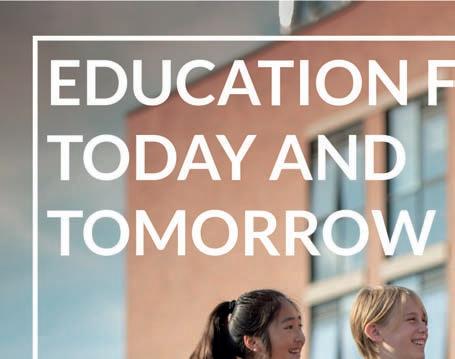

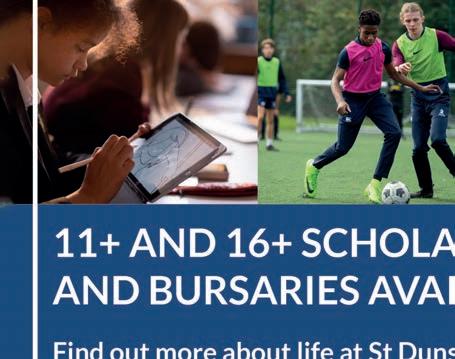




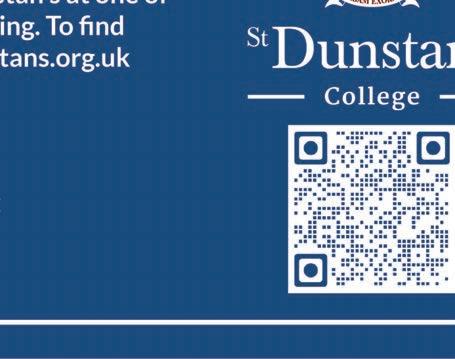
Over the final week of January in the cold Surrey Hills, I took to the outdoors and camped in several unusual places around the school campus: hidden in the woods; right next to the car park; high on an exposed side of the theatre; in a suspended tent dangling from the high ropes course. Why? To raise awareness and funds for a local charity, but on a higher level, to show that taking risks to support others is a great life lesson.
Teaching is so much more than the ‘in classroom’ experience, and outdoor education has always been an essential part of my life and career. By grabbing people’s attention, raising the profile of the school charity (Guildford-based The Fountain Centre) and raising over £10,000 in the process, I hope I have appealed to the imagination and intuition of my students and shown them that leading comes in all shapes and sizes.
My lifelong love of outdoor education began in 1977 when I attended Timbertop; Geelong Grammar’s year-long outdoor education programme in the Victorian highlands of Australia. It was largely modelled on the work of Kurt Hahn, founder of Gordonstoun, and at Timbertop I learnt that I was stronger than I ever could have imagined, both physically and mentally. I learnt that I could plan and manage risk successfully. Essentially, I learnt who I was, how I functioned and what I could achieve,
“Students learn to deal with both success and failure and to get back up and try again each time – they learn to be authentic”

even when I thought it impossible. The experience had a resounding e ect. The references back to those experiences remain strong even now, 47 years later.
At Frensham Heights, outdoor education is an intrinsic part of our curriculum, from Forest School in the early years through to high-altitude expeditions for the older students. The programme for all activities begins with learning the specific skillset needed for this experiential learning – the real adventures. As their practical skills develop and their experiences widen, students develop massively in confidence, empathy, resilience, collaboration and communication. They take turns leading – running the budget, standing up and making critical decisions. Our main outcome is to develop the students’ self-confidence and sense of pride, their ability to step out of their comfort zones and not be afraid to make mistakes. Students learn to deal with both success and failure and to get back up and try
again each time. They learn to be authentic and to trust, both themselves and others.
Self-knowledge and the willingness to be open about your own strengths and weaknesses, especially when you are the one leading, are essential. I have never held with the tags put on leadership styles but being an ‘authentic’ leader is probably as close to the truth as I have got. If you are open and lead by example, show fragility and strength, can manage risk but not be afraid, then you can naturally bring others with you. This style of leadership allows those who doubt, or who are yet to lead themselves, to see and understand that truth and self-reflection are key.
I hope that my winter camping will be memorable, will make some think about taking risks, and has raised the profile of The Fountain Centre. Perhaps, most importantly, in the years ahead my students of today will have grown into adults who think they too can take a risk and can show their authentic selves to others as they lead.
Join us at our next Open Event on Saturday 18 May or get in touch to arrange your visit.

For more information visit: oakham.rutland.sch.uk

Arrange a visit to discover more about our high-achieving, co- educational boarding and day school, where pupils aged 10-18 learn, grow and thrive in the heart of rural England.
Scan to book your visit @oakhamschool

@Oakham

Nick Oldham, Headmaster of the dyslexia specialist Bredon School, on the value of outdoor learning in developing skills, confidence and wellbeing
Albert Einstein, who was himself dyslexic, once said: "Look deep into nature and then you will understand everything better". Bredon links mainstream education with learning opportunities that take pupils way beyond the confines of any classroom. Outdoor education is fundamental in building leadership, confidence and teamwork, as well as reducing anxiety and stress levels in children.
Bredon was founded in 1962 by the then serving Lt Col Tony Sharp as an alternative military-style education for pupils who had failed the common entrance to Cheltenham College. He commanded the garrison in Worcester and was the Headmaster, as well as proprietor, at Bredon school. Outdoor learning has been in the DNA of a Bredon education from the get-go.
“Keeping minds open to new opportunities and di erent learning environments goes a long way to forging success and resilience”
So convinced was he that the great outdoors o ered just as much as academia within the classroom, that Lt Col Sharp quickly set about employing many of "the chaps" he had served with in the jungles of Malaya. He did this for a specific purpose as he strongly believed that the skills learnt in the military had a place in his school. Education, he felt, should be about building the whole individual. He also believed that the outdoors o ered

opportunities to develop, grow and nurture the individual through challenge, adventure and, at times, risk. Lessons learnt out of comfort zones on the River Severn or in the Cairngorm mountains presented just as much challenge as a di cult trigonometry question or a complex history assignment. Nearly 62 years later, this message runs stronger than ever throughout Bredon School.
Today, as well as timetabled Outdoor education lessons, Games lessons, PE lessons and a thriving CCF (a liated to the Royal Mons, Lt Col Sharp’s former regiment), Bredon is one of the few schools in the country to have a fully operational school Farm. This is an excellent example of how to integrate traditional classroom learning with the outdoors. Farm lessons are regular fixtures on timetables throughout Key Stage 3 and beyond, where pupils can
choose Agriculture and Animal care all the way up into the Sixth form at Level 3. Bredon School Farm presents a plethora of opportunities for 'real' maths skills, as pupils use weights and measures to calculate animal feed units and costs or work out percentages and ratios at lambing time. Science is applied in understanding the food chain, breeding cycles and genetics. There's also a field-to-fork initiative that teaches English, Business and Marketing acumen – for instance, how to promote what has been grown and find a suitable marketplace to sell the fresh produce.

 NICK OLDHAM Headmaster Bredon School
NICK OLDHAM Headmaster Bredon School
Keeping minds open to new opportunities and di erent learning environments goes a long way to forging success and resilience. Bredon combines traditional academic pathways up to A level with a vocational curriculum to ensure all of its pupils have the opportunity to excel, both inside and outside the classroom.
Our experts answer your questions on financing school fees, helping a child prepare to start nursery and adopting a balanced and successful revision strategy



Private Clients, Selina Finance
QWith education costs soaring and the impending threat of VAT, what options are available for parents to manage school fees more e ectively?
AWhenever I speak to parents (and grandparents) of young children about their finances, the cost of education is always the hot topic. Simply understanding the range of financial options can be a challenge, but it can also unlock significant opportunities. Scholarships and bursaries are at record levels according to the Independent Schools Council (ISC). Monthly payments can smooth out big termly bills and a variety of loan options can help finance the cost.
Traditional wisdom dictates that ‘if you haven’t started saving before your child is born, then it’s already too





late’. While this may be true for many people, a new generation of parents is looking to use the equity they have worked hard to accumulate in their home to finance their children’s education over the longer term. This is where Selina Finance’s Home Equity Line of Credit (HELOC) comes in.
A HELOC leverages the equity you've built up in your home, o ering a line of credit that you can draw from as needed. This option is particularly appealing for school fees because it provides the flexibility to borrow only what you need when you need it. This di erentiates it from other secured loans (where you receive a lump sum and start paying interest on the entire amount immediately) which can result in savings on interest payments.
The average cost of a private day senior school is over £16,000 a year now and boarding can be over £50,000. Many customers speak to us about the di culties they face when their children move from prep to senior school and the additional cost burden this entails. This is









particularly prevalent when you have multiple children overlapping at school at the same time. Regardless of which solution parents choose to manage this challenging time, they should always be aware that education costs can escalate.
Depending on uniforms, school trips, devices, and unexpected rises like VAT, it nearly always costs more than you originally planned. Having an additional bu er built into your budget for school fees can help ensure you avoid potential
“Having an additional bu er built into your budget for school fees can help ensure you avoid potential cashflow issues in the future”














cash-flow issues in the future. One of the reasons that some of Selina’s customers have recommended our product is because they can ensure that they have su cient funds needed without committing to a fixed borrowing amount on day one, while still allowing them to spread the cost over a longer term. On top of this, the cost of borrowing with a HELOC can be more favourable compared to traditional unsecured loans or credit cards thanks to the security that your home equity provides. This means lower interest rates and potentially more money saved over time.
As with any financial decision, it's important for families to consider the implications of using their home as security. Disciplined borrowing and repayment are crucial to avoid financial pitfalls. Your home may be repossessed if you do not keep up repayments on a mortgage or any other debt secured on it.
selinafinance.co.uk

Director, Little Prodigies
QI want to give my daughter a head start before finding a nursery place. How can I support her confidence and curiosity to learn and make the transition to a group setting easier for her?
AEntering nursery school marks a significant transition in your child’s life. It could be their first experience of separation from you, which might feel daunting. By applying these few tips, you can assist your child in settling and adjusting to nursery life.
Before your child starts nursery, provide opportunities for them to explore and discover new environments by taking them to places like parks, museums, and libraries where they can engage and become more confident with new surroundings. Children learn better when they follow a routine. Establishing a daily routine that includes set times for activities like meals, playtime and rest can help your child feel secure
and confident. Consistency and predictability are key here!
Socialising your toddler very early will help them develop their social skills and learn how to interact with their peers. This will help them to be comfortable in a room when joining the nursery. You can organise playdates and go to your local baby & toddler classes/playgroups to meet other children their age.
Talk positively about the nursery to your child and make it sound exciting. Show them pictures of the nursery, walk to the nursery if you can, and talk about the fun activities they’ll get to do and the friends they will make. There are lots of books available online about starting nursery which will also support your child’s understanding.
If possible, arrange a visit to the nursery or join the nursery open morning before your child is due to start. This will help your child become familiar with the environment and meet the teachers and other children – both will support a smoother transition.
Help your child understand that you’ll leave them at nursery but assure them that you’ll always come back. It’s a good idea to practice with short separations to gradually get them used to being away from you. Always say goodbye to your child when you leave them at nursery. If they think you are just going to sneak o this will be more upsetting for them.
Finally, be patient and supportive during the transition period. It’s normal for children to feel anxious or unsure when starting something new, so o er reassurance and plenty of hugs along the way.
little-prodigies.com
“Practice with short separations to get them used to being away from you – and always say goodbye when you leave”
 McCullagh Managing Director, Simply Learning Tuition
McCullagh Managing Director, Simply Learning Tuition
QMy son has his GCSEs coming up this summer. He has good predicted grades from his school, but I want to support him in meeting those and even exceeding them where possible. What do you recommend he does to prepare?
AIt is encouraging that your son has strong predicted grades, but you are right in wanting to give him the best chance of fulfilling these expectations in his GCSEs – these will not only impact the subjects he studies at A level or IB but will also be the foundation for his university applications down the line. Even though there is not long to go before his exams, there are still things he can do now which will make a significant di erence to his final grades.
Make a revision timetable
Planning is crucial. Help your son create a revision timetable, dividing his day into sessions to cover each subject. He should make sure to assign a SMART (Specific, Measurable, Achievable, Realistic, Timed) goal to each session. This structured approach will help him manage his time e ectively and alleviate anxiety.

Create a quiet, comfortable workspace Encourage your son to find a quiet, distraction-free space for studying. He should have all necessary materials within reach to minimise interruptions. While preferences vary from one child to another, research suggests studying in silence tends to enhance focus and retention.
Find e ective revision techniques
Every child learns di erently, so it is vital that your son finds the revision techniques which work best for him. He may have landed upon some of these while preparing for mocks or other internal school exams, but if not, there is still time to experiment with di erent methods. Options include writing notes, using flashcards, creating mnemonics, and teaching others. Writing out notes by hand aids memory retention; condensing these into shorter summaries reinforces understanding.
Take care of himself Stress and anxiety hinder learning, so it’s essential to strike a balance between intensive study and well-earned relaxation. Eating healthily, getting enough sleep, taking regular breaks, and rewarding himself for achievements are not just vital for maintaining physical and mental wellbeing,
they are scientifically proven to improve retention and attainment.
Target his preparation As the exam dates approach, your son should focus increasingly on exam technique. He should work through past papers under timed conditions to simulate the pressure of the exam room. Then he should turn to the examiners’ reports for that year – these provide valuable insights into which answers get rewarded and which pitfalls to avoid.
If you want to give your son’s preparation an additional boost, consider enlisting the help of a tutor to see him through the run-up to his exams. Experienced tutors can o er personalised guidance, assist with challenging topics, and provide additional resources to boost confidence and performance.
At Simply Learning Tuition, we work with tutors who are experts in preparing students for all manner of exams. We personally match each student with a tutor who suits their personality and learning style and is familiar with the precise requirements of their exam board. In our experience, this personal intervention can often make a di erence of one or more grades on results day.
simplylearningtuition.co.uk























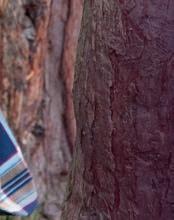







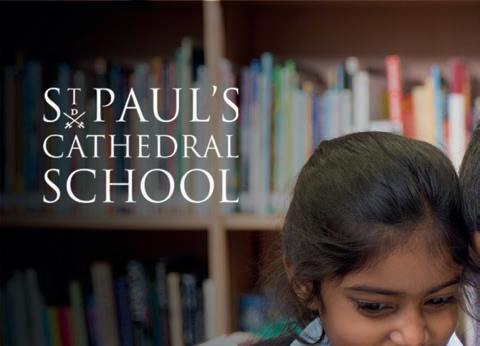


An independent boarding and day school o ering specialist support for children with dyslexia since 1962
O ering a unique approach to education for pupils aged 8-18. English and Maths are on the timetable daily*. From Year 9 , pupils choose subjects from our Academic, Creative, Vocational and Skills based pathways. Endless opportunities are available at Bredon including a working farm, forest and bushcraft school, sports, outdoor education and adventure activities through our CCF.

Discover more with us:
www.bredonschool.org

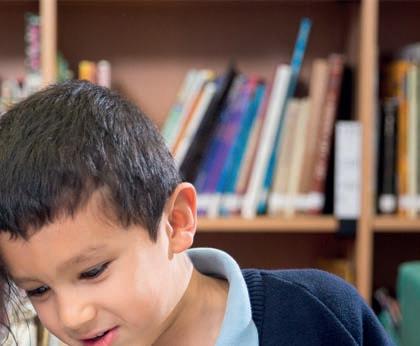
 *Junior School- Year 9
*Junior School- Year 9















BESPOKE STUDY PLANS


TRULY INTERNATIONAL ENVIRONMENT PERFECT UNIVERSITY PREPARATION
ENDLESS OPPORTUNITIES






















With bases in three great cities, Kings School of Art + Design o ers an inspiring and flexible foundation for students keen to pursue creative pathways
For any student looking for a grounding in art and design, finding the right place to develop technique and confidence is critical. So too, finding a setting where you get the opportunities to test and develop your skills and prepare for onward destination – be it university or further specialist training.
Kings School of Art + Design has centres in London, Oxford and Brighton (Oxford is its flagship), giving students the added bonus of being based in culturally exciting cities with high student populations. All the sta are practising and exhibiting artists. For instance, the Head of Art in Oxford Maria Marinho has exhibited extensively across Europe and Hong Kong and another member of the Oxford team is an artist in residence at University of Oxford. This means students have direct support and mentorship from working artists – invaluable in helping them
develop their own practice and direction.
Application to Kings is flexible, with no set deadlines as it welcomes applications from international and UK students. You are asked to send grades to date (for UK students that’s GCSE grades) plus school reports. You are also asked to send a portfolio – usually five to eight pieces of work – which can be sent digitally. This is to check students’ general ability and ensure they will be able to manage the rigours of the course.
There are two main options for study. The first is that students take two art A levels in one year, choosing from four options, and then move on to the UAL Diploma Foundation (Fast Track Art Pathway). Alternatively, they complete the Level 3 course (the Foundation). Completion of Level 3 via either route means students can then move on to Year 1 of a degree course.
Kings’ close associations with both UAL – awarding body for its Foundation Diploma – and UWE Bristol gives students added benefits and potential university pathways to either institution for a great

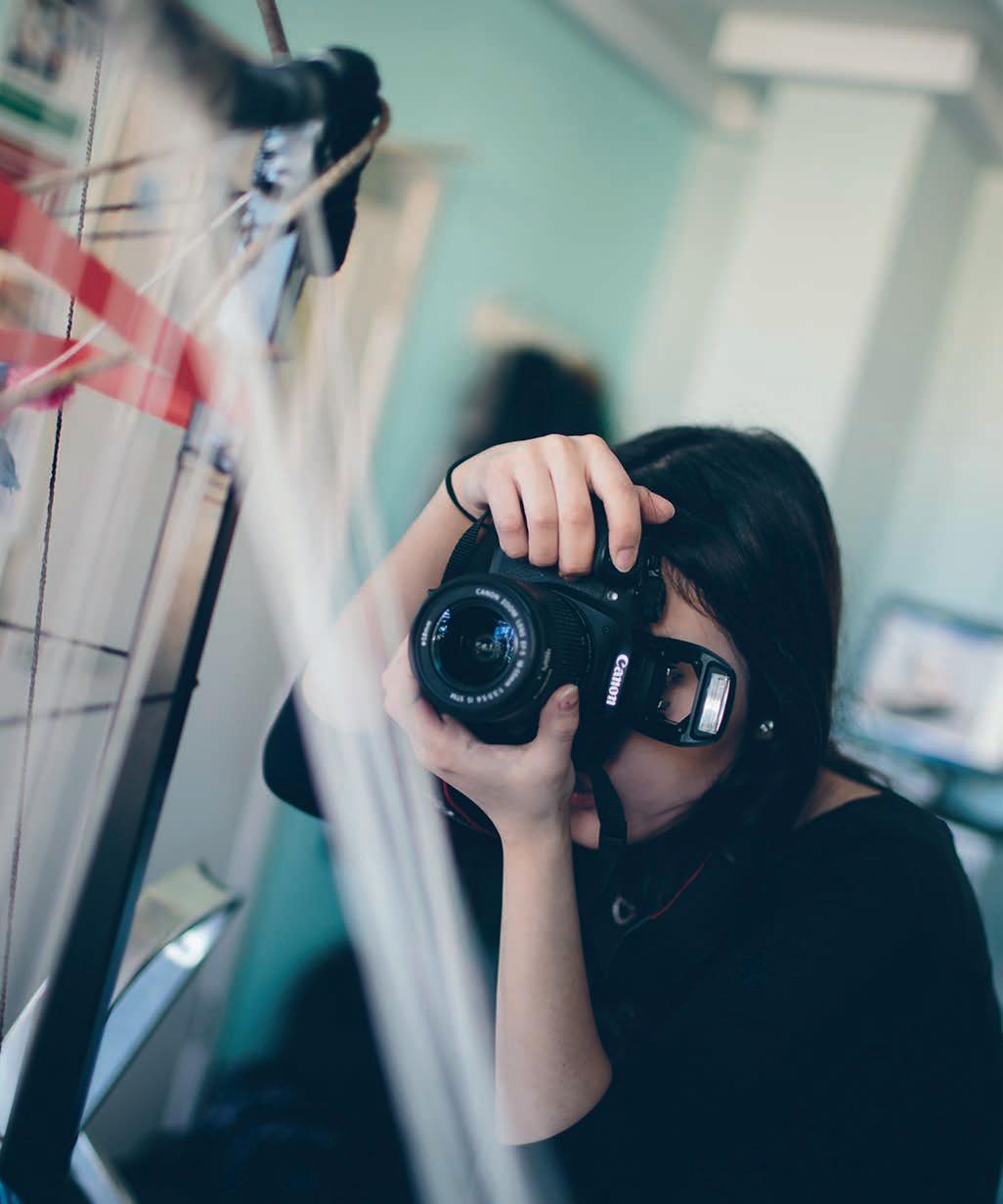
“Students have direct support and mentorship from working artists –invaluable in helping them develop their own practice and find their direction”
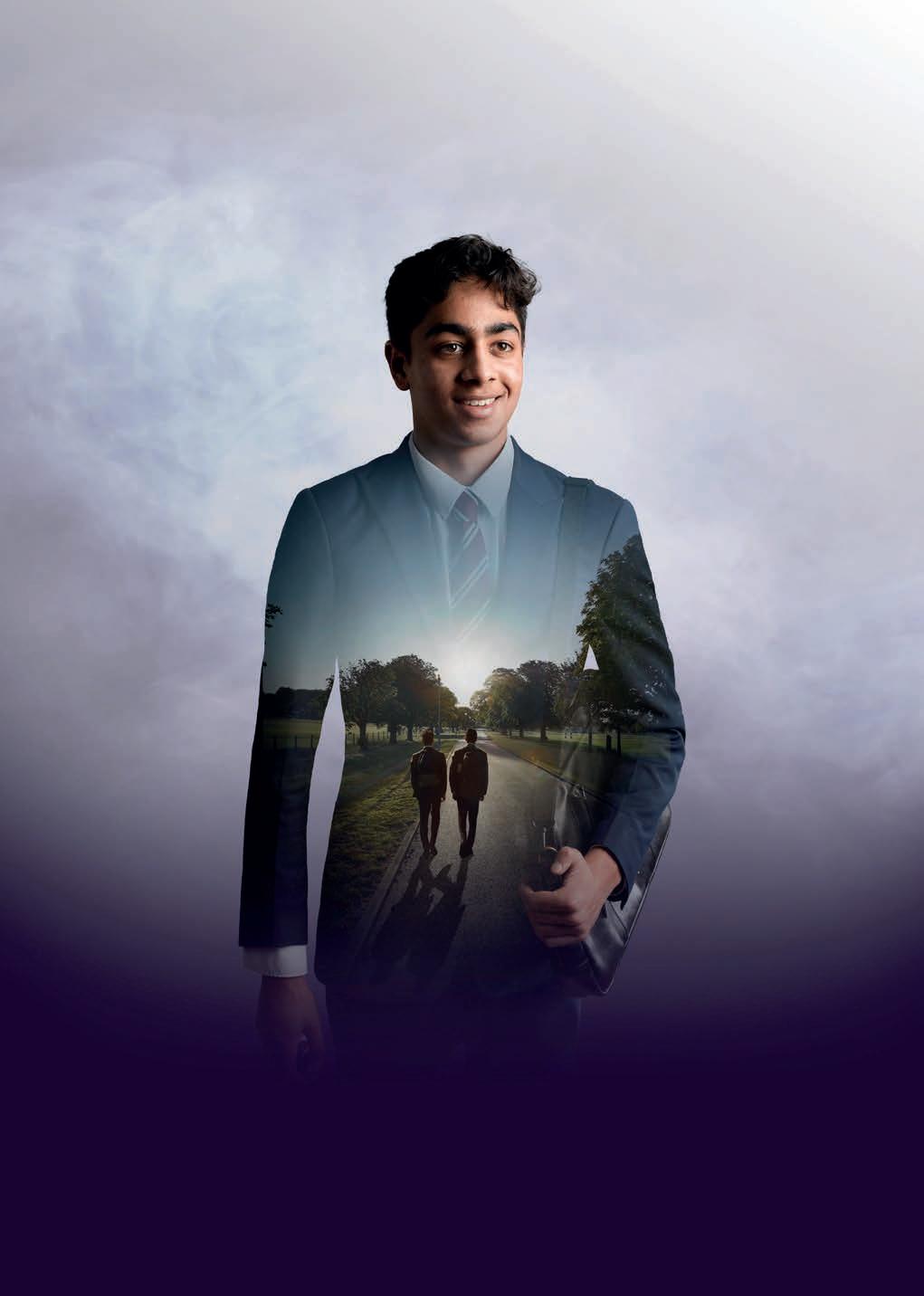


range of creative degree courses. Students also attend a UWE Bristol residential each year, giving an immersive taster of university life and facilities before they embark on their degree journey.
While young people attending Kings’ three centres already know they want a creative foundation, they are not expected to know their future art direction on arrival (although many have a fair idea). In the first term, they explore di erent mediums and skillsets. Students who have a firmer idea where their ambitions lie can choose to focus more closely on their specialism – the school o ers all the

ABOVE
“Kings’ close associations with both UAL and UWE Bristol gives students added benefits and potential university pathways to either institution”
Students are tasked to work to di erent set themes through the year, interpreting them through their preferred medium. The year culminates in a final major project.
Another bonus for Kings students is that all three city-centre locations are arts hubs, giving students the opportunity to explore galleries and museums, attend shows and live events and gain further inspiration. As one student at the London branch of Kings put it: “It’s not like school, it’s very much a leap between school and university”. Sta also assist with that transition from school to HE, providing UCAS counselling as part of the course.
knowledge’ and support for both the applications process and choosing the best university / course for them.
A final draw for many of the cohort is that this feels closer to university than school. It’s a very international setting, with a cohort drawn from some 60 di erent countries (some 80% come from beyond UK shores). This brings plenty of fresh perspectives, as UK students mix with peers from across Europe, Asia and the Americas. Many overseas students have been drawn to the UK because of the high-quality training and clear onward pathways available here. For UK students, this feels like a ‘grown up’ step beyond school and enables them to focus solely on art and design –possibly saving a year – before heading on to their university (or further training if they are admitted to the Level 3 course).

Overseas students at Kings say they relish the small class sizes and high level of support – there is an average of ten students in each class. They also like the fact that they have their own personal workspace, kept throughout the study period, and are working and living among a group of people who share similar interests.
For all students, there’s the sense of this being a bridge between teenage and adult world, plenty of one-to-one support but with a distinctly cosmopolitan and artistic vibe and far more independence. As Kings London student Olivia put it: “All these di erent cultures, it just brings a whole di erent atmosphere I’ve never experienced before. It just opens you up to a whole new world”.
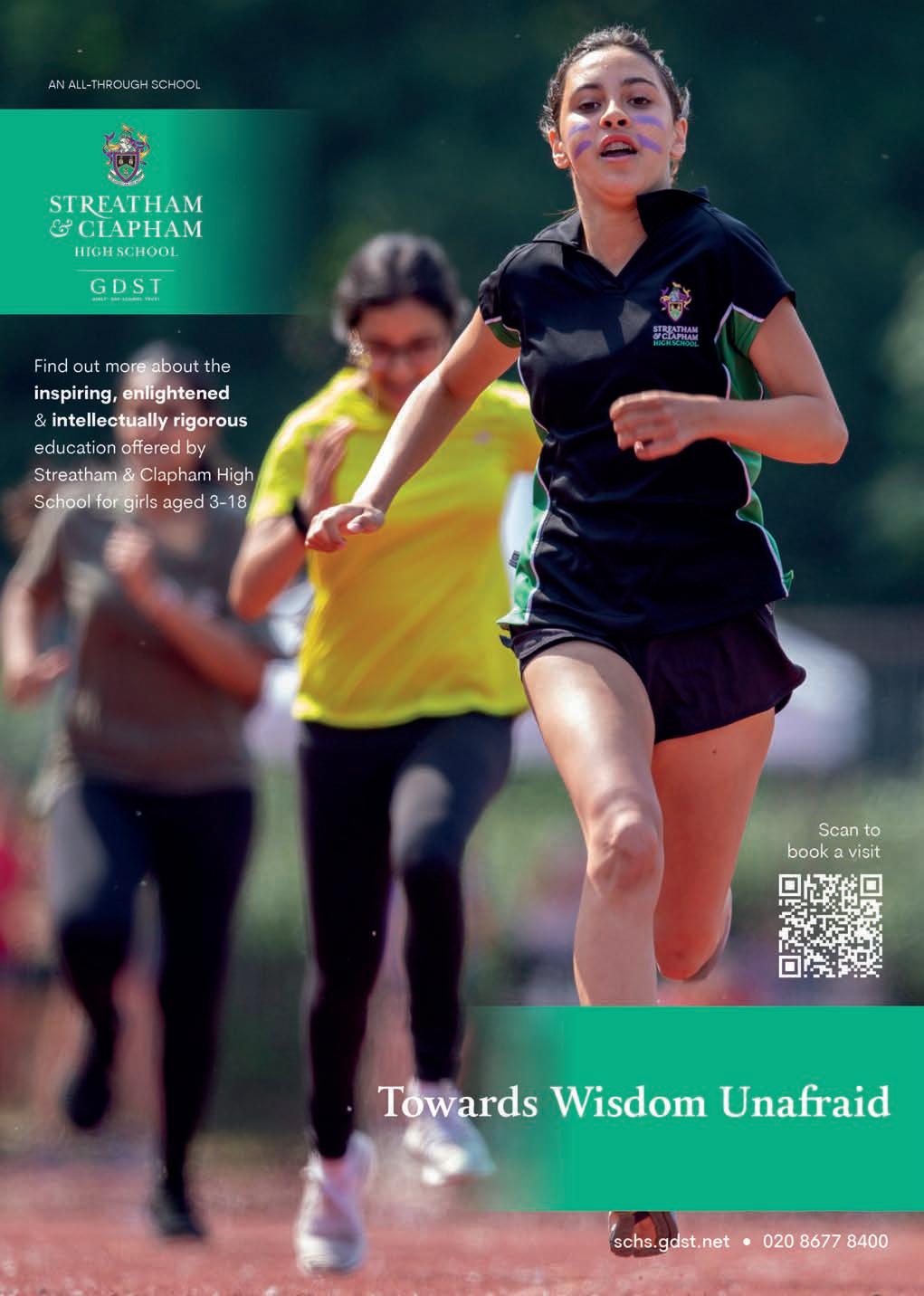
The Head of Sixth Form at Reed's School reflects on how schools empower young people, helping them to recognise that they can make a di erence
After the Paris bombings of 2015 a deeply upset Lower Sixth student asked me what he could do to make the world a better place. He was 16 years old, a schoolboy, what possible di erence could he make, he asked. As a Head of Sixth Form I have encountered young people struggling with all sorts of problems – break ups, anxiety, the occasional existential crisis and everything in between. I suggested he start small. I asked him if he said please and thank you in the lunch queue. He replied no, he didn't always. I explained that it might make a di erence to those who had prepared and served his food. He agreed, so we started from there.
I spent some time reflecting on our conversation. As a History teacher, I am reasonably certain no revolution was inspired by good manners. But I am equally confident they are appreciated. What struck me most was that student's sense of powerlessness. If that feeling was pervasive among his peers, it is easy to see how many might become disenfranchised. I suggest it is incumbent on schools and colleges to empower young people: to provide them with the knowledge and confidence that they do have a voice and it matters. But most importantly, they can make a di erence.
“It is incumbent on schools and colleges to empower young people – to provide them with the knowledge that they do have a voice”

Perhaps this might best be achieved through compassion and community. Social media has provided a platform for influencers who propagate the idea that happiness is about the 'hustle', at the expense of compassion, empathy and vulnerability. Experience suggests the contrary. Yes, students perform at their best when they are happy – the evidence is unequivocal. But this is best achieved when young people feel a sense of belonging, whether in their form room, within a house system, on the sports fields or stage. If students enjoy an environment where they can be honest, they can build trust. The reward is students who are resilient and confident, with a real sense of community. Students should be empowered to become stakeholders in the decisions that influence their education and inform their experience at school. They should be encouraged to review assessments and reports critically, to work collaboratively with teachers, to maintain an open dialogue and lead their own initiatives to e ect change within school. Teenagers are very often their own worse critics. Issues with mental health are pervasive.
Students should have the opportunity to consider self-compassion and how to recognise when friends are struggling with mental health. We are fortunate at Reed's to be able to provide workshops on anxiety, stress management and procrastination. Students should be given opportunities to develop compassionate leadership. This might include encouraging Sixth Form students to attend lower school forms, seeking to build rapport, evolve perspective, discuss school values and build community. It could also include outreach work – perhaps extending community to the elderly or assisting primary school students with literacy and numeracy. The bottom line is, through compassion and community, students can develop the confidence, skillset and experience to understand they can make a di erence. During Covid, Upper Sixth students at Reed's decided to write one letter a week to local care homes. Within two weeks the whole school was involved. Due to school closures the pupils weren’t able to see all the letters we received back. So, although the students may never know the enormity of the di erence they made, we saw how small things can create big changes.



 ANDY DAVEY Head of Sixth Form Reed's School
ANDY DAVEY Head of Sixth Form Reed's School
















Education is not a onesize fits all business, and in the post-GCSE landscape, sixth form becomes a real chance to reinvent yourself.
To some this seems daunting, while to others it is an opportunity. It can be di cult for anyone to know what to expect from the whole sixth form experience. That is what causes even the most confident to stumble a little at the outset. Is the day structured very di erently? What will the timetable look like? Will you feel like the new boy or girl again or will you be joined by others going through the same process?
And this is where colleges fit into the picture. Born out of the universitytutorial mould over 50 years ago, they have established enough of a foothold to suggest their relevance is beyond question. Sixth form colleges still require an element of myth busting. The stigma that they are only ‘crammers’ or for those who have been removed from mainstream schools is frankly nonsense today.
Sixth form colleges have morphed, diversified, grown and built and are, for many students, a number-one choice. This is because of the variety and diversity they can o er within a more flexible environment. With over 40 di erent A-level options – and some with Foundation courses now too – colleges are geared up for those who know what
“Students are now at the business end of their school career and they should use the two years of sixth form to work out what they want to do next”

they want to do in the future. In this environment they can focus on it.
One issue for some students is whether college will be too big a jump? In fact, they are not as far removed from a school as one might expect. We need to explain the word ‘independence’, a red herring in marketing literature. Independence does not mean students are on their own, but rather that they are being taught to cope with what comes next. This ranges from ‘guided’ independent working to accommodation that o ers increasing levels of independence. The ultimate aim of sixth form colleges today is to bridge a gap between school and university, and they have become very successful at it. How? By recognising that what is required extends beyond the classroom – life education is just as important.
Regardless of where they choose to go, students are now at the ‘business end’ of their school career and they should use the two years of sixth form to work out what they want to do next. They should expect more focus on careers and university courses, a sensible discussion on gap years (now they are old enough to understand the merits of one), university visits and
CV awareness. They should make good use of their university counsellors and, if they are going for specific programmes or universities (Dentistry, Medicine, Oxbridge), make full use of the specialist guidance o ered. They are at the stage where an element of proactivity is not only expected, but it should also feel natural.
A new environment for sixth form can often be the best source of inspiration for the next step. What should you expect as a student? A more adult learning experience. What should your chosen college expect from you? A more adult student.
The experience you have in this college environment will be defined by what you make of it.

 JAMES BARTON Global Director MPW Group
JAMES BARTON Global Director MPW Group
Clare Freeman of RMS for Girls on why Sixth Form education needs to deliver far more than exam grades by supporting the transition to life after school
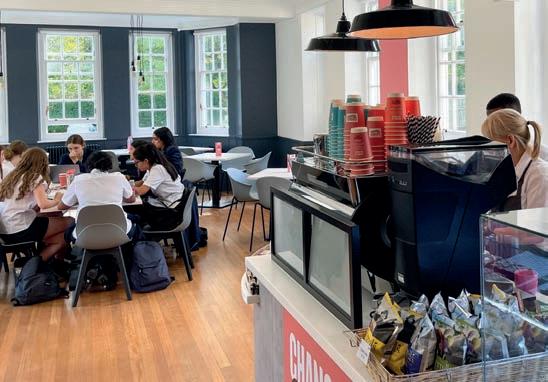
ASixth Form education needs to be so much more than an acquisition of knowledge in order to pass a set of exams. At RMS we recognise that, in order to be prepared to shape their futures, students need to develop a much wider range of skills. These include adaptability, resilience, confidence, creativity, a love of learning and self-awareness.
These skills are developed throughout the school and, during the Sixth Form, preparation for the future is more overtly seen through our LEAD employability course, boardroom discussions chaired by Sixth Form students, and co ee and chat discussion groups. These sit alongside a wide range of co-curricular options aimed at delivering breadth of opportunity and depth to academic interests.
PBL (phenomenon-based learning) lessons enable students to work in diverse groups to look at complex problems such as inequality from an interdisciplinary perspective – emulating the realities of the workplace today. A dedicated careers adviser works with students from a young
age to expose them to di erent careers and capabilities and to help them explore the world of work. Having a career that makes you happy is so important, and this exploration helps students find their own pathways.
Sixth Form for any school is the opportunity to transition students from school to life beyond. Teaching them how to cook for themselves, manage a bank account, not overspend on credit cards, and learn how to iron, for example, are key skills. It is also important to ensure students build a strong work ethic and develop as individuals who are equipped with the confidence to ask for help – and make mistakes.
Independence is, of course, key to personal success after school, when parents and teachers are no longer around. By o ering a flexible approach to the curriculum through sca olded support, students who are, for example, elite sportswomen with US scholarships might choose to study only two A levels to give time for training. Others ambitious for a place at a leading university might study four A levels alongside an EPQ.
Working with teenage sleep patterns and enabling students to choose when they best work means many will have a lie in and come
“Students work in diverse groups to look at complex problems – emulating the realities of the workplace today”
into school in time for their first lesson of the day then continue working later into the evening. Our approach means students are more alert for their lessons, are happier and, ultimately, achieve at a higher level.
Each student who passes through our care will be an individual with their own context, their own ambitions for the future and their own interests. It is key that these are nurtured, supported and celebrated so that they feel valued, whatever their chosen pathway. While most of our Sixth Form students are continuing their education through RMS, we also welcome new students. For all our Sixth Formers, the working environment we create is key to enabling an important transition – to feeling and acting like grown-ups.
Our recently redeveloped Sixth Form space assists this transition. It was specifically designed to showcase the interface between school and the workplace. This provides an innovative and forward-thinking experience for young people who are looking to be fully prepared for life beyond school.

Heathfield School has a long tradition of taking fashion and design seriously.
Located in Ascot, in a wonderfully designer Italianate mansion in extensive grounds (former home of the Paravicini family), its famous alumni include the legendary editor Isabella Blow, interior designer Nina Campbell and Jimmy Choo co-founder Tamara Mellon. In fact, the arts programme here

has nurtured notables over many years – from actress Sienna Miller and model Amber Le Bon to fashion consultant, stylist and editor Charlotte Stockdale.
There’s good reason to take fashion seriously. Largest of the creative industries, it’s estimated to be worth £26 billion in the UK alone and employs some 800,000 people. Over many years, Heathfield has built strong partnerships with leading UK institutions such as Falmouth School of Art and with New York’s Parsons School of Design. Recently,
it became the only UK school to enter into a collaboration agreement with Parsons Paris. Heathfield’s team believe Parsons’ approach of merging disciplines to cultivate design-led problem solvers is a great fit with the school’s philosophy. The bespoke curriculum is also reflective of practice at Heathfield. The partnership means that art and design students at the Berkshire school benefit in a variety of ways, including extracurricular and scholarship opportunities.
RIGHT Heathfield fashion shows bring together school talent in design and productionParsons regularly attends the school’s fashion events to view students’ work and is also on hand to review the portfolios and presentations of students applying to study art and design at university. Heathfield Sixth Formers also receive a 10% discount on the Parsons Paris Summer Programme, which o ers international students an immersion in subjects across the global fashion design, business, design management and fine arts fields.
Heathfield’s partnership with Falmouth School of Art is, like its Parsons’ partnership, fruitful for students and unique in the UK. Course leaders for last year’s Falmouth Challenge Competition set the school’s students the same brief as its own university students and were impressed with the sheer breadth of ideas they explored.
Heathfield has attracted other fashion insiders, keen to support its students’ creative spark. In 2019 students benefited from the input of fashion and luxury brand insider Stephen Lisseman, who shared his experiences of working in the sector alongside names such as Karl Lagerfeld, Christopher Bailey and Tom Ford. He further supported GCSE and A-level students via one-to-one tutorials to help consolidate their design skills and delivered a series of lectures on topics around the theory of design, fabric selection, preparing a portfolio and building a collection.
Heathfield’s Art Department team are instrumental in developing these partnerships and supporting broader knowledge. Fashion and Textiles students are encouraged to work across a wide range of disciplines, including print making, painting and drawing, lens-based media, and sculpture. They also explore more traditional skills, such as pattern cutting, fashion illustration, costume, jewellery and branding. Adjoa Essel, current Heathfield Designer in Residence, says: “I love helping them to learn new techniques and processes and inspiring them on their own textile and fashion journey – it’s really rewarding to see their work progress and watch their own styles evolve”.
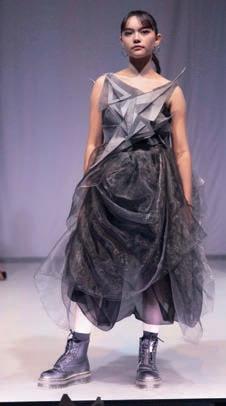
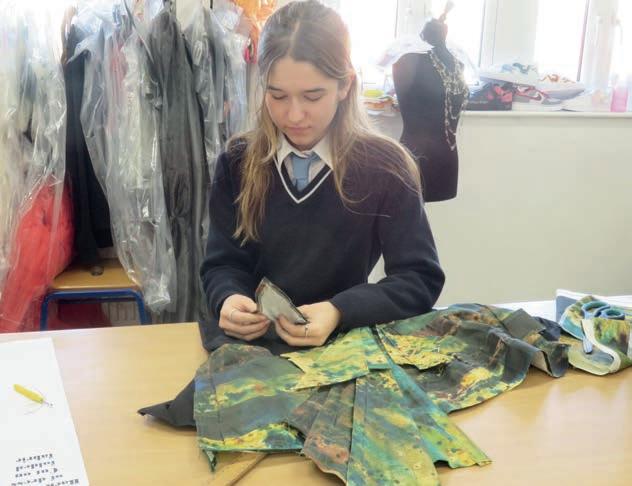
“Art and design is imperative in schools as it not only teaches students to think critically and be creative, but also teaches them key life skills”
Head of Art and Design Angela Farrugia says it’s important to deliver an innovative and dynamic approach via the curriculum in order to help students explore di erent mediums and find their artistic style – and she’s also passionate about the broader value of a strong arts training for all young people. “Art and design is imperative in schools as it not only teaches students to think critically and be creative, but also teaches them key life skills such as perseverance, commitment and focus.”

Angela Farrugia’s mission is to encourage students to build up a broad skillset in preparation for the time when they enter the working world –whatever industry they choose. There’s no doubt the Heathfield approach inspires creative careers. Every year its leavers are accepted at leading universities, such as Central Saint Martins and London College of Fashion, alongside partners Falmouth College of Art & Design and Parsons New York. And the school’s
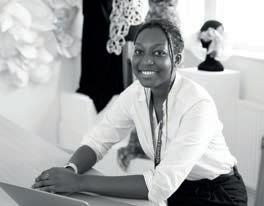
biennial fashion show is ‘one to watch’ to see next gen talent coming through.
The show has become a fashion ‘hot ticket’, always attracting a diverse (often starry) audience of industry insiders, alongside proud parents and supporters. At the 2023 Primavera fashion show, produced by Angela Farrugia, students took to the catwalk in a diverse range of designs created by fellow students. It was an impressive runway production, and behind the scenes the girls had flexed their creative muscles in other ways – ranging from photographing outfits and making a magazine to showcase work to styling the models. The show, as always, was a collaborative event, giving students a taste of what it’s like to work in real time within the fashion and design industries.











As our Year 13 students face the looming challenges of A-level exams, they also look forward to setting sail from the metaphorical safe harbour of school and venturing into the choppy waters of adult life. With a crew of great friends, they are already equipped with their metaphorical sea-legs and have honed crucial life skills, from articulating complex ideas to navigating the changing tides of leadership, consent, and living well online. They may not have Leonardo di Caprio at their side, but they have the ambition and vision to stand at the bow of their ship facing into their future, exhilarated by the view. They are ready for adventure.
Or are they? In our schools, we unite in wanting to ready our students for adult life, yet more and more young people are struggling with poor mental health and loneliness at university, sometimes with devastating consequences. With my son starting university last September, my mind was more focused than ever on how we remind our students of all that school has cultivated. How do we ensure that the hedonism of Freshers’ Week doesn’t lobotomise our otherwise resourceful and resilient brood?
Last May I came up with a Year 13 Action Plan that I’m looking forward to repeating this year. Like so much of what we do as
“I want them to keep safe their precious school cargo of good sense, active engagement, friendship and resourcefulness”

teachers, I don’t know how much impact the Action Plan had – we rarely know where the ripples of our guidance land – but I have faith that the Action Plans might bob to the surface, like a message in a bottle.
I will remind my Year 13 students that they need have no fear of what lies ahead (after all, our school motto is: “Towards wisdom unafraid”). They have the skills and resources to flourish – they just need to remember to use them. I will give them a two-sided sheet of paper for them to complete in good old-fashioned longhand. They will do this privately, then put it in a sealed envelope and address it to themselves at home. In September, I will post it to them, for them to read as a reminder before they pack their bags for university. My advice is that they take the Action Plan with them to reflect on when it catches their eye on their bookshelf or tucked in their sock drawer.


So, what’s in the plan? It’s simply a list of reminders of who they are and what they love doing. They need to list three things they are proud of; five things that make them laugh; five people they know they can call or message if they’re feeling sad or lonely; three current activities they enjoy (think sport, music, art, drama – being active, creative, reflective and connected); three new activities that they will explore at Freshers’ Week; and finally – a message to their future self embarking on the uni adventure.

 CATHY ELLOTT Headteacher Streatham & Clapham High School
CATHY ELLOTT Headteacher Streatham & Clapham High School
As our students pull up the anchor and set sail to their futures, I want them to keep safe their precious school cargo of good sense, active engagement, friendship and resourcefulness that will be their armoury, comfort and sustenance for all that lies ahead. And perhaps my little Action Plan will bob up, like a message in a bottle on a turbulent sea, at just the moment they need it.





“A strong international focus and a huge spirit of adventure.” - Muddy Stilettos






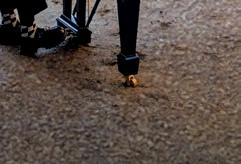

For Girls 11 to 18, Co-ed in Sixth Form.



Welcome to Cobham Hall, a day and boarding school where centuries of history meet a curriculum for the future and creativity knows no bounds.
Achieve more than you dreamed possible at Cobham Hall.
Minibuses available across Kent.
Contact us to arrange a visit.


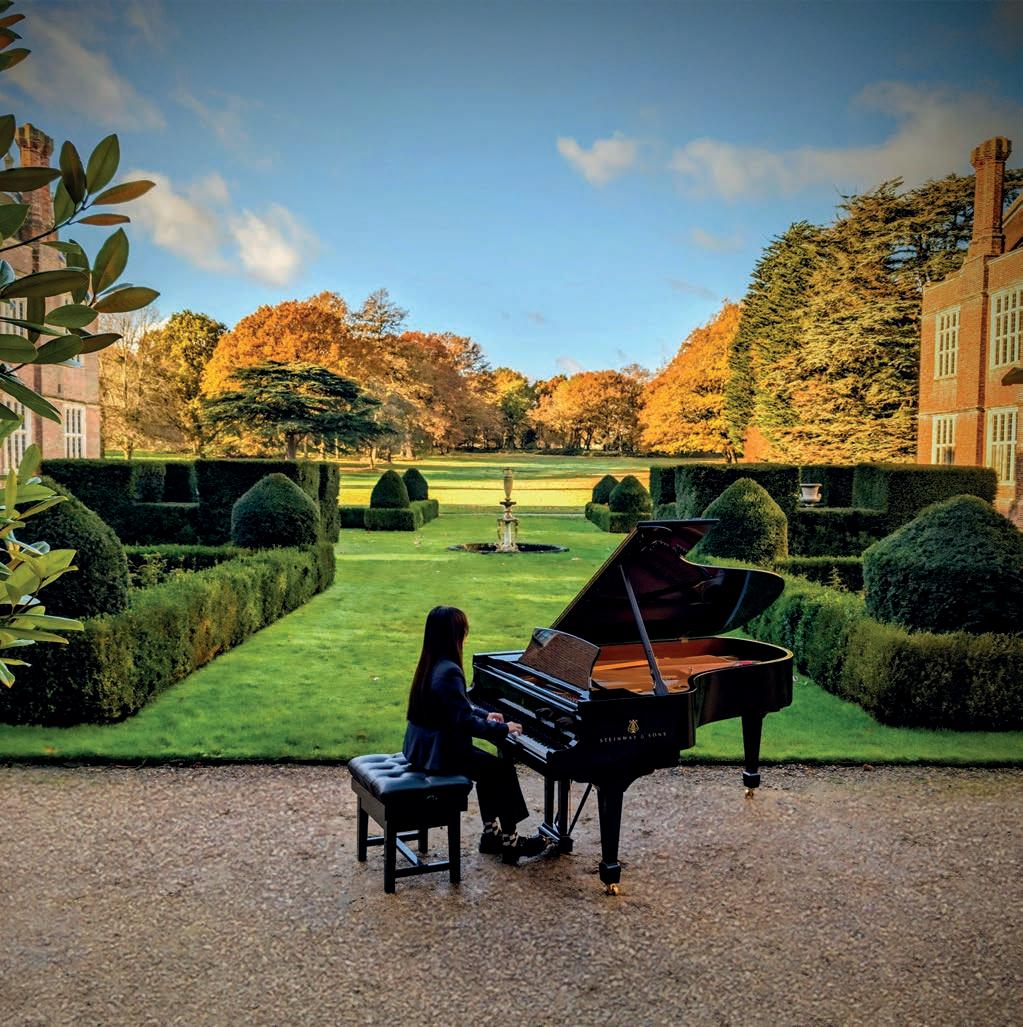









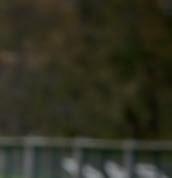


“Our new Westfield kit car build has enthused girls from 4 to 18 – and brought parents together on the racetrack”

St Catherine’s School, Bramley describes its recent car build project and its impact in driving girls’ aspirations for potential STEM-focused careers
St Catherine’s School, Bramley has a strong tradition in science and many notable STEM alumnae – including Stanford professor of engineering Beverley
McKeon, University of London neuroscientist Cathy Price and Amazon robotics specialist Abike Looi-Somoye. “Girls are encouraged to believe that they can, with focus and determination, follow a career in any direction that they choose,” says St Catherine’s Senior School Headmistress Alice Phillips. Over 75% of girls here already study sciences or social sciences at A level – but the school is not resting on its laurels. Since employment in STEM areas is only projected to increase in coming years, this requires approaches to widen interest. “Academic disciplines must collaborate and integrate to enhance our students’
creativity, problem-solving skills, critical thinking, experimentation and resilience,” says Alice Phillips. The question the school set itself was: ‘how do you create a new and exciting project to inspire girls to follow a STEM path at university and beyond?’. The answer: build a car.
This project was all part of St Catherine’s Sixth Form Design Engineering Programme in the new Art & Maker Space. Girls in Upper and Lower Sixth Forms were invited to join Alastair White, Head of Design & Technology, to take part in the project. While some girls had studied Design Technology at GCSE or were doing so at A level, every Sixth Form girl was o ered the chance to take part in the course alongside her A-level studies.
The first car o the St Catherine’s ‘production line’ is a bright yellow Westfield Final Edition. Working under the guidance of Alastair White, and from detailed plans,



diagrams and schedules, the team worked collaboratively to problem solve, think creatively and engineer solutions. Girls studying Maths and Physics tackled the project as engineers, while those with a flair for the visual o ered a di erent view of challenges. The team were mindful of the wise words of Henry Ford that: ‘Coming together is a beginning, staying together is progress, and working together is success’.
We know study choices among female students are changing nationally – computer science applications have more than doubled since 2012, while engineering applications have increased by 70%, according to UCAS. “Even classic jobs like marketing, which have usually been associated with intuition or experience, are fast changing due to the prevalence of Big Data,” says St Catherine’s Head of Physics Dr Kathleen Puech. “I feel very strongly that in a world that is becoming ever more scientific, a firm grounding in these subjects will make our children far better equipped to compete successfully.”
That bright yellow motor has certainly fuelled interest. “Our new Westfield kit car build has enthused girls from 4 to 18 – and brought parents together on the racetrack!” says Alice Phillips. It was especially heartening to have so much interest from Prep and Senior girls, eager to visit the workshop and talk to the project team. “This has been a hugely successful project which has provided a truly immersive learning opportunity for our Sixth Form girls and has had a ripple e ect,” she adds. “It is wonderful for the girls to not only have such incredible role models within the school, but also be able to look to our alumnae, who have made significant contributions in the world of science and engineering.”

WEDNESDAY, 1ST MAY 2024
Wetherby Senior School is an independent day school in central London for boys aged 11 to 18, providing an outstanding education that prepares pupils to fulfil their potential and become citizens of the world.
www.wetherbysenior.co.uk
The Principal of Elea High Online School on why the Extended Project Qualification can give university-bound students a real advantage
It’s that time of year when choices for GCSEs and A levels are front of mind for students and their parents.
‘Which subjects should I choose?’ and, ‘Will my choices at GCSE limit my A-level options and subsequently my university courses?’ are questions regularly posed to careers advisors. Many factors influence the final decision but, on the whole, most students choose subjects that interest them and which allow them flexibility in their academic career path.
While the focus is understandably on GCSEs and A levels, there is another qualification, often overlooked, which has immeasurable value in terms of its impact on secondary and tertiary education – the Extended Project Qualification or EPQ.
As Principal of Elea High Online School, and previously at a high-achieving international school, I have witnessed the benefits that can be gained by undertaking the EPQ. These range from the development of research and academic writing skills and formulating arguments to showing how they consider topics from multiple perspectives.
There are four iterations of the EPQ; Dissertation, Investigation, Artefact and Performance, with this variety allowing students with a range of talents to find an EPQ for them. The qualification can be undertaken over the course of four terms or via an ‘Express’ route undertaken in 14-16 weeks. It is an opportunity for students to choose a topic they want to study, learning project management skills in the process.
“Universities often give priority to students holding a strong EPQ grade knowing they will be ready for the demands of undergraduate study”

There’s no age limit on taking an EPQ either, so if you have the determination to succeed, a passion for your topic and the skills to develop it, then you are ready to begin.
The scope of an EPQ is virtually limitless. It is designed to extend learners in new forms of learning and develop perseverance. We’ve had students investigating the holographic principle in physics, the impact of the fast fashion industry on living standards in third world countries and the role of gender in voting patterns.
The demands of the EPQ are very rigorous; students must write a project proposal and, through the entire course, maintain a project activity log reflecting on their learning.
In addition, they need to undertake a literature review, considering bias, argument and counter argument and then write a 5,000-word dissertation, a report on their investigation, or the process they followed in creating an artefact or performance. Finally, they must deliver a presentation to

a wide audience and answer any questions posed on their topic. Throughout the process, they must constantly use their criticalthinking skills to attain the highest grades. We are proud to say that our first cohort all achieved A or A* grades for their projects and we have seen ongoing success each year, with our current cohort on track to achieve similar results. Where the real benefit has been seen is in our students’ enhanced performance at A level and how well the course prepares them for university, where all of our EPQ graduates have been at the top of their cohorts. For this reason, universities often give priority to students holding a strong EPQ grade, knowing they will be ready for the demands of undergraduate study.
DAVID LEWIS Principal Elea High Online SchoolThe EPQ is proven to supercharge students’ learning potential and, alongside the comprehensive suite of IGCSE and A-level subjects we o er at Elea High, gives students both the confidence and the ability to pursue their higher education goals.
Fancy teaching watersports and getting paid, or crewing a superyacht? UKSA training programmes o er that, and plenty more, for ocean lovers
If you like the idea of a period of travel, but don’t know how to fund it, or want a training pathway to guarantee a life on the ocean, check out UKSA’s training pathways. This charity and marine industry training provider delivers globally recognised qualifications that are a passport to some of the best jobs on the ocean.
Established over 35 years ago and located on a four-acre waterfront campus in Cowes, Isle of Wight, UKSA’s core mission is to encourage young people to broaden their horizons by having waterbased adventures. It does much good work with schools and youth groups. Broadening career opportunities within marine industries is another vital part of its remit. It sees the careers and training arm as vital to helping more young people find rewarding and lucrative career paths.
One important thing to know is that there’s a shortage of trained people in many areas of this industry – especially areas such as maritime engineering. Another is that it’s a growth market for jobs, especially when it comes to luxury superyachts. UKSA
reports vessels in build increasing year on year – for instance, the 2022 Global Order Book reported a 24.7% rise in projects in build/on order – that translates to 5,000+ employment opportunities.
Skills shortages make salaries pretty good. This year, entry level steward(ess) roles on the very smallest superyacht pay from Euro €2,200 a month, a deckhand can make from €2,800. More senior roles make way more (a captain earns typically from €9,000 a month). For those working on board, major living expenses are covered – so no accommodation or food. Another vibrant area is the
“People who work successfully on yachts have a high level of tolerance, patience, ambition, and desire to excel – anything below this doesn’t cut it”

watersports industry. This is where someone who already loves watersports can gain the requisite teaching qualifications to turn their passion into a salary-earner – brilliant for a gap year or two, or to fill those long university summer holidays. But you can take those qualifications a lot further – and many do.
Many students join UKSA at 16 to take the Maritime Foundation NCFE (Level 3 Introductory Certificate), a two-year course to prepare for industry roles. No prior experience is required, and it can lead on to roles such as watersports instructor, mate (flotilla or tugs), deck o cer (merchant navy) or deckhand (superyachts/ workboats). It has an excellent post training employment rate, making it a good option for students – including those without GCSE English and Maths – who want entry into the industry. It can also be added to with further training, including UKSA’s apprenticeship pathway. “For students who are looking to escape the classroom and gain valuable work experience, it’s a great choice,” says UKSA Education Manager Clare Powell.
“Someone who already loves the water can gain the teaching qualifications to turn their passion into a salary-earner”

Those aged 16+ with English and Maths GCSE, can embark on the Adventurous Outdoor Activities Programme (NCFE Level 3 Diploma), a two-year course to develop skills for the sports and outdoors industries, or move on to the UKSA Superyacht Cadetship. “The career options are endless,” says Clare Powell. “There’s a lot of fun to be had as students gain their RYA Powerboat Level 2 Licence, dinghy instructing, and safety and rescue training, as well as first aid.”
For 18+ students, UKSA training options also include Watersports Instructor Training – with five-week and 13-week courses available. These can lead on to job opportunities at activity holiday companies such as Nielsen. While most 18-year-olds who embark on training with UKSA want to build a career, a fair number do so to allow for an extended period getting paid to teach their favourite sport. Some opt instead for an entry-level superyacht course so they can head out to sea.
Returning later to build further qualifications is the tried-and-trusted route for many alumni. UKSA welcomes back watersports instructors who want to gain
ABOVE UKSA



RYA Yachtmaster O shore, while crew/ hospitality alumni come back to upgrade to the Yachtmaster qualification. Cadetship students often embark on a longer journey – potentially working towards top roles as O cer of the Watch/Master in the shipping or yacht industry. This can take several years, with students returning to UKSA each year to earn their stripes.
Other training paths are buoyant – especially for students who have an engineering focus. Maritime engineers are in such short demand right now that rates of pay for the top jobs are high – close to a captain’s pay in some settings. “UKSA has just launched an Engineering Crew Training course, allowing us to support more people into these roles onboard and help fill the skills shortage,” says Industry & Cadetship Coordinator Lauren Saltonstall.
UKSA training serves a large and diverse community, with some 1,500 MCA (Marine and Coastguard Agency) students passing
through this year, plus over 500 careers students and 130 Further Education and apprenticeship students. As a charity, it aims to remove financial and social barriers by providing funding where needed – for instance, 80% of Superyacht Cadetship course entrants received generous funding last September. Repayable and non-repayable funding is available, thanks to the charity’s sponsors and supporters. People also join from overseas – last year, its campus delivered training to students from 49 countries.
Many school leavers choose a UKSA training pathway to travel while earning or seek alternatives to classroom-based learning. Nearly all have a love of the outdoor life and/or a passion for getting out on the water. Standards are rising across the sailing industry – particularly for superyacht crew – so qualifications count. “Awareness of Safety, crew welfare, and entry deck qualifications, such as the RYA Yachtmaster, are all areas that have become important prerequisites for crew,” says UKSA Head of Careers Will Satterly.
People who have followed shows about superyacht crew, such as Below Deck, may have got the idea it’s all sunshine and napkin folding, but jobs on board require hard work and commitment. Life experience is highly valued and, as there are often long periods away from home, a positive attitude is essential. Conditions can be cramped for crew, so the ability to get along with others
“Maritime engineers are in such short demand that rates of pay for the top jobs can be close to a captain’s pay”
is essential. But UKSA believes the opportunities are an excellent option for the many young people seeking clear job prospects and a career ladder. The team o er extensive guidance for trainees, including careers mentors and advisors. CV support and agency interviews. There’s a strong network in this industry – as you’d expect – and UKSA’s careers support is ongoing. “The industry ideally wants crew who are committed to developing a career,” says MCA and Superyacht Cadetship Manager James Potipher.
So could this be for you? “The people who work successfully on yachts tend to have a high level of tolerance, patience, ambition, and desire to excel,” says Industry & Cadetship Coordinator Lauren Saltonstall. “Although some people enter the industry as a gap year or to just try it out, we mostly see individuals who see this as a long-term career – and even after leaving vessels, they want to remain within maritime.” So, what may start out as a fun job opportunity often leads on to much bigger things. There’s a rich variety of careers on and by the ocean, so if you already love all things maritime, don’t be surprised if you get hooked.



We believe that every child has immense potential that, in the right environment, can be uncovered, nurtured and realised.
wellingtoncollege.org.uk
Co-educational excellence in the heart of Berkshire.









How and where we work is fast being reimagined –as showcased in new hybrid workspaces – and this is also reflected in new sixth form designs








V“YOUNG PEOPLE WILL ENTER A FAR MORE FLUID WORKING WORLD, ONE THAT PRIZES SELF-STARTERS WHO CAN GET THE JOB DONE WITHOUT A BOSS STANDING OVER THEM”
life in the working world. Young people will enter a fluid environment, one that prizes self-starters who can get the job done without a boss standing over them. Given that most universities now place a similar demand on students – less faceto-face time with lecturers and tutors than even a decade ago – students have to learn self-discipline, and learn it fast.
That’s why the sixth form is being reinvented, with schools investing in brand new facilities or ambitious redesigns. Often new sixth forms are in discrete blocks with access to social spaces, including that all-important co ee bar. Tutorial pods and breakout lounges feature, alongside lecture halls – technology and connectivity a given.
International Workspace Group (IWG) the name behind Regus and Spaces – and also The Engine Room – points out that academic research by Stanford, among others, predicts that around a third of white-collar roles will remain hybrid for the long term. Today’s students need to be prepared for dropping into an o ce (or di erent o ces) on an ad hoc basis. There will be no familiar desk, family photos or personal drawer space.
and extended parental leave to mental health support. All positive news, as is IWG’s prediction of the return of the lunch hour as a thing, but how will today’s crop of students manage when so much more responsibility for time management and getting the job done rests with them?
This is where schools come in by delivering a bridge between classroom and what follows. Sixth Forms certainly feel smarter, but schools are all too aware that the expectations placed on the age group soon to enter the workplace are higher than ever. Today’s sixth formers will need to be able to check in to an unfamiliar coworking space, contribute to meetings with strangers without fear, manage information retrieval and connectivity seamlessly, and complete tasks accurately and to time.
When you consider all that, new sixth form spaces look like a calculated investment in confidence and independence building for the super cool but ever more demanding working world of tomorrow.
isit The Engine Room in London’s reinvented Battersea and you get a vision of what today’s students are set to experience in tomorrow’s workplace. Understated, and with a clubby feel, it sits within a proud landmark of the last industrial revolution, Battersea Power Station.
Workers who sign in to The Engine Room are able to host meetings and conferences (real or virtual), catch up with colleagues in the business lounge, hunker down for a bit of quiet time or grab a co ee and light bite. Of course, endless shopping, dining and entertainment opportunities are just outside and you are your own boss in choosing the hours you keep.


IWG says this has prompted new company roles, including Chief Hybrid O cer and O ce Synchroniser (companies such as Meta already have a CHO). Both roles, as the titles suggest, manage the logistics, productivity and smooth running of organisations where employees don’t routinely clock in and clock out but still need to be briefed, monitored and supported.
Another trend, says IWG, is a more diverse workspace to suit neurodiverse employees, as well as older employees. So, forget that noisy openplan space, quiet and cosy are the way forward, alongside spaces that encourage free flow of ideas in a nonconfrontational way.


This, then, is the challenge facing schools as they prepare post 16 students not only for higher education but also for

Improved benefits will be o ered to tempt in highflyers – from pet care


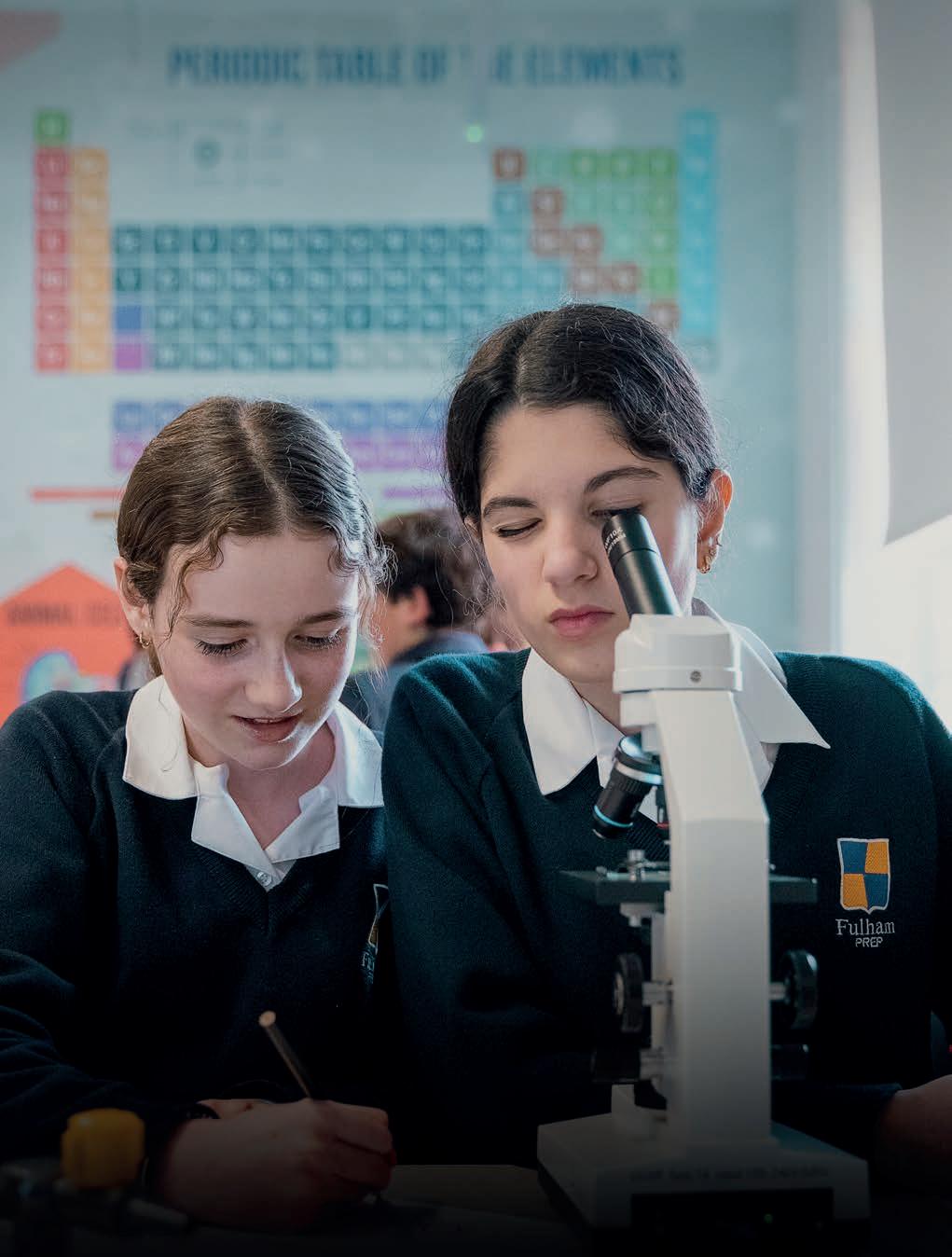


Open to girls applying for Years 2-7, Fulham School offers STEM, sport, and creative scholarships to support pupils to embark on a fulfilling educational journey.


















07:00 – Wake up bright and early for essential shower karaoke before heading to breakfast with my girls for a taste of Pangbourne’s French cuisine – pain au chocolat.
08:25 – Wednesday morning means Congers! Pupils and sta are warming up their vocals, ready for the hymns of the day – it’s a good thing I warmed up earlier. Bonus points if we get to sing ‘I Vow to Thee, My Country’, it’s a crowd favourite. After a morning filled with music, I’m o to discover the many means of mass communications at Media.
10:30 – After learning about the multiple ways to communicate to an audience, I head back to St. George (girls’ boarding division/house) to grab a snack for fuel, check in on the girls, and utilise my free study period to knuckle down on some work before heading back to lessons.
12:25 – Lunch time, although, not before a brief meeting with
the Head in my role as Chief Cadet and Captain of College. Chilli for lunch means it is time to put my connoisseur skills to use creating a chipotle bowl from the contents of the salad bar. Post hearty lunch, back to division to catch up with friends before the final two lessons of the day.
18:00 – Time for more food as we indulge in supper. For some this is the ultimate meal, since on Wednesdays boarders are allowed to order pizza if they wish. Following this, it is time to head back to division for some study.
20:30 – After tending to the academics, I wind down in the evening by spending time with friends in the house watching Netflix, making noodles or going for a stroll around the campus.
10:30 – I conduct my swift night routine, before heading to bed.
7:00 – When the ‘beep’ of my alarm goes o , I get up, get ready and head o to breakfast, where my Weetabix is awaiting me.
8:25 – Thursday morning means that it is time for College parade practice. We are not a military school, but it’s great to have the opportunity to pay tribute to our naval roots through our parades. It also allows me to practise my leadership skills by helping guide the younger students in perfecting their marching.
10:30 – Economics. After a lesson drawing graphs and learning about the financial world, it is finally break time. This involves cracking open the digestives and catching up with friends. Next, I’m o to the Politics department for class.
12:25 – Finally, lunch has arrived. However, before enjoying a delicious plate of fish and chips I have a quick Chiefs’ (Head Boy and Girl) meeting and a swift gym
session. After lunch, back to my division (house) for some more socialising in advance of the final lesson of the day.
15:15 – Lessons for the day have ended and it is time for a Tutor session before getting ready for rowing. After a brisk jog to the river, we spend a good hour on the water before running back up the hill for Enrichment.
18:00 – Time for another nutritious meal. Tonight is normally paella night. After indulging in some European foodie culture, I crack on and catch up with prep and study for a quiet hour and a half.
20:30 – After some quality work is completed, it's time to sit back and relax. In the evening the boys in my division tend to put on a movie or have a competitive inter-house table tennis tournament.
10:30 – Lights out and ready for the next day.


LOST AND FOUND













Every child loves pirates, but they weren’t always box-o ce gold in books and films, as Justin Somper recalls. When he embarked on writing the first of his Vampirates series, Captain Jack Sparrow was still a twinkle in Disney’s eye. That first book came about when a strange hybrid word popped into his head. That led on to the creation of an entire seafaring universe where some pirates exist as vampires too. Children loved the idea, and the six-book series has been published in 35 countries (so far).
“Pirates of any era o er a treasure chest of narrative possibilities – you’ve got a rich world to play with”
likes to know where things are going. Since these are shorter books, plotlines have to be even tighter. “I use graph paper, big sheets. I’ll split one of these huge sheets into about 50 and that will be about a third of the book.”

Pirate Academy returns to a seafaring theme, even picking up some of the characters (think of it as a kind of prequel). It is aimed at a slightly younger (8+) age group. “One of the reasons I wrote Pirate Academy in the first place is I’ve been doing Vampirates events in schools and festivals for about 18 years now,” says Somper. “I knew there was this appetite for more pirate stories that had the jeopardy and the edge but worked for Year 4.”
There may be no blood sucking, but there is a terrific twist in Pirate Academy It is set in the year 2057, when ocean levels have risen and the Pirate Federation controls the high seas. It runs elite schools for apprentices – tomorrow’s captains of the waves – and the action centres on the escapades of three gifted pupils in Barracuda Class, Jasmine, Jacoby and Neo.
The book has that breadth of voices. It contains unexpected turns and – of course – the tension that children adore. Also, no parents to get in the way. “Like every children’s writer, I’ve had to become fairly proficient at getting rid of the parents! At the same time, I do like having adult characters in the mix,” says Somper.
He is a meticulous plotter – the second book is ready for release in the summer – and
The deep dive into pirate history undertaken for Vampirates has served him well here, as has his own immersion into the briny for sailing lessons, following a relocation to Perth, Western Australia with his husband PJ in autumn 2022. “I’ve written about ships and sailing for, what, almost 20 years now, but with the minimum of actual experience,” he says. “It was helpful to get out there for myself.”
Alongside relocating and finding his sea legs, Somper has become adept at global remote working – liaising smoothly from Perth to London. He says he’s struck lucky working with “fantastic” editor Anne McNeil. “Famously, she worked with Cressida Cowell on How to Train your Dragon. Anne has done wonders for my confidence,” he says.
“Sometimes I’ve sought refuge in the plotting and the planning. She’s taught me to be a ‘pantser’ – somebody who flies by the seat of their pants. I’m never going to be a total pantser, but there was definitely a point in the first Pirate Academy book where she said, ‘Right, action! People will go wherever you want to go with these characters, so now we should tear up the plot grid’.” PJ is another great sounding board. “Both of them are very good at encouraging me to throw in more jeopardy.”
Of course, children love that, but

Somper also feels his own recent adventures – moving across the globe, and being a sailing apprentice on sometimes stormy seas – add an extra frisson. “My books do reflect what I’m going through. Hopefully that makes these rollicking adventures into quite authentic pieces emotionally.”
There’s little doubt that a new audience will jump at the chance to voyage through this series. Justin Somper knows how to weave a salty yarn, and setting action in the future is a masterstroke. But pirates of any era o er a treasure chest of narrative possibilities. “You’ve got a rich world to play with.”
He is looking forward to meeting new readers this summer on a return trip to the UK. “It’s really exciting when you are talking to children and they’ve read something you’ve been working on – that’s magic.” As to why kids find pirates so exciting? “I don’t know that I can answer that, but I’m glad that they do.”

MUST READ
4+
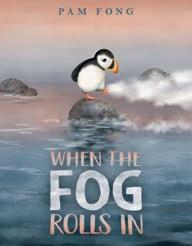
Author and artist Pam Fong's tale works on multiple levels, and the narrative about a young puffin lost in fog is evocatively drawn with simple and poetic text and gorgeous illustrations. The fog of the story reminds us that sometimes we all get a bit lost and feel on unfamiliar ground. But if we move on through the mist, pausing to look closely, we see more and can find our way to safer ground. A gentle introduction to wellbeing issues, this is a reassuring read with a happy ending, as puffin emerges into the light and rejoins his colony.
From 'how to' guides for young artists and 80 great inventions to an atlas of legendary places and two cute dog detectives, our pick of great spring reads
8+
by Volker Mehnert illustrated by Claudia Lieb
PRESTEL, £19.99
This is a large-scale book in more ways than one and designed to fire wanderlust. Lavishly produced by Prestel, it features 18 places that have captured our imaginations through time. These range from Stonehenge and Delphi to Namibia's Brandberg Mountain, Chile's Easter Island and Taishan in China. Each location is described through a combination of key facts and vivid descriptions. The book takes a flight of fancy by bookending with places way out of our realm – the lost city of Atlantis and the real but distant Milky Way.
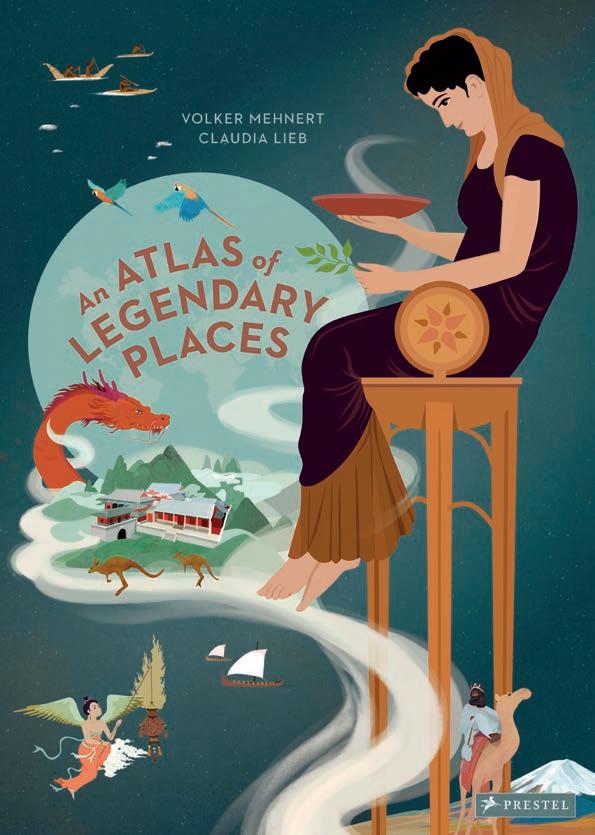

Brooks illustrated by Steve May HARPERCOLLINS CHILDREN'S BOOKS, £7.99
Hot on the heels of the wickedly funny Holly Hopkinson books comes Charlie Brooks' new series. Again, it has a central character inspired by real-life animals –this time it's Sammy, a sni er dog who loses her sense of smell. This does not deter our intrepid canine who, with her human best friend Beanie, goes on a hunt to locate her smelling power and foil a plot to steal a diamond. Fun and mishaps follow in equal measure in a book to delight animal-mad readers.
 by Jacob Sager Weinstein illustrated
by Jacob Sager Weinstein illustrated
by Eliza Wheeler KATHERINE TEGEN BOOKS, £12.99
Rosa is a little girl growing up in Nazioccupied Vienna. She is also the author's mother, who set sail for the US in 1939 – aged just four. Her family were granted a visa for three, which meant that they had to leave Rosa's beloved Grandma behind. While the picture-book format, with illustrations by Eliza Wheeler, tells the story through a child's eyes, there's no escaping the questions this will raise. The author's postscript includes snapshots of the real people – a moving story with resonance for our times.
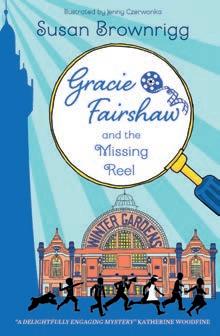
Mystery and history fans warm to intrepid reporter Gracie Fairshaw, who is always on the hunt for a good story and invariably solves a mystery. In the fourth of a series set in 1930s Lancashire, she's all set to interview Sally Sunshine, star of a new motion picture filming in Blackpool. But when a film reel goes missing and someone attacks the star, our journalist turns detective to solve the crime and get the scoop.
 by Ruth Millington
illustratedby Ellen Surrey NOSY CROW, £14.99
by Ruth Millington
illustratedby Ellen Surrey NOSY CROW, £14.99
Budding artists can flex their creative muscle with this 'how to' book by art historian Ruth Millington. Introducing children to artists' tools and spaces, it then runs through different techniques and practitioners, from early cave paintings to the approaches of Janet Sobel, Bridget Riley, Jean-Michel Basquiat and Yayoi Kusama. Each art profile includes a practical project – everything from mobiles and collages to drip painting and murals – all described with clear visual instructions. The 25 projects, are a great springboard to encourage visual awareness and self-expression.



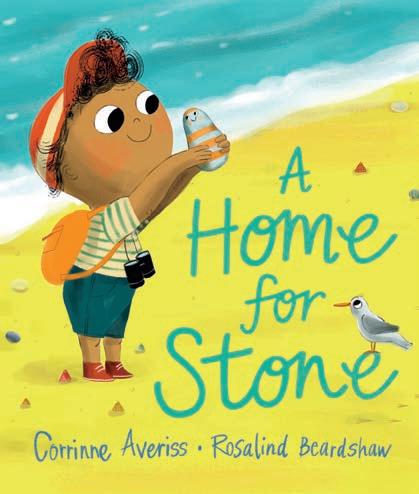
6+
The second in this fun illustrated series sees our three reporter friends at the Newshound on the scent of another mystery. When Eva, Simone and Ash go to the whippet racing at Millbrook Farm to help Eva's rescue sighthound Wafer make some canine friends they uncover cheating in the competition. Someone is putting the dogs in the races o and our girl sleuths are going to get to the bottom of the intrigue – with the assistance of smart four-legged sleuth Wafer, of course.

ORCHARD BOOKS, £12.99
When a small boy finds a solitary stone marooned on a sandy beach, he picks it up and becomes determined to find it a home. He tries a rock pool, a dry-stone wall and, finally, the garden rockery –but the stone is definitely not at home until he places it with the collection of treasures (coin, leaf, shell) next to his own bed. Rosalind Beardshaw's joyful illustrations bring boy and stone to life in a read-aloud book that will strike a chord both with parents and avid young collectors.

4+
Greenaway Award-winner Grahame Baker-Smith takes us on a journey through evolution in The Ever-Changing Earth. A small boy imagines the time when dinosaurs ruled the earth, the moment the asteroid struck and what came after – all still remembered in the earth's 'diary made of stone' and in the natural environments we enjoy now. Painterly illustrations tell a complex story vividly in a book to return to again and again.
8+

Fact finders and STEM fiends can head off on a journey to discover 80 inventions that reshaped our world. It's delightfully broad in sweep –beginning with Stone Age tools and ending with 3D printing. In between you'll find inventions that make parents feel like dinosaurs (games console, portable music player), while others will inspire interesting debates because of the seismic shi s they caused for global society – tea and chocolate, or plastic, for instance. Organised without a strict historical timeline, but a useful index, it's a dip-in resource designed to fuel further research.

4+
A new arrival from the team behind The Bear and Her Book, this is a charming tale about a tiny literary mouse called Quill. He lives in the library with his spider friend Leggsy and dreams of sharing his own stories with the children who visit. But he's such a tiny creature, who is going to hear his voice? Thankfully, with the help of the kind-hearted librarians and eagle-eyed cleaner, his dream finally comes true. Told in rhyme, it's a tale to remind small children that they have a voice and can imagine and share their own stories.

7+
The latest in this great Noodle Juice series helps young creatives take on a favourite art form – comics. Using eight big ideas, the step-by-step guide focuses on how to 'show not tell' through visual storytelling. Practical activities, tips and tricks take young artists through the fundamentals – from drawing faces and creating heroes to mastering perspective, tone and colour. There's expert advice on storyboarding, using speech and thought bubbles, plus those all-important sound e ects to create drama. Comic creators will find a useful set of extra practice panels at the back of the book.
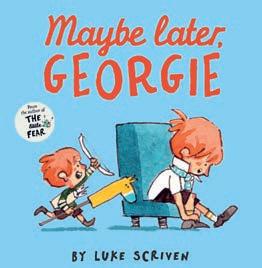
3+
The author and illustrator of The Little Fear has returned with a new tale about a boy who is desperate to get his big brother to play with him. Georgie is convinced there are goblins at the end of the garden, but Ed is just too busy with other stu , like his music. Finally, Georgie decides to go it alone – at which point his big brother rides to the rescue. A funny and heartwarming tale about family dynamics and never being too old for make-believe.
8+

When Billy's best friend Marty leaves town, he's le struggling to cope with loneliness, bullies and the worries of looking a er his Mum. She isn't like other parents due to what one neighbour calls "the doldrums". Then his Mum gives him a second-hand copy of Tom's Midnight Garden –and as Billy reads this classic, the previous owner James T. emerges. While it starts with notes in the margins, soon he becomes a physical presence only Billy can see. Tackling tough themes around mental health – and with a lead character everyone can warm to – this is a story about love, kindness and courage.

Where did you go to school and when?
I started at St Michael & St Martin Catholic Primary School in Hounslow from 1970-73, moving on to County Tipperary schools. I spent a year at Ardcroney National School, then the Christian Brothers Primary in Nenagh followed by Saint Joseph’s Christian Brothers Secondary in the same town.
What were your schools like?
Hounslow was great. The teachers were extremely kind. The few nuns wore miniskirts and there was an anti-bullying policy. At break time, I was the leader of a group of boys; I planned wholesome adventures which we carried out (crawling the length of a tunnel of rose bushes, climbing a tree and throwing snowballs). I felt safe and I was safe.
Then my dadgot a job back in Tipperary, where he was from. School in Ireland came as something of a shock. My first school had outdoor, long-drop toilets, which I never used, because I was afraid of falling through the hole in the plank. My teacher had no teaching qualification, and when I pointed out she had made a spelling mistake, thinking I was being helpful, she punished me. The kids had been brought up to hate
the British but had never actually met any – till I arrived, with my west London accent. My name didn’t help; my Irish parents had christened me Julian thinking it would help me fit in in London. So, every lunchtime and break, the other children would avenge 800 years of Sassenach oppression by methodically beating me up.

When my parents built our house, eleven miles away, I moved to the Christian Brothers in Nenagh. The headmaster, Brother Creevey, was a sadist who enjoyed beating children with a leather strap. Many years later, he was finally jailed for sexual o ences against boys. The vice principal was also later jailed, for similar o ences. The beatings in the playground continued. Teachers never intervened. On one memorable occasion, I was knocked to the ground and stabbed with a protractor. The kid fled, leaving me with a steel protractor sticking out of my buttock, like a flag on a hilltop. I pulled it out, cleaned o the blood, and kept it.
Did you love school, or hate it?
Hated it like you wouldn’t believe. But boy did it give me material! In each Rabbit & Bear book, I try to solve a problem that I couldn’t solve myself as a child. In a way, I’m going back in time and giving my child-self useful advice. My hope is that the books will help other children navigate the di culties of childhood better than I was able to. The feedback I get from parents tells me that it’s working; that their kid can now handle their emotions better, or
“IN EACH RABBIT & BEAR BOOK, I TRY TO SOLVE A PROBLEM THAT I COULDN’T SOLVE MYSELF WHEN I WAS A CHILD –IN A WAY, I’M GOING BACK IN TIME”
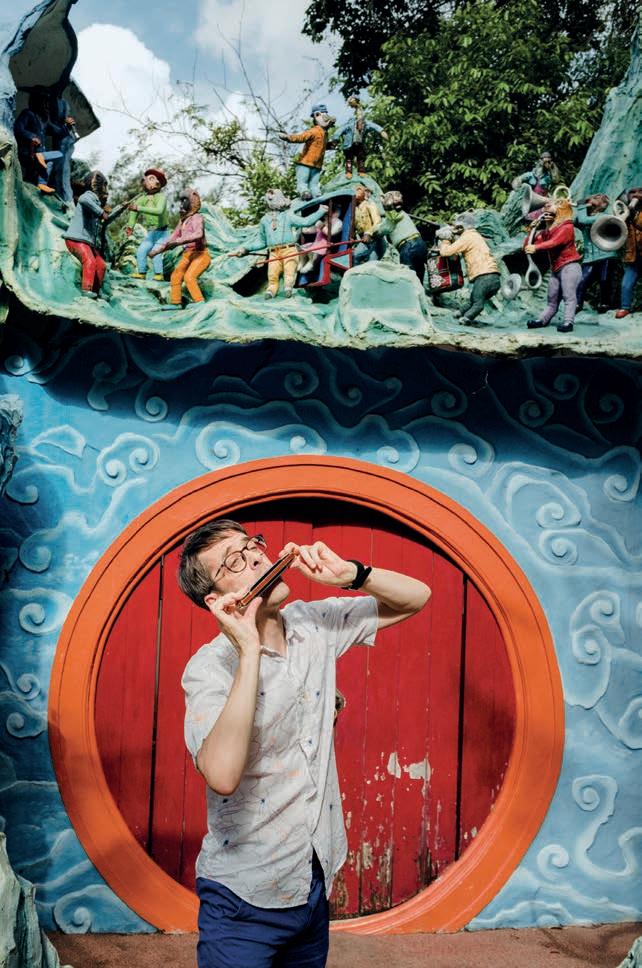
trouble in school better. That might be the achievement I am proudest of.
What were your favourite subjects?
I didn’t have favourite subjects. All subjects were ruinable, with a little e ort from a motivated teacher. For example, I loved reading, I loved writing, I loved science fiction… so I once wrote a time travel short story in English class, as a homework assignment. (We had been asked to write about the future.) The teacher didn’t understand the title, so he refused to read the story and gave it zero out of ten.
Who were your most memorable teachers and how did they influence you?
There were two or three good teachers, a few mediocre teachers, and several
genuinely malign ones who should not have been let near kids. The best was Tim Brophy, who taught me physics and higher-level maths. He was a terrific teacher, extremely kind and utterly fair, with total control over his class. We respected him because he respected us. He never hit anyone. Never even had to raise his voice. He loaned me his own science fiction books and enjoyed having speculative conversations about physics.
I still remember my disappointment at learning that my idea for how to transmit information faster than the speed of light (by pushing and pulling a rigid metal pole a light year long, to send a kind of Morse Code), wouldn’t work, because no material is rigid enough. As he explained, the compression wave when you push the pole
can never travel that fast, and so the other end won’t move for years.
Where was your favourite place at school and what did you do there?
There was a ‘computer room’, which was just a classroom that had two computers at the back. Instead of going to sport, which I hated, I would head straight to the computer room, shut the door, and write my own extremely primitive computer games in BASIC. I had taught myself this at home, on a ZX81 (with 1 kilobyte of memory). If a teacher looked in, I would act as though I had permission to be there. I wouldn’t say that I had permission – one of my big rules was, never lie, because I felt the whole society was built on lies and I didn’t want to be part of that. Pretty soon everyone assumed I had permission. I never did sport again. Bliss.
What beliefs did your time at school give you?
That an entire society can be wrong. I was extremely popular in London and extremely unpopular in Ireland, and I hadn’t changed so one society was wrong, and it didn’t matter which one. That insight has been remarkably useful.
What was your proudest school moment?
I was forced to go to a hurling match, to support the school. I didn’t want to go, but I was hit with a hurly (hurling stick) and made to go. When we got to the game, I got o the bus, climbed the 15-foot concrete pillar of the main gate, and sat at the top with my back to the pitch reading my book. Some of the kids from my school threw stones at me; I protected my face from the stones with the book and kept reading. Eventually the teachers from the other school intervened (which forced my embarrassed teachers to also intervene) and I was left alone for the rest of the match. I thoroughly enjoyed the whole experience, and I never had to attend another game.
What was the most trouble you ever got into at school?
My friends and I decided to produce a school magazine – the school had never had one before – and I was editor. We managed to produce one edition, while the headmaster was on holiday. Then he came back, read it, and banned it. He objected to three articles: I had written all of them. In another incident, my first band managed to get permission to practice in the school. After our first gig, the headmaster banned us from ever practising there again – he objected to the lyrics. But I was essentially in trouble all the time.

What is your most vivid memory, looking back?
Too many to mention. Here’s one, that sums up the general dysfunction. We had a teacher who was so incompetent, and as a result disrespected, that kids would laugh at him even as he hit them with an iron bar. One day, a boy set another boy’s hair on fire. A group of kids beat out the fire, then wouldn’t stop slapping the boy’s head. Everyone else was by now running around the room screaming, for the fun of it. The teacher threatened to go and get his metal bar (kept in the sta room) if we didn’t return to our seats. We got louder and ran faster. He pulled open the door to run and get his weapon, and our elderly headmaster toppled into the classroom – he had clearly been listening at the keyhole. That teacher, by the way, later ran away from school. He just didn’t turn up one morning and was never seen again.
When and how did your love of words and music begin?
I didn’t bother learning to read in London, because I was happy, and we had television. But in rural Ireland we didn’t have any TV reception for months – just snow on the screen – so I taught myself to read. And then, when school turned out to be a catastrophe, books became a place I could hide.
I loved science fiction because it took me the furthest away: I didn’t want to be on Earth. PG Wodehouse o ered another kind of escapism, to a sunny, comedic world. I would read books in class, while eating dinner, walking down the street, crossing the road… And as soon as I started reading books, I started writing books (or trying to). I loved the strange magic of literature, and wanted to work out how it was done.
As for music… I saw David Bowie’s video for ‘Ashes to Ashes’ on Top of the Pops and I was transfixed. I wanted to live there, wherever he was. Do whatever he was doing. If that was a job, I wanted it. I wrote the lyrics to five songs the next day, in the front row of Irish class, while the teacher was distracted trying to deal with other kids rioting at the back.
What other key influences/passions shaped you growing up?
It was mostly just books and music. I first attempted to write a novel at 15, and I put together my first band at 16, and that was where my energy went for the next decade. My second band, Toasted Heretic, released four albums, had a top ten hit. Great way to spend your late teens and early twenties.
What projects are coming up next?
I’m writing a book called The Egg
and the Rock. It explores the theory of cosmological natural selection – the idea that our universe is the result of a Darwinian evolutionary process, which has fine-tuned the basic parameters of matter so as to produce this complex, self-complexifying and reproductively successful universe.
It’s an unfairly neglected theory that radically changes how we understand the universe, and our place in it – and (which is terrific for my book) the James Webb Space Telescope keeps coming up with new evidence that it is likely to be true.
I’m writing the book online, in public, both to get feedback and to build an audience. Subscribe on the website and I’ll send you the chapters as I write them. I’m completely obsessed with this project. I think, if I get it right, it can jolt us free of our current cramped, limited view of our universe.
How would you sum up your school days in three words?
Pile. Of. Sh**e.
Rabbit & Bear: This Lake is Fake! by Julian Gough, illustrated by Jim Field, is out now (Hachette Children’s Group, £10.99). To subscribe to The Egg and The Rock, visit theeggandtherock.com
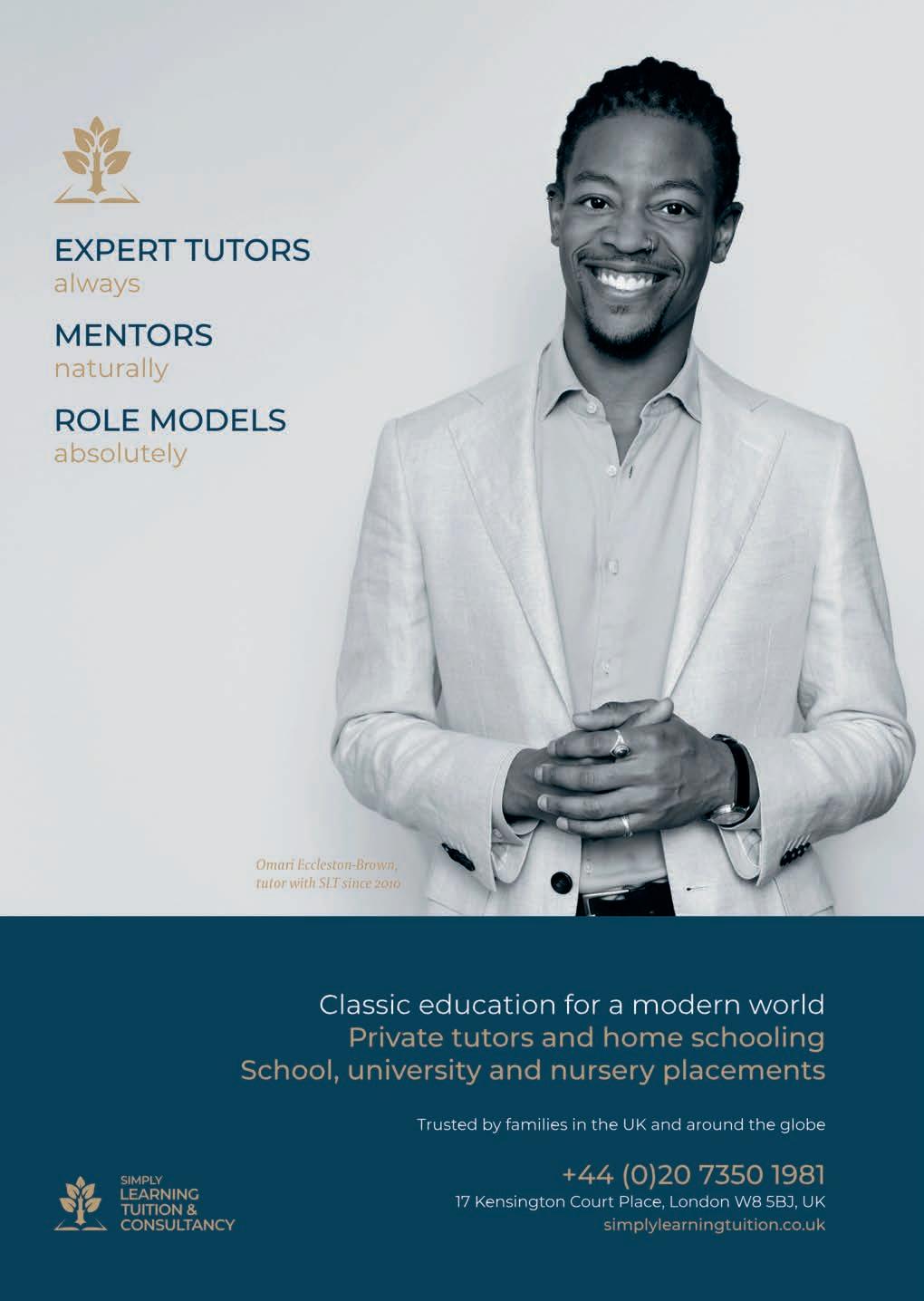

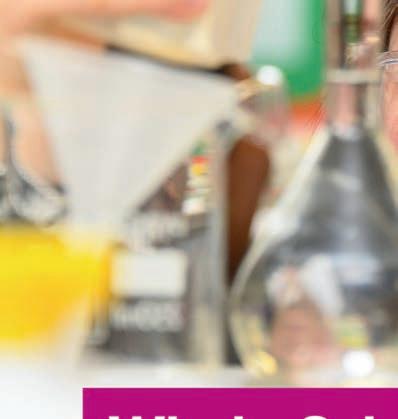


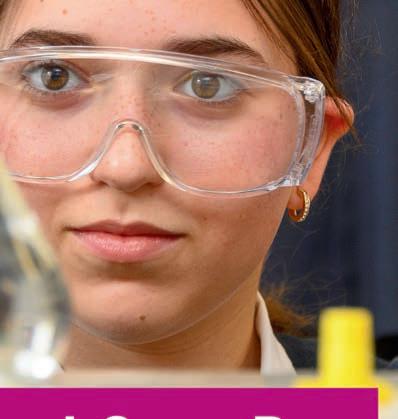












A twin-centre break on two iconic Maldives resorts more than doubles the pleasure, as Libby Norman discovers




Maldives resorts are bywords for barefoot luxury, so the opportunity to visit two iconic resorts in one trip is too good to miss. First stop is Conrad Maldives Rangali Island, which arguably defined the Maldives experience. It has notched up numerous firsts, including first overwater villas on stilts and first underwater restaurant. Most recent is a private residence built over and under the ocean. It also bagged a prime spot in a country of abundant nature – swimming and snorkelling are a delight from its twin natural islands.
Impressive, but it doesn’t prepare us for how welcoming Rangali Island feels. There are many repeat visitors (warm hugs and catch-ups between guests and sta ), and we feel among friends. We’re on adultsonly Rangali Island, connected to livelier, larger (and child-welcoming) Rangali Finolhu Island by a wooden bridge. We have the pick of restaurants and bars on both sides. Also, we get to dawdle back after dark marine life spotting – even rays make regular appearances to gambol in the water lit up by the bridge lights.
Our Sunset Water Villa with Pool is bliss, and with a view to thrill – a sightand-sound oceanside immersion. We love the shifting panorama from our giant bed, bathtub, large deck and personal pool. From here, it’s a few steps down to the sea below – so private it feels like our personal pool, only bigger. But we are not alone. On my fi rst dip, I spot a crab watching from poolside. He and his tiny gang hang out on our steps to catch a breath, diving back in whenever they spot feet coming.
Shoals of fi sh race past, seemingly on the clock, and sitting on the beach or swimming in the infi nity pool near The Quiet Zone beach bar becomes a nature watch. We spot resident flying foxes at dusk, graceful and silent. Then there’s George the heron, an island legend, who I mistake for a beach sculpture until he turns up at Vilu Restaurant, our favourite breakfast spot, standing silently by like some watchful avian maître-d.
There’s a busier breakfast vibe and huge choice at Atoll Market over the bridge, which also o ers delicious a la carte and themed dinner options. Rangali Bar is our spot for leisurely lunches. We enjoy a dinner of exceptional quality at Mandhoo Spa Restaurant – designed to detox, and still leaving us feeling pleasantly plump.
Other high points include a sunset cruise accompanied by pods of playing
ABOVE
Waldorf
Astoria Maldives Ithaafushi

“Sixteen feet down is a glass-walled suite where you are lulled to sleep by dazzling marine life”
dolphins, and champagne and canapés five metres below at Ithaa, where sharks and rainbow-hued fish circle lazily.
We discover that Rangali Island’s new first – The Muraka – is a level beyond on a special tour. Upstairs, this private residence has magnificent sleeping and entertaining spaces (with butler thrown in), while 16 feet down is another glasswalled suite where you are lulled to sleep by dazzling marine life. You can even take the lift to your underwater quarters – it feels very James Bond.
And so do we when we are whisked by seaplane back to Malé and straight on to a private yacht (55-foot Princess, no less) for the short transfer to our second Maldives experience – Waldorf Astoria Maldives Ithaafushi. My partner is wildly excited by the boat (desperate to drive it), while I play it cool, drinking in champagne, ocean views and beautifully smooth ride.
Opened in summer 2019, Waldorf Astoria Maldives Ithaafushi has quickly garnered a host of prestigious travel awards, and high-profile visitors, and
we can see why. Not only is the setting on private linked islands lush, but the dining and accommodation choices stand out for breadth – and high glamour. There’s even a totally separate private island for exclusive use by up to 24 guests.
Our King Overwater Villa is palatial, with lofty ceiling and double-height doors that can be closed to divide living and sleeping spaces. There’s a cool glassfloored dressing room and a glamorous bathroom with ocean vista. The private pool is big enough for a party, with multiple lounge spots – plus steps down to your own slice of ocean.
Bikes are laid on; buggies are a phone call away and personal concierges organise dining and entertainment. We love the relaxed beach-club vibe at Nava, a hub during the day. There’s plenty to keep active types busy, with tennis and other court sports, exercise classes, kids’ club (plus one for teens). There’s a fabulous lagoon-style pool for families – we gravitate to the tranquil adult pool for lazy laps and snoozing o lunch.
Food is definitely the thing, with roundthe-world dining options and star chefs. We can’t squeeze everything in, but we give it our best shot, grazing at Tasting Table at breakfast, lunching like kings at Peacock Alley and drinking in the afterdark ambiance at Glow. Our standout evening happens at The Ledge by Dave Pynt (of Singapore’s Burnt Ends fame). The Aussie barbecue-inspired flavours are smoky and complex – the reputation well deserved. Our rum and tasting menu pairs fine Flor de Cana vintages with tuna and caviar, lamb ‘cigars’, buttery lobster and the most heavenly rum baba.
If The Ledge is an out-of-this-world indulgence, so too our session at Waldorf Astoria’s Aqua Wellness Centre. We’re not usually spa goers (although the main spa here is fabulous), but here’s a unique twist. We are guided around a special pool, each zone containing a water jet that targets a tension point. Starting with feet and ankles and ending with neck and head massage, it’s a dreamy hour that leaves us both restored and relaxed. So relaxed, in fact, this feels like the perfect finale to one hedonistic week at two iconic Maldives destinations.
* Conrad Maldives Rangali Island; conradmaldives.com
Waldorf Astoria Maldives Ithaafushi; waldorfastoriamaldives.com






Life is sweet at Club Med’s Sicily outpost in Cefalù
PENDLE HARTE
Some people are a bit sni y about all-inclusive holidays.
To those people I say two words: Club Med. Nobody who has ever been to Club Med would have any doubts about the sheer joy of its all-inclusive philosophy, and once you’ve experienced one you’re very likely to return. Those who know, know that a true holiday consists of a real break from all domestic responsibilities and almost all decision making. Other factors include never having to queue, never experiencing the slightest annoyance and definitely never having to carry any cash.
From the start, we’re well looked-after. Club Med’s Sicily outpost is in Cefalù, on the north western coast. We land at Palermo in the evening and are swept o in a taxi, arriving too late for dinner. Or so we thought. Our two rooms – well, not rooms, they’re self-contained small houses, cleverly and discreetly cut into the rock, all of them precisely angled for perfect sea views – are waiting for us with dinner laid out, plus a bottle of Prosecco and even pudding. It’s very Club Med to anticipate your needs so precisely, and that’s exactly how our week continues.

Cefalù is one of Club Med’s more luxurious resorts. While it’s great for families, it doesn’t cater to children under the age of eight – and because of its extra exclusivity there are more adults travelling without children than we’ve seen at other Club Meds. It’s a beautiful spot, a sprawling resort set in cli s along the coast with views over the bay to Cefalù and the Rocca, the impressive limestone cli that dominates the town. There has been a resort on this site since the 1950s, when Village Magique consisted of much simpler wooden huts, and the new incarnation is just a few years old and feels fresh and contemporary. There’s a vast pool, but the best swimming is in the sea, where loungers are stylishly laid out on platforms set into the rocks and there are floating pontoons to swim to and dive from.
Our days settle into a routine punctuated by visits to the watersports centre, which has a dreamy location in a small creek below the resort. Here there are lots of things on o er, including paddleboarding – regular style and the step pedal kind – plus kayaks and sailing


“If you decide you want a kayak right now, there’ll be one waiting for you”
dinghies, which require an introductory lesson and despite our bad luck with the wind (there is none most days) we manage to learn a few sailing skills. Between us we experiment with several activities, all of them easy to find on the Club Med app, including yoga, archery and circuit training (I manage one class). Luxury here involves never having to book ahead or worry that there won’t be a space. If you decide you want a kayak right now, there’ll be one waiting for you. Everything is seamless and ready at all times.
I had hoped to visit Etna, and we could have taken an excursion – but it’s not exactly close. “Would it mean missing lunch?” asked daughter number two. It certainly would, and that was the end of that. Because meal times are a huge highlight at Club Med, and at Cefalù especially. Breakfast includes everything you could imagine, and we learn to hold back a bit because unless you’re very early, there’s not all that much time before lunch. So it’s mostly fruit, yoghurt and pistachios for me, but the teenagers are all over wa es with pistachio paste, miniature cakes and chocolate pastries. Lunch happens either at the main restaurant as a bu et – a breathtaking one
with an extensive salad bar plus lots of pasta, fish and meat, plus daily pizzas and more – or (and this is our favourite) at the smaller beach restaurant, where chefs prepare simple dishes of grilled fish and vegetables in an impossibly dreamy shady spot. Dinner is back at the main restaurant, after pre-dinner drinks and snacks by the pool. In fact there are snacks by the pool seemingly at all times – one one memorable occasion it’s a tomato festival. Tomatoes are a highlight of every meal, in fact, as are pistachios, a Sicilian speciality and we will never forget the dessert pizzas with sweet, bright green pistachio paste.
We’re also well entertained with a programme that includes live bands, dance performances, a light show and more, all thanks to the classic Club Med team of GOs, who have many skills: the afternoon sailing instructor is a dancer in the evening. On the last night there’s a prizegiving ceremony, where everyone proudly collects medals for outstanding achievements in yoga, archery and sailing. We’re fully committed Club Med people now, so where to next? clubmed.co.uk


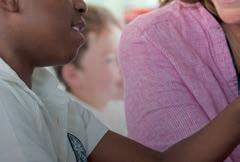


























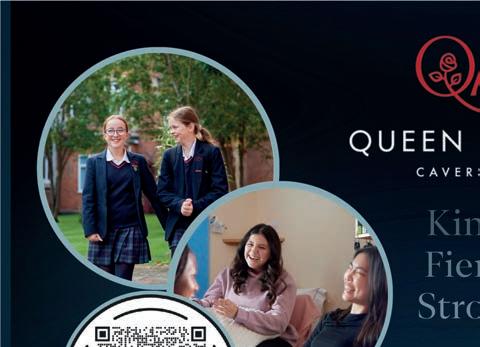



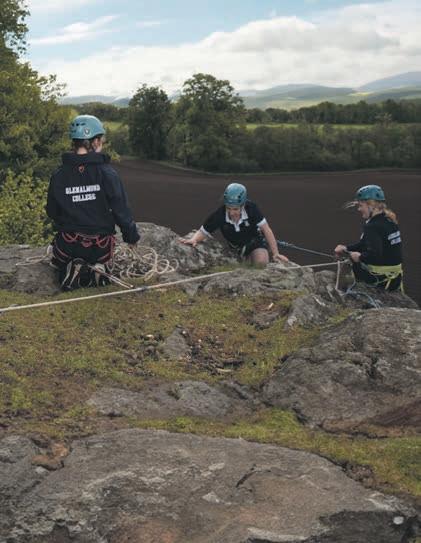


Westminster Abbey Choristerships: An education like no other

Prep School Open Morning
Thursday 13th June
Senior School Open Mornings
Wednesday 19th April
Wednesday 19th June
To book 4+ and 11+ open events, please scan here:





Do you know a boy who loves singing?
All enquiries welcome at any time. Find out more about our unique Choir School at abbeychoirschool.org
Senior School Open Morning
Wednesday 1st May
To book 11+ open events, please scan here:



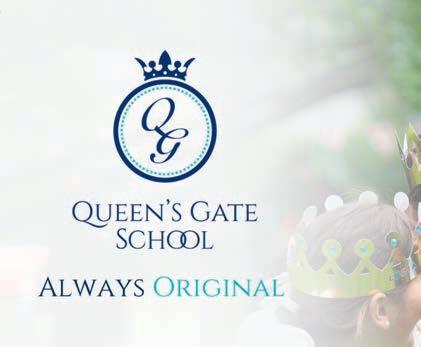
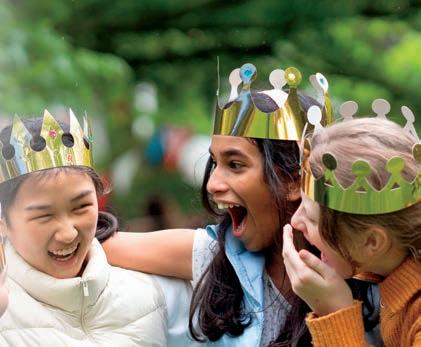

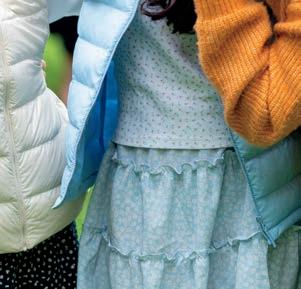









“I knew it was right for him when we

school. Something just felt right, like he belonged there.”


EXPLORECHEAM - OPENMORNINGS
Saturday18May | 10.00am-12.30pm
Friday11October | 9.45amto12.00pm PleaseregisterforanOpenMorningorindividualtourviaourwebsite.


BUSROUTES|LONDON, BERKSHIRE&HAMPSHIRE

3-13|Co-Educational|Day,FlexiandWeeklyBoarding Headley|Berkshire






@CHEAMSCHOOL
WWW.CHEAMSCHOOL.CO.UK





An Independent Prep School for girls aged 4-11 years old in Potters Bar, Hertfordshire
Stormont School prides itself in educating girls in a dynamic environment, providing a solid foundation in all academic subjects alongside a wide variety of enrichment activities to enhance the school life for all girls.

Open Mornings
25th April 9.00am -11.00am
28th September 9.00am -10.30am
Come and visit us to discover more!
admissions@stormontschool.org www.stormontschool.org









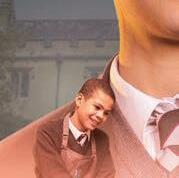















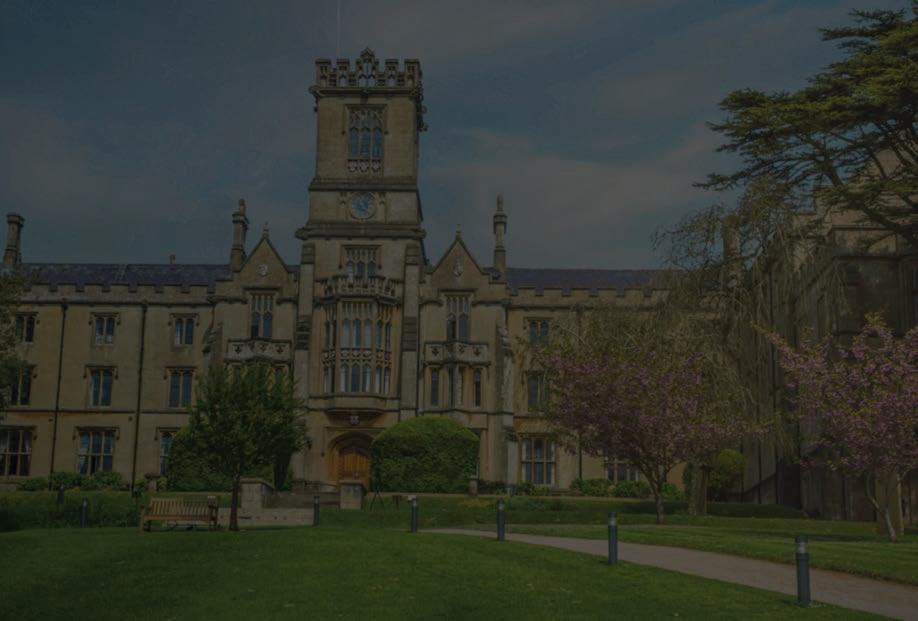


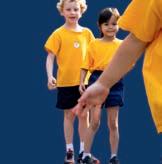










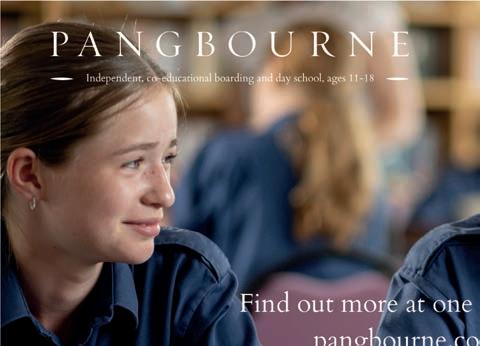


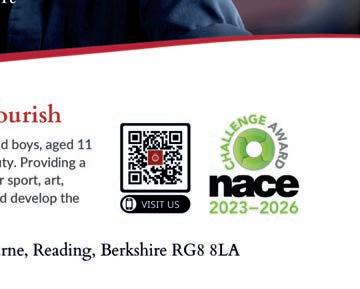
In
Day
As one of the UK’s leading boarding and day schools, we are looking for bright boys from whatever life background. Come and see how we forge the connection between the intellectual and the human.



seconds with 60
What is your background?
I came to Bickley Park in September 2023 from Newton Prep in Battersea, where I was Deputy Head Upper School. Previously, I taught at Dulwich College for over 12 years, where I took on a leadership responsibility as the Director of Junior Co-Curriculum. I then moved into Senior Leadership roles at Thomas’s Clapham and Newton Prep, where my main focus was on curriculum development and how to best prepare children for 21st-century challenges. In fact, my relationship with Bickley Park began many years ago from my time teaching at Dulwich College, when I would regularly bring sports teams over to compete before heading into the dining room for a traditional post-match tea.
What excites you most about your role at Bickley Park School?
It is a forward-thinking, adaptive school, well primed and ambitious for the future. The strong family ethos is so important here and our nurturing environment ensures that our children are in the best position to thrive. The broad and balanced curriculum, delivered through our Four Quadrants of Learning – which encompasses Academics, Sport, Community and the Arts – has so much scope for each child to discover their skills and talents. This excites me every day.
What is your academic philosophy?
A great prep school identifies and celebrates the strengths of every child, no matter where they lie. It should o er a broad and balanced curriculum, giving everyone the opportunity to shine.
Can you tell us about a pivotal moment in your career?
It was at the age of 15, when I knew I was going to become a teacher. I have such fond memories of many teachers, and the opportunity to emulate some of them, in the hope of having a similarly positive impact on others, became a clear career choice for me.

What is Bickley Park’s approach and what sets it apart?
The modern-day prep school must consider how best to prepare children for a rapidly changing world while retaining established yet relevant core values. Here at Bickley Park, this has been our focus for some time. In fact, it has long been our aim to ensure our leavers are confident and articulate, ready to take their place in a complex and interconnected world.
We have a long history of excellent exam results at both 11+ and 13+, but we are determined that our ‘preparation’ goes
well beyond that. By providing a curriculum that embraces innovation, we prepare our leavers for whatever future challenges they face. We prepare them for life.
What makes a great student?
A great student is someone who is reflective and curious in their approach, someone who is willing to make mistakes and embraces them as a key part of their development. That is true of any student, no matter how old they are. I recently jumped at the opportunity to ‘go back to school’ myself and thoroughly enjoyed being a student again to pass my NPQH (Headship) qualification.
What makes a great school?
Said simply: ‘Happy Children Flourish’, so a great school environment must be one that puts the children’s happiness first. The key elements to this are, I believe, a warm and caring sta , excellent facilities and a broad and balanced curriculum that allows every child to shine. When I applied for the headship here, that was one of the things that struck me most about the school. From the moment you walk through the door, it is clear just what a happy place this is. As a prospective parent, as well an aspiring Head, that was one of the key reasons I applied for the job. I knew this was somewhere both my children would be happy – and I am delighted to say I was right.
“The strong family ethos is so important here and our nurturing environment ensures that our children are in the best position to thrive”
99
Day and boarding for children aged 3-18 of our pupils go on to their preferred destinations.
admissions@loretto.com
+44 (0)131 653 4455

Loretto is set in 85 acres of safe, leafy campus just outside Edinburgh, with an emphasis on the development of the whole person, mind, body and spirit.

When it comes to a good education, one size does not necessarily t all. At MPW, one of the UK’s best-known names in fth and sixth-form education, we have been offering a distinctive alternative to traditional schools for 50 years.
A levels and GCSEs in over 40 subjects, plus retakes and Year 12 transfers
Personal tutors providing individual academic and pastoral support
Oxbridge-style tutorial groups with nine students or fewer
Excellent results and progression to top tier universities
Best in class inspection reports from the ISI and Ofsted

Students make rapid progress from their various starting points in small-sized classes, due to highly e ective specialist teaching and closely focused pastoral support.
MPW London Independent Schools Inspectorate Report February 2022